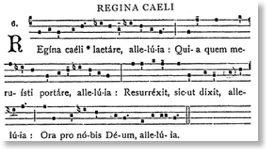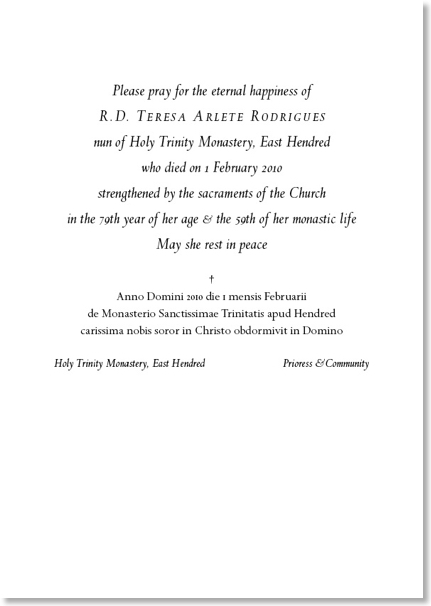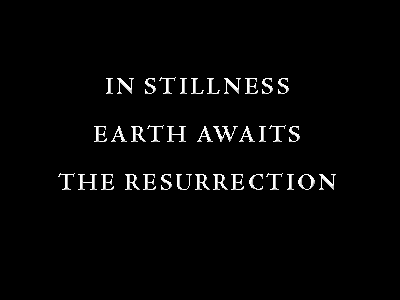Howton Grove Priory | Mobile WebsiteSharing a Vocation with the World . . .
Goodbye Colophon, Hello iBenedictines
It is difficult to devote time to one's own site when clients are clamouring for attention to theirs; so the makeover has taken much longer than we had hoped. From tomorrow, however, there will be a new blog on the block: iBenedictines, which you will find at www.ibenedictines.org. (British users may find themselves adding a .uk to the domain name, but don't worry, that will get you there as well.)
Colophon won't die because we've come to feel an affection for this unruly child of our monastic brainpans. It has been incorporated as an archive into the revamped web site which, D. V., we shall be launching at the week-end. It will take a while to check that all the interior links to images and audio files are working as they should, but the permalinks and structure will be unchanged, so anything you've bookmarked should still be "findable". That's the theory, anyway.
iBenedictines will also be available on this site as well as at its standalone address.
This is not the recommended way to relaunch a web site but the sealing wax and string approach does have its advantages, though you might find it difficult to convince Digitalnun of that at the moment. If a thing is worth doing, it's worth doing as one can, not as one can't. And if that sounds remarkably like Dom John Chapman's advice on prayer, the coincidence is entirely intentional.
The Silence of Snow
At Vespers this evening we shall sing the first of those haunting Advent chants, full of Israel's longing for the coming of the Messiah. Then we shall enter into the special silence of this season: the silence of waiting while the mystery gradually unfolds, like a winter rose on Jesse's ancient stem.
Pity the Pope
Advent is Coming
This week's podcast is longer than usual because we decided to record Saturday's talk to the CWL on the five "S"s of the spiritual life: solitude, silence, simplicity, service and serenity. It is a live recording so lacks the polish that we would like to give it, but you can listen here.
Finally, we hope to finish archiving our existing blog, Colophon, by the end of this week (it will still be available as it contains nearly 800 entries). Any suggestions for names for its successor? It may not appear at the end of the web site, so Colophon may not be so appropriate. Over to you!
The Ordinariate Again
£250,000 to fund the Ordinariate was the first surprise: that seems very little indeed, scarcely enough to do more than pay for a small office and its telephone bills. Perhaps the bishops are not expecting many to take the Ordinariate route. That would seem to be the case. Then the timetable for ordination seems amazingly short: former Anglican bishops to be ordained to the Catholic priesthood by Easter, other Anglican clergy around Pentecost. The idea presumably being that ordination will precede further study and formation. So much for long and mature discernment! I can't help wondering whether it will allow Anglicans wishing to join the Catholic Church through the medium of the Ordinariate enough time to discover what the Church is like from the inside, and what they would be taking on by ordination. Finally, Archbishop Vincent has made it perfectly plain that the Catholic Church in this country is not expecting any buildings to accompany migrating clergy and parishioners. I never thought there would be, but it is good to have it properly acknowledged.
All in all, enough to make Digitalnun wrap a wet towel round her head while she gets down to the business of prayer because, joking apart, these are serious matters affecting the life and happiness of many. When the Bishops' Conference issues statements one doesn't quite understand, it is always wise to go straight to the top. God, after all, is in charge -- no matter how much we, his servants, think we are.
Mediterranean Diet
There is, of course, another and much darker side to the "Mediterranean diet" which has nothing to do with food or drink. Europe must be one of the most fought-over areas on earth. At the end of the twentieth century we were reminded how easily our veneer of civilisation is stripped away. Now our economic difficulties look as though they may break the fragile unity we have attained within the E.U. While we pray for the urgent needs of the world, for the people of Haiti and Afghanistan, wherever a natural or man-made disaster has jeopardised life and happiness, we need to pray perseveringly for something much closer to home: the preservation of peace and harmony within Europe itself. Our recent Remembrance Day services should have reminded us that the shadow of war is never very far away because we remain selfish and sinful. It takes more than a diet of fish and fruit to change that. It takes conversion of heart.
All Saints O.S.B. 2010
Here at Hendred this is also Oblate Day when we invite our oblates and associates throughout the world to renew their oblate promises. A few will be with us as welcome David to begin his oblate novitiate. As he can't be with us in person, we shall be admitting him via cyberlink; but we have warned him that doesn't mean he'll be let off the 'few choice words" from the prioress!
It has been a challenging week for all people of faith. The spread of cholera in Haiti, the murder of Christians in Iraq and elsewhere, the turbulence experienced by some of our Anglican friends, none of these can be dismissed with an easy "God is in his heaven and all's well with the world". As always, our response must always be one of prayer and action. Prayer, because without prayer we are in danger of getting things wrong, of assuming that we know what needs to be done and how, of presuming upon God; action, because a failure to translate good intentions into deeds is a sin of omission of the cruellest kind. Nothing new in any of that, but as Dr Johnson was wont to remark, we need to be reminded more often than we need to be told.
Veilaudio Update
Our first audio books on CD are now in production: Newman's "Apologia" and last year's Trinity lectures on historical subjects. It looks as though we shall have to avoid mp3 downloads for the time being because of the copyright complications. In the meantime, we'd like to record the fact that no British publisher has ever refused a request to let us turn a book into audio for the blind and visually impaired, and none has asked a fee. (May be tempting fate, saying that.) It's one of those quiet, anonymous ways in which people are generous and supportive of others. Good to remember that in these straitened times.
Bonfires
Why do bonfires capture the imagination so? Is it simply because they remind us, in a very controlled way, of the uncontrollable forces at work both in nature and ourselves? If so, Bonfire Night is as good a night as any for a little self-scrutiny (but don't let that spoil your enjoyment of the sausages and sparklers!)
Religious Hatred
I am not sure what one does when faced with hatred of this kind. I hope the Muslim community in this country will not merely condemn the ISI but work to eliminate the underlying attitudes which allow extremist organizations to flourish. It will be argued that Islam sees Christians as infidels, and that it is a holy duty to exterminate them (i.e. us), although an appreciation of tolerance means that no one would ever think of doing so. Unfortunately, western military action in Iraq and Afghanistan is identified with Christianity and there seems no end to the trouble and distress it has caused.
Sow the wind and you will reap the whirlwind. We are beginning to learn that lesson, are we not? Let us pray for all.
Blundering
Our culture is success-orientated. We even judge the 'success' or otherwise of our family or community lives by standards that have nothing whatever to do with family or community. One of the consequences of setting aside time for prayer on a regular basis is that we are continually being recalled to reality. We have to face ourselves as we are. We are not great successes, but we are not junk, either. Our mistakes are many, but we blunder on, trusting in the mercy of God to put right what we have got wrong. Most of us will probably blunder our way into heaven, and what's wrong with that?.
Prayer for the Dead
Let's start with the living. I know perfectly well that, despite all my efforts (and the efforts of my brethren), I am a sinner through and through. Like St Paul, I often find myself doing the exact opposite of what I want and intend to do. When I come to die, I know that there will be sin on my conscience: sins I have not acknowledged perhaps, sins I have tried to pretend don't really matter. In that situation I shall be personally helpless, but I shall not be without help. I know, with absolute certainty, that my brethren will pray for me perseveringly, that my sins may be forgiven and I may be prepared for the Vision of God.
This state of purification, when the living pray for the forgiveness of the dead, is known as purgatory. It is often downplayed today by those who would like to believe that we pass immediately from our sinful life on earth to absolute bliss. Attend any funeral, and you will hear, even in Catholic churches, very little that conforms to what the words of the requiem actually say. I think that is hard on the dead: it is the living seeking comfort for themselves rather than thinking about the needs of those who have died.
Today we have a sustained Office of the Dead. We pray with hope and trust, not in a gloomy or despondent way, for all the faithful departed: the Catholics murdered in Baghdad on Sunday; the old man who died alone and wasn't discovered until several weeks after death; members of our families and friends; those killed in car accidents; those killed in Afghanistan; all whom death has surprised or taken to herself. We pray that they may be freed from their sins and welcomed into paradise.
Eternal rest give unto them, O Lord, and let perpetual light shine upon them. May they rest in peace. Amen.
Terror
So, what are we to make of it all? It may seem a bit feeble, the worst kind of milksop Christianity, but I do believe that good ultimately triumphs, that life ultimately wins over death. As an Englishwoman and a Catholic, I can only say, "Pray for a good death -- and get a grip!"
Feast of Encouragement
One of the things the recent flood (O.K. six) of applications to join the community has taught us is that people are searching for communion and community with an urgency we have not seen for a while. Perhaps today we could each spend a few minutes thinking about how we build up community in our own situation and circumstances. Paradoxically, in a monastery, where we are bound together by the deepest of all bonds, our union in Christ, our celebration of the sacraments and our sharing of the gospel, we know we really have to work at maintaining unity. It is a gift, but one for which we have to prepare the way; and there is no other way except the way of renunciation, the way marked out for us by Jesus Christ himself.
(Podcast on All Saints 2010 now posted.)
Concert Afterglow
We're not sure how much money was raised in total as pledges and so on have still to be calculated, but we covered our costs and made a significant contribution to Veilaudio's most pressing equipment needs. Sadly, we are still awaiting video clips of the evening, but here is an atmospheric view of the Exmoor Singers, glimpsed over the heads of the listeners, and an amateur recording of Allegri's Miserere, recorded live (and not from the best position). Please respect the choir's copyright and do not download but simply enjoy here on our web site. You can learn more about the Exmoor Singers themselves here.

Alternative content
Our best thanks to Oblate Alexander, who worked tirelessly to bring the concert about; to all our Friends who worked in the background as ticket managers, wine pourers, washers up and so on and so forth; to Canon Cronin and his cathedral staff, who generously made the cathedral available to us; to Archbishop Peter Smith who was very gracious and encouraging; to Lord Nicholas Windsor, patron of the Veilaudio Appeal, who would have been with us but was prevented from flying in by French air traffic problems; and to all who gave up an evening to come and listen.
Tonight's the Night
A Fundraiser Concert at St George's R.C. Cathedral, Southwark

Thursday, 28 October 2010, at 7.30 p.m.
Tickets £15 at the door, to include a glass of wine
This is in aid of our work for the blind and visually impaired, Veilaudio, which makes and distributes audio books of a predominantly religious/spiritual nature. It's a free-to-users service and we want to keep it that way.If you can't be with us in person, please pray for the concert's success. It's being organized by a Friend of the Monastery. You can learn more about the Friends here. Perhaps you might be encouraged to sign up as a Friend yourself?
Digitalnun is still full of snuffles so will have to go for the "sympathy vote" rather than convincing everyone of the nuns' dynamism and vision (sigh).
Memory and the Church
In our celebration of the liturgy we often refer to liturgical anamnesis, the sacred remembrance of events in God's dealings with us, his people. So often the events seem distant in time or have been almost argued out of existence by scripture scholars and historians, but they are what give us our spiritual identity, our sense of belonging. Our liturgical remembrance is always biblical in origin and closely linked to our understanding of Tradition. Jean-Marie Tillyard expressed this very succinctly when he wrote:
(Church of Churches: the Ecclesiology of Communion, 1992)Memory in the biblical sense of the term is not simply storage of the sediment of the past. It is also the humus from which life never stops borrowing. As the memory of the Church, Tradition represents the permanence of a Word which is always alive, always enriched, and yet radically the same, where the Church never ceases to nourish its faith.
It is worth thinking about the memory of the Church in these terms.
Cardinal Manning Society
Manning was not an easy man, and I certainly don't agree with all his opinions, but I am deeply impressed by the person he was and what he achieved. When he died in 1892, his funeral was the biggest ever seen in London: the poor crowded the streets. They did not forget all he had done for the dockers and other London poor. His theology has been under a shadow for many years, but now that most of his work is in the public realm, including a host of private letters to Gladstone and Wilberforce, we are better able to judge what he did. A new Cardinal Manning Society with web site has been set up to make Manning better known. Why not take a look? Newman is not diminished because we see Manning in a more just light. Cardinal Manning Society and Web Site
Four Days To Go
The event is being organized by a Friend of Holy Trinity Monastery who is probably becoming white-haired as he discovers yet another layer of complexity involved in concert management. Please come if you can: the object is to raise funds for Veilaudio, our free audio book production and lending service for the visually impaired.
Meanwhile, back at the monastery, the nuns are emerging from the 'llergy, a little shaky but unharmed. Normal blogging will resume as soon as one of them can think straight. (Given that this blog is by definition quirky, that will be a miracle. Ed)
A Financial Lent
We can look upon the spending cuts as wholly negative, an attack on society as we know it; or we can see them as a kind of "financial Lent", an opportunity to reassess our values, check bad habits that have got out of hand, cultivate good habits in their stead, and generally reconsider our direction in life. For those who have more, this is a time to be more than usually generous, whether the gift be time, money, or talent; for those who have less, this is a time to learn to ask for help and to accept graciously.
If this seems Utopian, consider this: St Thomas Aquinas identifies the state with Christian society, societas christiana. It would surely not be a bad thing if economic stringency were to make us less selfish, more obviously Christian, would it?
Old and New Monasticism
In "After Virtue", Alasdair MacIntyre argued that the world needed to recover a sense of moral order "through another and doubtless very different St Benedict". In 1998 Jonathan Wilson published "Living Faithfully in a Fragmented World" and proposed a fourfold interpretation and development of MacIntyre's argument: the "New Monasticism" he envisaged would strive to heal the fragmentation of the world by bringing all under the headship of Christ; it would involve the whole people of God, making no distinction between sacred and secular; it would be community-based; and it would be underpinned by deep theological reflection and commitment. (I hope my summary is fair and accurate; if not, please correct.)
To an old monastic like me, there is actually nothing startlingly new in that. You cannot spend a day in a Benedictine monastery, for example, without realising the sacredness of the ordinary, the theological underpinning of the monastic way of life, the role of community and so on. The New Monasticism's commendable engagement with the poor and focus on hospitality are prominent in the Rule of St Benedict. In our Benedictine associates, oblates and confraters, we also have a wider community of people committed to a monastic quality of living in their daily lives. Here at Hendred, for example, our associates and oblates are drawn from many different sectors of society: male and female, married and unmarried, belonging to various denominations of the Christian Church. As far as I am concerned, anyone who shares our monastic values and promotes them is to be encouraged.
So where's the rub? It's in the very word "monasticism". I know perfectly well that the term "monk" (from the Greek "monachos") has been used, often anachronistically, to describe many different forms of religious life. However, I would ague that monasticism can never forget its core meaning. The monastic movement is in origin a fourth century, Christian phenomenom with connotations of solitariness such as we find in the lives of hermits (the root word for monasticism, "monos", means "alone"). When monks began to live together in community as coenobites, the essential note of solitariness was retained: the monk is single for the Lord.
At the risk of offending my friends in the New Monasticism, I would therefore want to say that to be a monk or nun means a lifelong commitment to remaining single. More than that, it means a lifelong, exclusive attachment to the Lord which has all the particularity of marriage. Nothing and no one can usurp the place of that. Our vows of stability, conversatio morum and obedience are all ordered towards fostering and maintaining that bond. Theologically, it can be expressed in terms of covenant; which is why any infringement of chastity, any straying of the affections, is so grave a betrayal of what we have professed.
Perhaps the time has come to reassert the uniqueness of the old monasticism, to reclaim both the language and the vocation. In our sex-obsessed culture, the solitariness of the monk or nun is indeed a contradiction. To renounce even the goodness and holiness of family life for the sake of the Kingdom is to say with one's whole being that God matters. And that, I think, is the point. We talk about monastic life as being a process of searching for God, of seeking to live in the closest possible union with Him. That demands nothing less than everything.
Australian Saint
As far as I can see, no-one has commented on the breach between Mother MacKillop and Fr Julian Tenison Woods concerning the rule they had devised together for the Sisters of St Joseph of the Sacred Heart. When Mother MacKillop went to Rome in 1873 to obtain Vatican approval of her religious congregation, some modifications of the rule were made to which Fr Woods objected. Rather than accept that the Sisters were quite capable of deciding for themselves how best to live religious poverty, Fr Woods argued that they were compromising. Looked at from outside, it may seem a mere trifle; but I wouldn't mind guessing that it caused Mother MacKillop and her Sisters much pain. To be misunderstood and criticized by one's enemies is unpleasant; to be misunderstood and criticized by one's friends can be devastating. "Heroic virtue" isn't always to be measured in terms of scale.
A Little Bit of Heaven
So, gloom and doom all round, right? Wrong. It has actually been a blessed time. Our accountant lives in the New Forest area, so taking our records down to him is never without interest. While giving Duncan a forest walk, we saw a roe deer stag and some hinds close up (happily the wind was to us) and cattle heavy with their winter coats and murderous-looking horns. A little later and we were looking out over the Solent to the Isle of Wight, where the sea was a shimmer of silver and the sky a brilliant blue. Our visitors have all been delightful; we managed to fix the electricity problem ourselves, using our trusty DIY manual; we have been harvesting tomatoes, courgettes, butternut squash and runner beans in abundance; and we managed to dispose of some of our superfluities at the local dump (always satisfying, that).
We are currently feeling tired, there is still much to do, but we have been reminded, yet again, that it is not what we do but how we do it that counts. We can rail against fortune, groan about the burden of busyness placed on our shoulders, or simply get on with things, trusting that the Lord's purposes are wiser than our own. For myself, those few hours in the New Forest more than compensated for all the stress and strain of previous weeks. They were a little bit of heaven here and now.
Symmetry 10.10.10.
We take joy is so many things, the form of which is in itself a wonder and delight. Here, in no particular order, are some of those which spring to mind this Sunday morning and cause me to give thanks: the symmetry of today's date, as I said before; the mathematical harmonies of a Bach prelude; the beauty of a well-set page; the elegant design of the monastery's Mac (yes, Apple, we'll cheerfully accept a fee for puffing your products); the perfect balance of Duncan's head; the fine stonework over the way; the magnificent oak we see from the kitchen window; the poem I read yesterday evening; the armoured back of the little wood louse scuttling over the floor.
Form matters, but it is still a mystery we only half-understand even as we feel its effect. I'm sure there's an important analogy there, but I leave you to work it out for yourself.
(No podcast this week as we have an online Virtual Chapter on Thursday at 7.30 pm GMT. Do join us if you can.)
Bl. John Henry Newman

Mid nineteenth-century English Catholicism was largely the preserve of recusant families and immigrants: not a natural or comfortable home for a middle-class Anglican academic. That Newman was prepared to risk everything with which he was familiar, suffer the loss of reputation and security, is a mark of how necessary he thought it was to become a Catholic. For him, his reception into the Church was the most important event of his life, the date on which he truly entered into life. Death merely expanded the horizons of that life.
I think we do a great disservice to ecumenism if we fudge the nature of Newman's conversion and what it implied. We can, and should, honour all disciples of Christ (who are often much better Christians than we are, with much to teach us) but we must be true to what we believe. It is when we are truthful and loving that our hope of unity comes closer to realisation. The scandal of Newman's conversion and the Church's celebration of it may be a stumbling-block for some, but isn't the scandal of the Cross even more of a stumbling-block for us all?
St Bruno's Feastday
He has never been formally canonized yet the memory of his devotion to prayer, his ascetical life-style and his love of our Lady have survived to our own day. Bruno is not the kind of saint one can propose as a role model for any but hermits and monastics, but some may recall Basil Hume's words, that there should be in the heart of every Benedictine a regret that they were not called to the Charterhouse. Here at Hendred we are reminded of that daily, for there is in the village a chapel built by the Carthusians of Sheen. It survives, whereas most of the Benedictine buildings, built by the priory of Noyon or the abbey of Abingdon, have long since disappeared or been incorporated into farmhouses or other secular buildings.The Benedictines are still here, of course, but now it is nuns rather than monks who maintain the round of prayer and work.
May St Bruno pray for all Carthusians and those who follow the eremitical way of life.
October 2010
Our Veilaudio work continues apace with the preparation of our first audio books on CD for the visually impaired. If you could spread the word about our fundraiser concert (details below), and better still, come yourself, that would be wonderful.
Finally, a word about today's section of RB. It is easy to pretend to be humble; it is also easy to believe oneself to be worthless. True humility, however, is as happy to acknowledge its own giftedness as it is another's. What it does not do is insult its heavenly Creator by suggesting He makes junk nor does it fall into the trap of the self-made man who worships at the shrine of his creator. Perhaps that is why true humility is hard to find. We cannot bear too much reality.
A Fundraiser Concert at St George's R.C. Cathedral, Southwark

Thursday, 28 October 2010, at 7.30 p.m.
Tickets £15, to include a glass of wine
Box office: tickets@stgeorges.org.uk and 020 7202 2161
Organized by a Friend of Holy Trinity Monastery
Contentment and St Francis
Sign Values

The new monastery door sign
I was thinking about angels, it being the feast of SS Michael, Gabriel and Raphael, and the unwillingness of our generation to admit their power or influence. It is not that angels don't exist, we just don't recognize them nor do we want to. Angels are messengers of God and as such not always welcome. How much easier to deny their existence, close our ears and eyes and live within our own little world, safe from the mystery that is God? It won't wash, of course, God will keep bursting in upon us in unexpected ways. In a sense, you could describe the recent visit of Pope Benedict XVI as an "angelic visitation". He came and spoke to us of God; some opened their hearts to his message, others turned away; but it was the message, not the messenger, that ultimately matters.
The papacy is a sign pointing beyond itself to God and there are many similar signs in the world. One which is frequently argued over is the religious habit. Recently, The Anchoress wrote a thoughtful and deliberately provocative column on the subject which you can find here. The resulting debate is interesting on several counts. Not surprisingly, the majority of those who responded came down on the side of nuns and sisters wearing habits. Equally unsurprisingly, the majority of those wanting nuns and sisters to wear habits appear not to be nuns or sisters themselves but lay men and women. One or two linked not wearing the habit with a lack of faith or prayer, an opinion I would regard as defamatory except that it was probably made without really thinking. Many of the comments effectively proved my own point: that people who are not themselves nuns or sisters feel perfectly entitled to lay down the law about what nuns and sisters should wear, how they should behave and so on and so forth.
Leaving aside the historical/canonical inaccuracies and misunderstandings which are inevitable in such discussions, I was left wondering why it is acceptable to prescribe what religious women should wear while saying little or nothing about religious men. And why should lay people, especially men, presume to tell religious women what to wear? You have only to recall recent discussions about the dress code for Muslim women to see that it is a trifle contradictory. It is no good arguing that one is merely insisting that religious women follow the directives of Rome. Oddly enough, most of us are well-informed about what is required and take care to obey, even when some directives read a little quaintly (you should see what Sponsa Verbi had to say about fax machines at a time when most of us were already using email).
The community here wears a traditional habit and is happy to do so. We are well aware of the sign-value of the monastic habit and can give a good account of it; but it is not the habit which makes us nuns. I cannot help wondering whether there is a little false romanticism in lay enthusiasm for religious dress, a sneaking suspicion that the desire to make sure we act in certain ways, meet standards set for us by those who are not living our way of life (e.g. never angry, never tired, though the Lord Jesus was both), and regarding us as somehow not quite adult, is actually bound up with something few would acknowledge: a desire for vicarious holiness. The truth is, we are not children, nor are we angels in the popular sense. We are something much more glorious: redeemed sinners, signs of the KIngdom, even, sometimes and without our knowing, messengers of God.
Thames and Tiber
We cannot simply brush differences aside with a well-meaning agreement to differ or accept mutually contradictory positions as though religious truth were a mere matter of opinion. Ultimately, each of us will stand before God to give an account of our life. We trust in God's mercy, yet at the same time, we know we shall have to answer for the decisions we made, for the paths we followed or did not follow. Terms like Low Church, High Church, Evangelical, Anglo-Catholic may be helpful in this life, but unless I am very much mistaken, they will avail us nothing in the next. We shall be judged by how we responded to grace, by what we did.
That is why the difficulties experienced by many Anglicans at this time matter to Catholics. We may think that the papal response, the offer of an Ordinariate and the preservation of some elements of Anglican patrimony, is enough. Leaving aside the fact that the Ordinariate is widely misunderstood, even by Catholics, (Anglicanorum Coetibus is essentially a document telling Catholics how to welcome and provide for those coming to full communion from the Anglican tradition), there is the obvious fact that most Anglicans, both here and abroad, are not going down the Ordinariate route. Most Anglicans are perfectly happy to remain Anglicans, and do so from conviction. Some elements of the Catholic press and blogosphere have overlooked this and indulged in some very unpleasant triumphalist nonsense. That is not helpful nor is it very Christian. I am myself convinced of the truth of what the Catholic Church teaches but it is precisely because of that conviction that I respect and find I can learn much from the religious traditions of others.
We must pray that the difficulties of Anglicans are resolved as quickly and charitably as possible. The calling into being of the Society of St Wilfrid and St Hilda strikes me as being a little odd when one considers what Wilfrid argued so passionately for and Hilda was forced so reluctantly to accept (basically, the ascendency of Rome). To an outsider, it looks like a further multiplication of positions within the C. of E., one which may lead to more, not fewer, divisions. I hope I am proved wrong.
We must remember that our God is a God not of confusion but of peace. Only those who know first-hand the agony of uncertainty and division will really understand how painful the present time is. May God enlighten and strengthen all who seek his will in sincerity of heart and grant them his peace.
Nuns Go Visiting
We are planning our next online virtual chapter, so if you would like to suggest a theme, please do so. (We upgraded our Broadband service recently and discovered new problems with our VOIP connection, hence the delay. The problems are not quite sorted out but we remain optimistic we shall be able to hold a chapter very soon.)
A Fundraiser Concert at St George's R.C. Cathedral, Southwark

Thursday, 28 October 2010, at 7.30 p.m.
Tickets £15, to include a glass of wine
Box office: tickets@stgeorges.org.uk and 020 7202 2161
Organized by a Friend of Holy Trinity Monastery
New Beginnings
Perhaps one of the most important things to grasp is that to make a new beginning spiritually does not mean taking additional things on but rather letting things go. It is as easy to clutter our spiritual life as it is our living space or timetable. Autumn is for slowing down, reflecting on what truly helps us seek God and just "wasting time with the Lord." There are lots of helps available, from the three-minute retreat to the BBC's "Thought for the Day", but there is a danger in multiplicity. Silence and stillness are the best helps of all.
Maybe today we could just go outside for a few minutes, ignore whatever needs to be done in the garden and simply look at the autumn light, smell the autumn scents, listen to the sounds of autumn on the breeze and give thanks. Ultimately, all prayer is eucharist – thanksgiving. That is the best beginning of all.
Grace and Grumbles
Perhaps what Benedict is driving at is the importance of uniting our will with God's. It is not that Benedict is censorious of less than perfect obedience as such, rather he sees the possibilities of our vocation as children of God. Amazingly, we can become like him, but the choice is ours to make.
Not Single Spies
But in battalions."
So Claudius in Hamlet, and so the universality of human experience. We have not had time to do much online during the past few days, but our prayerline has been buzzing with requests, most of them of deeply sad: requests from people with terminal illnesses, agonizing over broken relationships or facing the loss of everything they hold dear.
Prayer is often seen as a last resort. "When everything else has failed, try prayer: it cannot do any harm." That is merely another way of saying prayer cannot do any good. Prayer does change things, or rather, it changes us, although the situation we are praying about may not change. We cannot, for example, "undo" the earthquake in Haiti; but our response can change. We can move from comparative indifference to the sufferings of others to active involvement in trying to relieve them; we can forgive someone who has hurt us even though he or she is still as hostile as ever; we can become more accepting of difficulty or diminishment in our lives, or inspired to further struggle or generosity. The mere act of acknowledging that we are not in charge of everything can help us to inner peace and greater sensitivity to those around us.
It matters what we pray. "Thy will be done" is a prayer without pre-conditions, a prayer that unites us with the High Priestly Prayer of Jesus himself. That is why it is so effective. It is world-changing in its scope and reach, if we pray it in union with him. Unfortunately, we are usually happier with something much less: we do not want to become saints, just a bit kinder and, while you're about it, no financial/health worries, please, Lord. The real changes we need to make in our lives, the pockets of resentment and unforgiveness we need to let go or the selfishness we need to eradicate are of little interest. We'd rather not be confronted by the self we meet in prayer: it is too illusion-shattering.
The sceptic sees no value in prayer. I myself do not know if people who pray are any nicer than those who don't. I only know that I would be much nastier if I didn't.
Pope Speaks Plainly
We continue to pray that great good will come from this visit and we'll return to regular blogging after the week-end (must get the oratory finished).
Plain Speaking about the Pope
It may be worth restating that:
- Benedict XVI's visit is a State visit; he didn't ask to come, he was invited by Gordon Brown. It would be shameful if he weren't accorded the respect we normally show to visitors, and tax-payers are not funding the whole cost of the visit.
- The media often gets things wrong; the misunderstanding of the recent updating of canon law (regarding clerics guilty of abuse and the ordination of women) is a case in point.
- The abuse of children and vulnerable adults is not and never can be acceptable; there have been terrible failures, but the Church is not to be defined by these failures (it is outrageous to accuse the whole Church of being paedophiles, for example); it is difficult to be sure how many instances of abuse there have been or whether Catholic priests are more prone to abuse than, say, married men - the statistics we have seen suggest the reverse - but the clumsy and defensive responses of some bishops have not helped.
- Marriage of the clergy is not in itself a remedy for abuse, and presenting it as such is insulting to women; Colophon is planning a post on the meaning of celibacy later this month, with a few figures for those who assume that the Church in this country could afford a change in the present discipline.
- Pope Benedict XVI has done a great deal to cleanse the Church of the "filth" he himself has identified within its ranks; the Church in England and Wales has very robust procedures in place for safeguarding children and vulnerable adults, and a clear procedure for dealing with offences.
- Not everyone rolled out by the media for a "Catholic perspective" on things is well-informed or even aware, sometimes, of what the Church actually teaches; Colophon offers a special caution against taking the opinions of former politicians as anything other than opinions.
Our hope and prayer is that the pope's visit will be peaceful, that he will live up to one of his ancient titles of pontifex maximus (bridge-builder) because what the run-up to his visit has shown is how deeply divided and intolerant British society has become. Maybe this negativity can be turned to good by a shy and scholarly man who is in his eighties, not in the best of health, yet answerable to God for the lives of over a billion Catholics world-wide. Realisation of what an immense responsibility rests on his shoulders should alert us all, Catholic or not, to the fact that he speaks sincerely, as one who believes. That entitles him to respect, even if one disagrees with what he says.
Disagreement is not always based on careful reasoning, of course. Sometimes it proceeds from sheer ignorance. So, if you are a bit hazy about what the Catholic Church is, what she teaches, what she believes with every fibre of her being, may we suggest you read the Gospels and follow up with the man of the moment, John Henry Newman. See what he says about the holiness of the Church, its horror of sin, even venial sin, and you will understand something that goes beyond the clamour of public opinion to the heart of God himself. Cor ad cor loquitur, indeed, but first must come an openness, a willingness to listen.
Rag-Bag Thoughts
Triumph of the Cross 2010

So much for the feast's history, but what of its significance today? The fact that we are celebrating it on the eve of the pope's visit to Britain reminded me of some words of Newman (Parochial and Plain Sermons, vol. 7, sermon 8) which identify the cross with the yoke we are called to take upon ourselves:
We have a natural tendency to want to overlook the difficult aspects of our faith, but we cannot dodge the demands of Christ indefinitely if we want to be among his disciples. The ferocity of the attacks on Pope Benedict XVI and the Catholic Church in this country have revealed an underbelly of hatred in our society that is deeply disturbing. You have only to skim through any blog mentioning the papal visit to encounter vilification and wild accusations of a kind that would not be acceptable if directed to any other person or object. That suggests to me that something good is going to come out of Benedict XVI's visit, that the Cross he is being asked to bear is indeed borne in union with the Lord Jesus. The devil doesn't bother to attack his own.Let us set it down then, as a first principle in religion, that all of us must come to Christ, in some sense or other, through things naturally unpleasant to us; it may be even through bodily suffering, such as the Apostles endured, or it may be nothing more than the subduing of our natural infirmities and the sacrifice of our natural wishes; it may be pain greater or pain less, on a public stage or a private one; but, till the words "yoke" and "cross" can stand for something pleasant, the bearing of our yoke and cross is something not pleasant; and though rest is promised as our reward, yet the way to rest must lie through discomfort and distress of heart.
(For the historically curious: the photo shows an early example of the use of the cross image in Armenia. For details of the exciting archaeological work going on, see here)
Sabbath
Temptation
Why, in the end, did we say "no" and ask for the donation instead? First, because we prayed. Before making a decision we asked our friend for time to think about our response. During that time we spent about an hour discussing the pros and cons (mainly the pros, let's be honest), then spent the next couple of days not thinking about the question, just commending it to the Lord. When we met again to make a decision, it was clear that we had reached a common mind. Yes, we'd love to have an iPad, but for us it would be a luxury. We can do what we need to do, as distinct from what we'd like to do, with what we have. Secondly, we are conscious of the needs of others: how can we amass superfluities when others lack necessities? Only yesterday someone came to our door asking for a meal and some money to get through a lean time. The meal was offered, of course (we do not give money). No matter how bad a press the Catholic Church is getting at the moment, people know that there will always be a welcome and help at our doors. That means we need the wherewithal to offer help; and the generosity of our friend in the States plays its part in making that possible.
Today the world will be remembering the events of 9/11 and we shall be praying for those who died, those who lost loved ones, all who have been touched by the tragedy. We shall also be praying for a maverick pastor in Florida who has been reckless, to say the least. It would be another tragedy if his meanness of spirit were to be remembered instead of the generosity of the American people, if his foolishness were to lead to more deaths. Pray that he too may avoid temptation.
Birthday of the B.V.M. 2010
The birthday of Mary ought to be something on which all Christians can agree: we do not need scripture to assure us that the mother of our Saviour was born. Her birthday is therefore something we can celebrate in the simple, uncomplicated way in which we celebrate the birthdays of family members. I think that is the secret. For both Catholic and Orthodox Christians, there is the sense that Mary is a family member. Church teaching is very clear that adoration (latria) is given only to God, but to Mary we show a special reverence (hyperdulia) which sets her above the rest of us (blessed art thou among women), as a mother is always reverenced by her children; but it is a reverence which has a great deal of freedom in it.
St Bernard's sermon for this feast expresses the theology of Mary's place in the Church in a way that even the thickest of us can understand. He calls her the aquaduct which channels the Fountain of Life to us. That is exactly right. Mary's glory is to be the Mother of God, but her gaze and ours are directed towards our Saviour.
Grace and Gratitude
St Gregory the Great
That is where my distraction began. We know that Gregory was probably blue-eyed with fair hair himself (actually, he was pretty bald on top, but the hair at the sides was long and carefully curled, after the Roman fashion of the day). Both his parents were tall, so there is a distinct possibility that Gregory was, too. I wonder whether he saw in those young Anglo-Saxons a vision of himself in boyhood and thought what might have become of him had he not been a Christian? Our most important acts are sometimes prompted by thoughts and feelings that barely make a ripple on the surface of our conscious mind. Could it have been so with Gregory? I don't know, but I spent a pleasant couple of minutes wondering and I daresay I shall spend the rest of the day scrutinising some of my own motivations.
There's the rub. Distractions in themselves are neither good nor bad. It is what we do with them that counts.
(Note for the historically curious: Gregory had portraits of his parents frecoed on to the walls of his monastery of St Andrew's on the Caelian Hill and the monks had a portrait done of Gregory himself: these were seen about three hundred years later by John the Deacon, who described all three. Gordianus, Gregory's father, had "light eyes" and his mother, Silvia, had blue eyes. Gordianus's hair-colour was described as "light tawny". Clearly, neither was olive-skinned with dark eyes, as we might have expected.)
A Religion of Joy
God doesn't want us to be gloomy. He made us for the enjoyment of this world and the next. We tend to forget that he delights in our happiness and that we honour him and his creation by being joyful. Do not make the mistake of thinking that joy is inconsistent with suffering or difficulty. Negative experiences force us to take our eyes off ourselves, which can be the first step in allowing joy into our lives. As Hebrews 12.2 reminds us, Jesus endured the Cross, despising its shame "for the joy that was set before him". We do not know what today will bring but whether it be good or ill, we have reason to be joyful.
Bad Boy Makes Good
From Augustine come the concepts of original sin and the just war; the first fully-articulated realisation of the need of grace for true freedom; the idea of the Church as a spiritual City of God; the monastic rules and the example of monastic living in north Africa, and much more. In the Confessions, he gave us a new literary genre: the spiritual autobiography which goes beyond what we commonly expect of such a work to give us a theory of time which still commands respect today. Above all, Augustine engaged intellectually with the questions behind the "plain sense of scripture". His view of human nature was far less pessimistic than is often suggested; and in the expositions of the psalms or the sermons, for example, which were jotted down by a listener as he spoke, we hear the warmth and humanity of Augustine the pastor.
Augustine was a great man, all the greater for not seeking greatness, one of Africa's best gifts to the Church. May he pray for us all.
A Feisty Woman
Augustine wrote poignantly about their last meeting at Ostia and rightly attributed the grace of his own conversion, as well as that of his father, to his mother's prayers and influence. The Church, by and large, has remembered only her prayers, but Monica is a good example of a tough-minded woman with a generous heart, remarkably clear-eyed about her family's shortcomings but firm in faith and patient under all the blows that life dealt her. She is the patron saint of married women, mothers and alcoholics. Her heaven is obviously a busy one.
Living Carefully
The truth is that in my heart of hearts I rather despise the idea of "being careful". It is such a namby-pamby notion, not at all to my taste. St Benedict has an answer for that, of course. In chapter 33 he reminds us that as monks and nuns we do not have even our bodies and wills at our own disposal (RB 33.4). They are given to God and the community unreservedly. That is so contrary to modern ideas of self-sufficiency and self-fulfilment that it comes as something of a shock. Do I not have any rights in the matter? Well, no, you don't. Everything you do, even the lifestyle you adopt, has consequences for which you, and you alone, are responsible. You are, as it were, a steward of yourself and it is up to you to prove yourself a good steward.
That means, alas, that I'll have to do as I'm told and bear the anger and annoyance of those whose own plans will be affected by the scuppering of my own. My guilt feelings will probably head towards the stratosphere but I'm sure I'll learn something valuable. The skies won't fall in because I'm not there to hold them up; and possibly, just possibly, I'll learn that God's ideas are better than my own. Hope so.
Conspiracy and Cover-Up
When we move from the particular (Fr Chesney) to the general (Catholic Church), the situation becomes more complicated, because the Church exists here and now; but while the Church of the day is often held to account for the faults and failures of the Church of the past, the historian in me questions whether that is always valid. For example, I, personally, feel no need to "apologize" for the excesses of various Inquisitions, much as I abominate what was done. In fact, it's quite likely that my ancestors were both persecuting and persecuted; the same is probably true for most people. But historical apologies of that kind have become fashionable, indeed are often demanded. Any moment now I expect to read a demand for an apology "from the Church" for the evils Fr Chesney is suspected of having committed. I'm not sure how that works.
It is always easier to make accusations of conspiracy and cover-up than to substantiate or rebut them. The trouble is, accusations about conduct in the past tend to colour people's views of the present: ask anyone with the surname of Borgia or Crippen. So, the discussion about the Claudy bombings has implications for the present, even if we can never reach certainty one way or the other about Fr Chesney's involvement.
The difficulty of establishing facts and of judging them (not the same thing, although often equated) is compounded by the difficulty of making an imaginative leap into the world of the past, of entering into how people thought and felt about things in days gone by. People laugh now when I recall that my father told me, in all seriousness, never to go out with a man who wore a made-up bow-tie. It was code, of course, but a code we all understood. No one understands the code today: we think it just plain silly. Was it silly at the time? It didn't seem so.
Similarly, can we enter into how politicians and clergy thought and felt about the IRA and the "structures of society" forty years ago? It's difficult, even for those of us who lived through those times. It might be more helpful to concentrate on what is very much a question of our time: the need, real or imagined, to apportion blame, to make someone pay for wrongs done. The enormities of the Pol Pot regime and the Lockerbie bomber spring to mind, and the debate about how justice should be served. No one is arguing that wrong-doing should go unpunished, it's more a question of deciding what is appropriate punishment, what other factors should be taken into account beyond the establishment of guilt.
It may sound lame, but maybe we should just concentrate on trying to keep society safe now, leaving the evils of the past to God. "Vengeance is mine, says the Lord." It is better left to his hands than ours.
Niceness
Niceness is undervalued today. It's partly the fault of its being a forbidden word ("the use of 'nice' in English composition is indicative of poverty of thought and imagination" according to my English mistress, aeons ago). Au contraire, niceness is to be applauded. It's niceness, rather than virtue, that allows us to bear with all sorts of disagreeable things and people and others to bear with us. Niceness isn't particularly brave and never draws attention to itself, but it is kind and thoughtful, in a quiet, unemphatic way. It is a quality without elbows, so to say, because it doesn't push itself forward or others out of the way. It has time for children, old people and dogs; for those "little, nameless, unremembered acts of kindness and of love".
Niceness will never be the equal of faith, hope or charity; but I'm glad there are so many nice people in the world, aren't you?
Duncan Speaks

I am Duncan (short for Dunk'n Disorderly), the monastery dog. It's not too bad, being the only man about the place. I'm very quiet and well-mannered and I quite like joining them at prayer-times, only their singing sometimes gets on my nerves and I hide behind the lectern while they get on with things. They don't allow me in for Mass, which must be very special and wonderful, but I have plans to sneak in one day and surprise them.
I get taken for walks on the Downs, which are lovely; and I get two meals a day and a reasonable number of tummy tickles. I like that they get up early because it means I get an extra three hours in bed with nothing to disturb me. I think my basket is softer than theirs, but I haven't tried any of theirs out yet.
On the whole, I think monastic life is perfect for a dog. I am very happy, and when I want to show it I race around with my ears flapping like Snoopy's. I suppose my ears are a bit like their veils, which also flap when they run. They are very keen on God, which, as I often tell them, is dog spelled backwards. They have a lot to learn but I am doing my best to teach them.
'Bye for now, Duncan xxx.
Clean Vessels
A clean vessel is one that has been washed, of course, but also one that is empty, waiting to receive that which it is meant to contain. You don't call a full cup "clean" (although one trusts it was clean when you filled it) you only call an empty cup "clean". Isn't that how we all go to prayer, empty, waiting to be filled?
It's an aspect of the openness we talk about in this week's prayer podcast: being open to others, open to the Holy Spirit. It requires effort on our part but it's an effort worth making: to be filled with the utter fullness of God.
Catholic Heritage

The feast of St Pius X is a good day on which to think about Catholic heritage. The news that the Stanbrook Abbey, Worcester, site has finally been sold has been greeted here with a mixture of joy and sadness: joy that the buildings will no longer stand empty, slowly deteriorating; sadness that a great and beautiful part of our Catholic heritage is now passing into secular hands.
We know as well as any that buildings are not the only, nor even the principal, constituent of any heritage; but it is silly to pretend that they don't matter. They do, supremely. They provide the setting for most of our activities and can have a huge influence on how we act. They express what we believe and what we value. That's one of the reasons why Benedictines throughout the ages have struggled to build something beautiful for God. It is no accident that their most beautiful building, the one on which most care and attention is lavished, is the community's place of prayer, the church.
Here at Hendred our oratory is very simple but we have done our best to make it a fit place for prayer. Whenever we have managed to save a little, we have added something: a vestment, a new set of psalters, some especially fine incense. The altar linen (made by D. Teresa) is always immaculate: the first and best flowers from the garden are always placed before the altar. Why? Because of what happens in the oratory and the One who dwells there. Prayer is the fundamental constituent of our Catholic heritage, that for which our art and architecture were designed.
Pius X understood this very well. His desire to renew the Church through renewal of the liturgy encompassed all the arts, including music. As Benedictines, we love singing the chant which takes us back to the first ages of the Church and brings us close to the synagogue music of Jesus' day. It is heartening that many are rediscovering this part of our heritage; heartening, too, that many are thinking seriously about liturgy; but there are other things which are not so encouraging.
We are losing familiarity with some aspects of our heritage and thereby cutting ourselves off from some of the history which has helped shape and form us. Of course the Church must grow and change; inevitably there will be loss as well as gain; but the rate at which we are losing our buildings in this country must give us pause. Are we slowly but surely losing something we shall live to regret?
(The photo shows Statio before Vespers at Stanbrook Abbey, Worcester, January 2001: a few minutes of recollection before entering choir to sing the praises of God.)
St Bernard my Hero
So, why the hero worship? Simply this: there isn't a line in Bernard that doesn't speak of ardent faith, zeal for souls and desire for God. Who wouldn't want to emulate that?
A Way with Words
Now for the not-so-good news. Catholic Care, a Leeds-based adoption charity, applied to the Charity Commission for exemption from the new anti-discrimination laws so that it could continue to place children for adoption in accordance with Catholic teaching. (Other Catholic adoption agencies have either closed or severed their links with the Church so it was something of a "test case"). Not surprisingly, the Charity Commission threw the request out. For some of us that is troubling in itself because we genuinely believe that the best environment for children to grow up in is a family with a mother and father. That doesn't mean we're homophobic: it just means that we think this gives children the best start in life. Equally troubling is the way in which the BBC is reporting the news, http://bbc.in/bnx0Lb.
Note the first paragraph in bold print:
"A Roman Catholic adoption charity's appeal to be allowed to discriminate against gay people wanting it to place children with them has been rejected."
I don't know, but I think it most unlikely that Catholic Care asked to be allowed to discriminate against gay people. The second paragraph is probably nearer the truth:
"Catholic Care wants exemption from new anti-discrimination laws so it can comply with Church teaching ruling out homosexual couples as adoptive parents."
So why not say that? Could the BBC be biased? Is there someone with an agenda against Catholicism? Words really do matter, and opinion-makers like the BBC have a special responsibility to choose their words with care.
Floods in Pakistan
We are not immune here in the monastery. During the past seven days we have been asked to allow TV cameras in to do a "feature" linking up with Sister Act (politely refused); a woman's magazine has also asked to do a "feature", this time on "a nun who has previously been married or had a career" (we all had careers before entering, what is newsworthy about that? Another polite refusal); and one of those obscure TV companies which seem to operate out of a PO box somewhere in north London has offered us "the opportunity" of taking part in one of its game shows (guess our answer?)
Trivialising religion is a bit like trivialising the devil: a very dangerous mistake. It may not have crossed some people's minds, but take away the Christian impetus to charity and service and you will be left with a much bleaker, less humane society. We have it on the authority of the Master that our neighbour is anyone in need; and that means anyone, not just people we would like to help or those we feel some bond with. Thus, when we pray for the people of Pakistan we pray with the intensity and urgency we pray for what is most dear to us; when we contribute to the relief effort, we do so with the open-handedness we contribute to any other cause we value . . . We do, don't we?
D. Gertrude More
Her novitiate was not without its ups and downs. She was forever flaunting authority. Any mischief tended to have young Sr Gertrude at its centre, and she definitely took against the solemn Fr Augustine Baker who came as Vicarius to help the young community grow in prayer. In fact, she was strongly tempted to abandon monastic life altogether but Fr Augustine showed her how to pray; a conversion followed and the rest, as they say, is history. Her holiness of life made an impression on those who knew her and today she is revered as one of the community's uncanonised saints. Fr Augustine wrote a life of her in two volumes, with copious quotations from her own writing, including her far too fluent doggerel. If you are interested, you can read it online here: http://bit.ly/aklx3h.
D. Gertrude More is an inspiration to every Benedictine nun. Her devotion to contemplative prayer, her valour in maintaining the validity of the community's approach despite much opposition from some of the monks, her support of her abbess and her immense charity make her very attractive. May she pray for us all.
The Birmingham Oratory
What we do want to comment on, however, is the way in which the Church often deals with "internal disputes" within its religious communities and priestly congregations. It is no secret that we ourselves know something of the pressures which can be brought to bear, especially on those who wish to be loyal and obedient but who do not form a majority/find themselves conscientiously holding views at odds with those of the superior or other members of the community. Sanctions only work if they are applied to people who acknowledge the authority of those applying them and desire to continue as priests, monks, nuns or whatever, despite the injustices or difficulties to which they may be subject. The alternative is what might be called the Milingo approach: shake the dust of the Church from one's feet and do one's own thing (the eccentric and excommunicate former archbishop is now the Ecumenical Catholic Apostolic Church of Peace's patriarch of South Africa).
Internal investigations, by definition, rarely make sense to outsiders but what we know of the Birmingham case makes uncomfortable reading. The sexual abuse of children and vulnerable adults is not the only form of abuse: there can be an abuse of authority in other areas which is countenanced because it is (mistakenly) linked to religious obedience, with the result that people who have done nothing wrong can be made to pay a high price for their integrity. Everyone has a right to their good name, and it would be sad indeed if the Church were to allow any suspicion to attach to those who have committed no sin and broken no law. It is troubling that the three members of the Oratory are left with a cloud hanging over them. One hopes that, like Newman's, it will soon be lifted for ever (though perhaps not by the gift of a cardinal's hat!)
Again, we stress that we have no inside knowledge regarding events in Birmingham and trust that we are not sniffing sulphur where there is none. The fact remains that what has happened and even more the way in which it has happened are disturbing. This is surely a case where Church authority needs to be a little more transparent if it is not to appear harsh and authoritarian. Fifteen hundred years ago Benedict foresaw the need for "neighbouring abbots and Christians" to keep an eye on the local monastery and act promptly if need be (RB 64.6). That means trying to put things right when they go wrong, of course; but it also means standing up for truth and justice in the face of any official desire for "tidy solutions" or "quick fixes". In the language of today, it means that every Christian has a duty of care towards every other member of the Church.
Update -- 7 September, 2010: Please see this statement from Fr Philip Cleevely http://bit.ly/9uCxaN.
Assumption B.V.M. 2010
Medieval representations of Our Lady, whether in art, music or poetry, always seem to me to capture her essential strength and simplicity. She was indeed the "mulier fortis", standing by the Cross of Jesus until the end; the virgin full of grace in whom the Lord made his dwelling and whom, after death, he took into heaven to be with him for ever. Where Mary is now, we hope to follow: what an encouraging thought that is.
In Mary, the Mother of God, we have a powerful intercessor in heaven. May she pray for us sinners, now and at the hour of our death. Amen.
Novices
Why, then, does my heart sink when someone asks, "How many novices do you have? How many enquirers?" Partly because I don't think of vocations as having much to do with numbers but rather with the gift of self, which cannot be quantified. If I look back over the last five years, I can see that we have spent a lot of time and energy answering vocation enquiries, having people to stay and patiently trying to help them find their way in life. It is a joy to us that we have been able to help one person find her vocation in Carmel, another in marriage; many more have discovered that what they thought was a call to the cloister was actually a call to intensify their life of prayer, and I hope we have been able to help a little with that. One person was so relieved when I told her that I didn't think she had a vocation to monastic life, she practically danced, saying that a great burden had lifted from her shoulders!
God's yoke is light and easy, never burdensome; but assuming it will test one to the core. So, dear reader, if you are toying with the idea of a monastic vocation and rather fancy life in a romantic habit in a wonderful setting, with beautiful liturgy as background and perhaps a little light gardening by way of manual labour, think again.
Here at Hendred we offer not romance but reality: hard work, austere living, financial insecurity, absolute dependence on God. We can promise that you will be tested in ways you never dreamed possible. You will learn things about yourself you would rather not and will struggle to admit. You will discover that your brethren are not saints but sinners, their failings precisely those that make most demands on you. You will discover that the holocaust of self made in the vows is something that has to be renewed daily.
Is it worth it? If you come here to find God, you will indeed do so. If you come seeking anything else, you may perhaps find it, for a while at least, but there comes a point in every monastic life when the soul is stripped bare, so to say, and must seek God and nothing else. Sacrifice isn't popular today, if it ever was, and it is only human to try to escape it. We can all point to monks and nuns who seem to live, on the surface at least, comfortable and even worldly lives with very little of the sacrificial about them.
We don't do "comfortable and worldly" here at Hendred, and please God, we never shall. On the other hand, we do do "joyful". I happen to believe that a monastic vocation is the most amazing gift. Yes, it comes at a price, but what can one give in exchange for life?
St Lawrence 2010
Just now we are aware more than ever of the needy in our midst. The suffering of the people in Pakistan, Haiti, so many countries throughout the world, is deeply distressing; but to be honest, one does not need to go far from one's own door to find need. A walk through the streets of Oxford, apparently so rich and civilized, will show you something of the shadow side of our society. The poor are always with us: the materially poor, the emotionally poor and the spiritually poor. It is impossible to try to meet all these needs all the time, but we can do what we can and turn the result over to God. From the States comes a sad but heartening story that illustrates my point.
You may have read about the Benedictine Sisters in Virginia who were killed by a drunken driver as they made their way home to the mother-house for their annual retreat. The community's response has been Christian in every sense: prayer, honesty and forgiveness. The young man who caused the accident is an illegal immigrant who has had at least one similar accident in the past. Some sections of the US press have been baying for his blood. Not so the Sisters. They don't always get a good press from some of the more conservative elements in the Church in the USA (they don't wear habits, for example) but their way of dealing with tragedy has shown that they believe what they teach. Like St Lawrence they have seen Christ in the poor and needy, and the fact that he is not one of those whom it is easy to feel compassion towards is telling. If we are truly to love, it must be with Christ's love, not our own. Otherwise, we make distinctions, set limits, make demands. The Sisters haven't: they have simply asked Christ to come into the heart of the darkness and illumine it as he will. (You can read more of the Sisters' story here, http://bit.ly/apN1cV
St Teresa Benedicta (Edith Stein)
Edith Stein's story is well known and deeply moving. Her pilgrimage of faith from Judaism through agnosticism to Catholicism and life as a Carmelite nun is one she herself recorded. Her death at Auschwitz is necessarily more sketchily drawn but compelling in the details we have. What has always struck me, however, is that she is a perfect example of a "mind taken captive by Christ". We have become so accustomed to people of brilliant intellect sneering at faith and misusing their gifts to wound others that to find someone whose mind was beautiful with the beauty of Christ is inspiring. The fact that the someone in question was a woman is more encouraging still, because all too often, even today, women in the Church are regarded as good for the flowers and coffee rotas but not much else. Nuns, alas, hardly figure, unless they conform to the dread stereotype of what a nun should be (and before I am taken to task for this, let me assure you that I know whereof I speak!) so it is good to find one who breaks the mould, so to say, and comes across as a real person. In St Teresa Benedicta of the Cross we have a saint whose personal flaws and shortcomings were gradually transformed by grace until she herself became an alter Christus. May she pray for us all.
For those who enjoy listening to talks, there are two more on our Talks page: an introduction to the medieval English mystic, Walter Hilton, and a recording of his Parable of the Pilgrim to Jerusalem, probably the best-loved part of his Scale of Perfection. The Digitalnun Daily likewise continues this week although I prophesy that it may fizzle out like Google Wave with the end of the Silly Season.
Saturday Fun
Transfiguration 2010
Digital Missionaries
So far so good. Where I take issue with the author, however, is with his view that the internet is hostile to prayer. On the contrary, Sir, I think the internet is a great way of fostering prayer. Yes, we can just "waste time", we can be superficial and self-indulgent (the figures for porn-watching are staggering) but we can also be alert to people and events in a way that would not otherwise be possible. It all depends how we integrate our engagement with the internet into our life of prayer. Here we have the custom of praying before we switch on the computer, praying before we respond to anything that drops into our inbox or before engaging in comment or debate (which, to be fair, we do not often do as there are others better qualified than we are), praying when we close down; none of this interferes with or displaces our "times of prayer", because that's where our hearts are, where our treasure is to be found.
It is precisely because of that hidden life of prayer that we engage with the internet at all. I am sure that it is similar for others. In the past missionaries traversed huge tracts of unexplored and often hostile territory to bring the gospel to those who had not heard it. Today we must accept the challenge of the internet and become digital missionaries. I see no contradiction between that and being, for instance, a contemplative nun. Thérèse of Lisieux never stepped outside her Carmel but the Church regards her as one of the greatest missionaries of all time. There's clearly hope for us all. I know it's a bad pun, but perhaps today General Booth would be urging us not to let the devil have all the best iTunes.
Welcoming Christ
A Holy Place
First, there is the absolute centrality of prayer to monastic life. The oratory is the heart of everything: the place where we come to know God and ourselves. It is therefore to be treated with the utmost reverence. "Nothing else should be done or kept there" (RB 52.1). It should be quiet, still, with no voluntary distractions, somewhere we can pray as a community and as individuals. Our reverence for God must naturally flow over into reverence for others; so anyone who wishes to pray by himself should not be hindered by anything we say or do in this holy place.
But Benedict has something more to say about the nature of prayer itself. There is a kind of recapitulation of what he says in RB 20. The monk praying by himself is to pray easily, "just go in and pray", quietly, "with tears and devotion of heart", and if he won't, he is not to be allowed to remain because he will disturb others. The new element Benedict introduces in this chapter is the assumption that the public, community prayer of the liturgy will lead to private, contemplative prayer afterwards. For many that will seem a little strange. Think of any grand liturgy you have attended, with magnificent ceremonial, orchestral trumpetings from the organ and so on and so forth. Did it end with your falling to your knees, rapt in God? Possibly not; and to be fair, being rapt in God is not the only measure of "good" liturgy. What we are talking about here, however, is monastic liturgy with its particular emphases. The monk's whole life is to be lived in the closest possible union with the Lord Jesus and everything in the monastery is ordered to that end.
Is Benedict's teaching about the oratory therefore for monks and nuns only? I think not. We are all called to holiness. Monks and nuns are monks and nuns because we are a bit weaker than others and need a few more "sensible helps", but even the strong can sometimes learn from the weak.The luxury of a church or chapel in which to pray isn't given to everyone; even a "prayer corner" can be hard to find; but we each of us have the inner sanctuary of the heart to which we must withdraw, as to an inner room, and there seek God, quietly, humbly, sincerely. We can take Benedict's warnings about unacceptable behaviour as reminders that we should keep any personal exuberance in check if it offends others. My pious practice may be anathema to you, just as your British reserve may be crushing to my Latin soul. We have to learn to get along together and not be too prescriptive about how others should be.
Benedict assumes that there will be regularity in our prayer and arranges the "hours" of the liturgy so that they follow one another through the day, providing many opportunities for private prayer, too. For many, that is difficult. Time is at such a premium, but it is generally helfpful to have some formal structure, a way of entering into prayer. Currently, I have difficulty in saying the monastic office (which requires innumerable books) because I have to walk while praying. So, I am using iBreviaryPro, a free application for use on an iPod touch or iPhone and soon for android, too. It is ideal for those who are time-poor or lack the books for the Roman Office. If you do not know it, check it out.
To our secret inner chamber perhaps we should now add a secret way of praying, aided and abetted by a slip of silicon and the wonder of wi-fi.
Mendacious Meals
Why should Benedict say that a monk away from the monastery for the day should not accept an invitation to a meal unless authorized to do so? I can think of three reasons.
First, there is the fact that eating together, table fellowship, is a sign of belonging. A monk who has often to go out on business can become a little detached from his community, can even begin to forget that he is a monk, living a life that is quite secular in its values and preoccupations. That is the complete opposite of the constant mindfulness of God Benedict insists upon and sees the monastery as providing the best conditions for fostering. We all know that little infidelities can mount up and eventually separate us one from another; so the punishment Benedict provides, excommunication, is essentially formal recognition of a process which began with something apparently trivial, our choosing to eat apart from the brethren.
Secondly, a monk sent out of the monastery on business is literally entrusted with the performance of some task or other for the community. It is part of monastic obedience to perform that task exactly as asked. That doesn't mean one can't show initiative, far from it; but it does mean that one doesn't "milk the opportunity" for one's own benefit. The community comes first, and one is expected to discharge one's trust faithfully. If that means some degree of trouble or inconvenience for oneself, tough: see it as an opportunity to bless God and not grumble.
Thirdly, there is the sad fact that monks can be less than honest with their superiors, saying one thing and meaning another or just being "economical with the truth". Benedict will have none of it. He knows that for a community to thrive honesty and straightforwardness are essential. Otherwise, there can be no trust; and how can a community survive when the members have no confidence in one another? The abbot must know what his monks are up to, and if there is a possibility that someone's conduct is undermining the community in any way, he has a duty to act.
Can we take this further and apply Benedict's teaching to life outside the monastery? I think we can. We all have multiple forms of "belonging", some of which require a definite form of commitment on our part. We can become careless and forget that we need to maintain our commitment, sometimes through renouncing good things or pleasant opportunities. At a deeper level, we need to remain honest with ourselves, which can be painful. Truthfulness isn't an easy quality to live with, either in oneself or in community, but we have seen the terrible consequences of the erosion of public confidence in people and institutions and know that we must try to be honest or risk the destruction of all we hold dear.
That unacknowledged meal with friends may look innocent enough, but for the monk at least there is, somewhere in the background, the thought that the record of human sin begins with eating a forbidden fruit and then lying about it.
Limping Along
Meanwhile, we take heart from this story from Canada that having the courage to speak about Jesus can stop a robber in his tracks. O si sic omnes: http://bit.ly/bgz0lt
Bare Ruined Choirs

Yesterday we had to go to Malvern and as we drove past Stanbrook and saw the ivy growing over the enclosure wall, Digitalnun went very quiet for a few moments, thinking sombre thoughts of dissolution and decay and recalling a purple passage or two from Dom David Knowles. Places become precious by association, doubly so when they are also beautiful and have an inspiring history. The thought of that lovely abbey church gathering dust in the silence and stillness of a summer afternoon was painful. Yes, of course, the community goes on, so does the prayer and the praise, but there is that indescribable thing called "atmosphere" which cannot be recreated without a similar striving.
The photo of the choir was snapped by Digitalnun one evening just before Compline. It could have been taken at any time in the past century and a half and to us who knew it gives a vivid sense of what it was like to step into choir before an Office. What it cannot convey is the wonderful acoustic, the result of sound being bounced from the sounding boards above the choir stalls on to the tiles beneath, nor the smell, a mixture of beeswax and incense and, in summer, myriad scents drifting in from the gardens. Still less can it convey to outsiders the real life of the church, the unceasing round of prayer, public and private, from dawn till dusk, day in, day out, which is the mark of Benedictine community. The church at Stanbrook was the crowning-point of Fr Laurence Shepherd's dream of a resurgent Benedictine monasticism for women and he wore himself out in his efforts to raise the money and see the building completed. I rather hope that we have a similar vision here at Hendred and are similarly earnest in our efforts to realise what a Benedictine monastery may and should be in the twenty-first century. If so, the pain of that passing moment may be an inspiration for the future.
The Mary Strand Trust
Speaking Plainly
I have a notion that the solution to this conundrum is to be found somewhere or somehow in the life of the Lord Jesus. From that first cry at Bethlehem, when the Word of God first found perfect utterance though a human voice, to that last "It is finished", there has been no more reverent expression of God's meaning and purpose. I suppose we all have an interior notion of how Jesus spoke, and we edit out the passages that don't conform to our own ideas. It would be a good Friday exercise to go through one of the gospels and look at the different tones in Jesus' voice: the adolescent certainty with which he answered Mary in the temple; the sharp refutation of Satan in the desert; the commanding invitation to the disciples; the patient explanations; the teasing quality of his exchanges with those he met on the road; his anger with the money-changers in the temple or the hub-bub around Jairus's daughter. One might especially note the way in which he spoke to women since that very often escapes male preachers.
We are ourselves a word spoken by God. Our life's business is to learn how to proclaim the Word of God, and from whom can we learn it if not from Him?
(Domestic note: many thanks for the kind enquiries after Hopalong [a.k.a. Digitalnun]. The antibiotics have begun to check the infection which, as late as Wednesday, was still spreading, but recovery looks like taking longer than we had hoped. The patient is not her usual cheery self and says she will slaughter me if I describe her as being "comfortable". On the other hand, she is grateful not to be in hospital and is managing to do a little work at the computer. Duncan and I are growing in patience by the hour. Infirmarian.)
St Mary Magdalene
Meanwhile, in order to help Facebook sign up its 500,000th user, we have begun creating a Facebook page for integration with our new web site (coming like Christmas, did you say?). It is not very ept at the moment, but you ought to be able to see it by using this nice little badge:
Benedictine Nuns, Holy Trinity Monastery

Challenges
Prejudice
The experience should make us think how we handle prejudice, both in ourselves and in others. We pray (or at least I hope we do) to be guided by the Holy Spirit. Provided we don't allow our own interior clamour to drown out his voice, we ought to be confident that God will free us from our prejudices, even if it is the work of a lifetime. Every time we become aware of prejudice in ourselves, we ought to stop and think what we are doing. We don't have to be nasty, do we? How we deal with the prejudice of others is more problematic. We may believe that the only way to meet prejudice is with the gentleness and openness St Paul saw as characteristic of the wisdom given from above, but it is amazing how a red mist can come before the eyes when certain things are said or done! The fact that something is difficult does not make it impossible, however. Refusing to pass the poison on may not seem very heroic, may indeed require a huge struggle against the desire to hit back, but I suspect it is the only way to avoid becoming a shrivelled and shrunken scrap of humanity. The worst thing about prejudice is that it reveals the prejudiced person in all too truthful a light.
Painless Giving
Which brings me to my point. People sometimes ask what they can do to help the monastery, usually prefacing their remarks with the words, "I don't have a lot of money but . . ." Don't worry if you haven't any money. If you use the internet at all you can help us greatly by making use of two services which will cost you nothing but which will bring us a small referral fee.
If you use our easysearch portal do your internet searching, we get something like a penny each time you make a search. Doesn't sound much? In the course of a week, 41 regular users generate anything between 30p and £1.50 for our charitable funds. If we had 400, it would pay for one new audio book for the blind a week. If you do any online shopping, please consider going to your favourite retailers, or finding others, via our easyfundraising portal. About 2000 retailers are now taking part in this scheme. When you use the portal, the referral fee which would normally go to Google or some other search engine is split half and half between easysfundraising and ourselves. You don't pay any more, indeed there are often special discounts and offers for users, but we raise some useful cash - almost £500 to date, which bought a new digital recorder for our work for the visually impaired and paid Veilaudio's telephone bill for the last quarter. Finally, if you don't want to support the monastery but would like to sign up another charity, please consider using our referral link and help two good causes at the same time.
As they say in all good churches, spread the word (and help us spread the Word).
Catholic Bloggers
So what makes a Catholic blog? Not, I would suggest, a plethora of repository art splashed all over the page, nor a load of paypal and other buttons inviting one to support the blogger by a donation; not loud proclamations of fidelity to the Magisterium or "the Traditional Church"; nor extravagant claims to being "progressive" or "forward-thinking". (Note for the confused: the Catholic Church is Traditional and she is One, and it is generally wiser to follow rather than go ahead of the Holy Spirit; but that's just my opinion, of course.)
I think the marks of a Catholic blog are simple: a sound grasp of Catholic teaching (those who seek to inform others should first inform themselves), a certain modesty or restraint about the rightness of one's own views, courtesy in argument (St Francis de Sales had an enviable reputation for being gracious towards his opponents: he would have made a wonderful blogger) and a scrupulous avoidance of anything that might detract from the reputation of others. This last is frequently overlooked, but it is an important caution. In a world where communication is instant, we can sin grievously by a hasty statement or comment that injures another. (Take a look at Twitter or Facebook if you disbelieve me.) Finally, I would suggest that those of us who are Catholic bloggers should remember what St Benedict says about praying before we begin any good work. Praying before we hit the keyboard won't necessarily improve our blogging, but it may improve us.
Kitchen Service
The ritualisation of meals in a monastery is not stiff and formal. At its best it provides a domestic liturgy in which we thank God for the gifts given us and use eating and drinking to prepare for and recall the celebration of the Eucharist. The detail matters. We do not usually nowadays wash one another's feet, but the threefold blessings, the care taken to ensure that everything used at table is spotless, the silence, the reading, above all the fact that the meal is shared are a sign that what we are and do as a community is reinforced by our companionship, our breaking bread together.
It is just as well that Benedict had such a high ideal of kitchen service. Many a youthful monastic vocation has ended in the scullery where the "life of prayer" takes on a very muscular dimension. As a reality check, it is second to none. If we would see Christ in the liturgy, in the swirls of incense and the beauty of the chant, we must also see him in the kitchen amidst the baking trays and the brillo pads. Now, just remind me of that when I come to cook dinner today, please.
Twilight
A Feast that is Not
So, how does one "celebrate" a non-feast? The liturgy of Sunday is fairly grand in itself, although we shall miss Solemn Vespers. Our Customary obliges us to more prayer and reading than on ordinary days (not a hardship) and less work (define). I suspect that the major change will be in the refectory. Dinner will be a trifle more festive. We have drawn off some of our homemade orange wine (star-bright, and nice and dry, for those who wonder) and we shall allow ourselves a little extra conversation, in accordance with monastic practice (our way of life is largely silent). It does not amount to very much, but life is made up of little things. It isn't only the devil that is in the detail. Sometimes you find the rejoicing there, too.
I forgot to post our podcast earlier but it is there now. The most recent 19 can be found on Talkshoe, earlier ones on the archive page. Soon they will all be in one place.
Cooling Off

(Note: Duncan thinks we need some dog-talk occasionally as well as all this God-talk. Ed.).I've dug this nice little hole in your garden and I'm not coming out till it's cooler!
Pray for our Friends
Colophon is not to going to be drawn on this question, but there is one point that is worth making. Becoming a Catholic is not just one option among many for people of faith. One becomes a Catholic - converts - as one becomes an Anglican or a Methodist or anything else, because one is convinced, because one can do no other. Conversion is never easy. It is not a question of adopting certain practices or changing "ecclesiastical club". It requires whole-hearted assent, acceptance of risk, readiness to set out into the unknown. It can never proceed from a negative. It is therefore wrong to suggest that it is a "solution" to the difficulty some find themselves in; nor should we forget that others hold different opinions equally sincerely; their consciences must be respected, and the consequences for them must also be weighed. Whatever is decided, the Church of England is about to change quite dramatically; and that will affect all the Christian churches in this country.
Let us pray for the Synod, for wisdom and charity in the discussions and for an outcome that is pleasing to God.
Reverence
It was the practice of the early Church to receive Communion in the hand (there was quite a complicated ritual of sacring the eyes with the Host which no one, as far as I know, has ever wanted to revive). In the course of time, it became the practice in the west to receive the Host on the tongue and to reserve the Precious Blood to the clergy. Reception under both kinds, usually with reception of the Host in the hand, has been the experience of most English Catholics since the 1970s. The wider use of the Extraordinary Form of the Mass has led to renewed discussion about how the laity should receive Communion. Instead of considering whether some criticisms of present practice are valid, there has been a tendency to adopt extreme positions. Perhaps we need to remind ourselves that holy Communion is the Sacrament of unity and should be approached with the utmost reverence. How that reverence is to be expressed externally is more difficult to decide.
I myself am perfectly happy to receive Communion in any way the Church allows. As a community, it is our practice to follow the custom of those with whom we are worshipping (provided it is licit, of course) So, at the parish Mass we receive standing and in the hand. The only difference is that we make a profound bow before receiving. It is a valid criticism that many who receive standing and in the hand omit the genuflection or bow the bishops envisaged we would make before approaching the altar. When we are with a community that is using the Extraordinary Form, we kneel and receive on the tongue. I trust that our exterior disposition matches the interior disposition of our hearts and minds.
So, what is the problem? Apart from the rudeness this debate seems to induce in some who are otherwise polite and well-intentioned, there is the fact that the manner of receiving Communion is often used as a peg on which to hang other and more doubtful arguments. It is troubling to find people discussing the Mass as though it were the preserve of men only, questioning whether women should be allowed to receive Communion with heads uncovered or read or perform any other service during the liturgy. It also troubling to find people talking about the Mass as though the role of the priest were merely incidental and the laity could decide all.
Rome and our own Bishops' Conference will decide how we are to receive holy Communion but we shall have to work out for ourselves how to answer the other questions the debate has raised. As a Benedictine, I take heart from a principle the Rule enunciates again and again. Reverence is something we owe to everyone and everything. You cannot break that sentence in half. You cannot revere God if you are dismissive of people or casual about material things; you cannot truly revere people or things if you do not revere their Creator.
In Context
Vocation Shortage?
So far so good. Yesterday evening we provided the schola for the Mass at Milton and for the FIRST TIME IN NEARLY TWO YEARS we heard a priest speak in his Sunday homily about the importance of vocations to the priesthood and religious life. Now don't get me wrong: those who know our community will know that we have a keen sense of the importance of every vocation in the Church, lay, clerical and religious, and that we don't associate the word "vocation" with any particular way of following Christ. There are as many vocations as there are Christians. No, the problem is this: if we really believe that Mass and the Sacraments matter; if we really believe that preaching the Gospel matters; if we really believe that prayer matters, why are we not doing more to foster vocations to the priesthood and religious life? Why are our priests so reluctant to talk about vocation? So often all we get is a grumble about how hard it is to be a priest. Of course it is hard to be a priest. It is also hard to be a husband or father, a wife or mother, a single person, a sister, a monk, a nun; it is hard to be widowed, separated, divorced. It is also a great grace, because to be whatever we are called to be is the only way in which we can truly respond to God.
It worries me that we are so namby-pamby about vocation. I don't believe that God has ceased to call people, nor do I believe that people are any less brave or generous than in the past. I suspect that the problem is the much more fundamental one of lack of faith. Perhaps that is what we should be looking at rather than lamenting the shortage of vocations. As they say in exam questions, Discuss.
Adoration
" . . . the holy time is quiet as a nun
Breathless with adoration . . ."
has nothing to do with nuns or adoration but is about the beauty of evening. I have occasionally wondered where Wordsworth got his ideas about nuns from: was it as a young man, full of hope for the French Revolution and delighting in a kind of nature pantheism, or as the dutiful Church-of-England-sonnets man he later became? Either way, he got one thing absolutely right: the centrality of adoration to the life of any Christian.
When life is overfull or a bit bumpy, I have only one remedy. I go and kneel before the Blessed Sacrament. It helps, of course, if there is no one else around because when one feels one can't pray but can only kneel, (with all the prayer being in the kneeling), anything and everything can be a distraction. So one just kneels before God and turns everything over to him. This is the prayer of Total Incompetence, the prayer of the Everlasting Beginner. It is also the prayer of Adoration because at its heart is the recognition that God is God, supremely good, supremely beautiful, supremely loving. As Walter Hilton said, "I am naught; I have naught; I covet naught but Thee". It is a prayer for all times and seasons, when we ask nothing but allow God to do all. That can be hard for some of us, but letting go is essential because the more there is of us, the less there is likely to be of God. If you have never tried this kind of prayer before, today would be a very good day to begin.
Another Kind of Dame
(Note for the perplexed: Benedictine nuns are called "Dame", a relic of the medieval "Domina" or more commonly, "Domna": it is just a form of address [like the monk's "Dom"]; Dame Beryl had received a D.B.E. from the Queen. In her case "Dame" is the equivalent to the knight's "Sir" and is a title of honour.
Fridays
Spiritual Direction
Those thinking seriously about consecrated life are usually advised to "get a spiritual director". If they succeed, and it is by no means easy to find someone with the requisite gifts, the results are not always happy. There can be unreal expectations on both sides. Some directors incline to what we might call the Pauline approach: rather cerebral and sometimes rather prescriptive. Others are more like Peter: kind but a bit chaotic when a little clarity would be helpful. "Directees" are sometimes confused about what they they are hoping to achieve and lean too much on their directors. The temptation to become a kind of spiritual Peter Pan is not unknown.
In the seventeenth century Fr Augustine Baker, a Benedictine monk, thought long and hard about this question. He knew that every Christian aspires to "a perfection of union in spirit with God by perfect love", but that the means to attaining this will differ according to personality and circumstance. Those called to seek God primarily in the contemplative way must dispose themselves "to receive the influxes and inspirations of God, whose guidance chiefly they endeavour to follow in all things." At the beginning they will need a guide, but the guide must set them on the right way so that in future they do not need to have recourse to any but the Holy Spirit. Put as baldly as that, one can see why Baker was regarded with great suspicion by many of his enemies. But fortunately, he wrote voluminously, and in his many treatises we have a sustained teaching on contemplative prayer which is one of the glories of the Church in England and Wales.
What Baker looked for in a spiritual guide was humility and "a good natural judgement". His task is to teach "how they may themselves find out the way proper to them, by observing themselves what doeth good and what causeth harm to their spirits; in a word he is only God's usher, and must lead souls in God's way and not his own." He was by no means narrowly clerical, freely acknowledging that some of the best guides are "lay persons and women". Those directed are to "deal freely, plainly and candidly [with their director]. . . concealing nothing necessary to be known."
The human director must give way, however: "God alone is our only master and director; and creatures, when He is pleased to use them, are only His instruments." Then the real work is to begin. God's guidance is to be sought in reading, which Fr Baker esteemed "for worth and spiritual profit, to be next unto prayer". The reading list he drew up for the nuns of Cambrai, from whom ultimately our own community derives, and which I myself followed as a novice, is a tough and demanding one. You can find it in "Sancta Sophia", but read it with Baker's warning not to trouble your head about things which are above your understanding. What we seek is union with God, not merely knowledge about God. Particularly worthy of note is Fr Baker's appreciation of the English mystical tradition. He advised the Cambrai nuns to reread "The Cloud of Unknowing" and "The Epistle of Privy Counsel" every two years, and accompany such reading with a solid diet of scripture and patristics.
Unsurprisingly, the third and "principle way by which God teachers internal livers" is "interior illuminations and inspirations of God's Holy Spirit, who is to be acknowledged the only supreme Master." Attentiveness to His voice is what matters, and we are enjoined to silence that inner voice which so often distracts and misleads us. The monastery is not only a school of the Lord's service, it is "a workhouse wherein the art of the Divine Spirit is taught and practised."
The monastery as workhouse: that idea is already present in RB, and it scotches the notion that contemplative life is an "easy option". Prayer has to be worked at, even if it is a gift. It is a gift God desires all to share. In Fr Baker's words, "May the blessed spirit of Prayer rest upon us all. Amen. Amen."
Quiet and Humble
Many thanks to all who have responded to our questions about the web site, and thanks in advance to those who will do so. Some suggestions, regretfully, have had to be filed in the "if only" box. A small community, committed to prayer and service and needing to earn a living, cannot do everything it would like to do. Learning to live with one's limitations is part of growing up, but most of us never quite grow up; so no doubt we shall continue to take on a little more than is entirely prudent. St Benedict talks today in RB about the work of deans and the way in which they share the superior's burdens. What a pity he never got round to thinking about communities too few in number to have deans. Rather as in the modern nuclear family, there's an absence of "buffer zone". That ought to make us more sensitive to the needs and experiences of others, though one sometimes wonders. At least we can truthfully say, "institutional we ain't." And how often have you heard that said by any church organization?
Loud and Proud
Everyone in Britain and America at least will know that today is Father's Day (or should it be Fathers' Day?). There will be lots of households where "Dad" will be remembered in that affectionate, half-embarrassed way we are all so good at: the jokey card that tries to say "I love you" without actually using those words, and the weird and whacky presents Pa will be forced to wear/use with something approaching good humour. So, Digitalnun has posted a new podcast with a few thoughts on the spiritual dimension of fatherhood. Let us pray for all fathers, and for the blessing of our Heavenly Father upon them.
Yesterday some friends came to visit. Both are retired army officers with a strong commitment to Help for Heroes. At some point we began talking about the forthcoming Armed Forces Day (Saturday, 26 June) and appropriate ways of marking our appreciation of Service Personnel, whatever our opinions about the war in Afghanistan, etc. Conversation then took a (to us) surprising turn, when quite naturally and thoughtfully, one of them began to talk about the spiritual dimension of healing post traumatic stress disorder and the crucial role, as he saw it, of monasteries in providing exactly the right mix of relaxed welcome and structure to enable people to process some of their distress.
To be honest, I had never made the connection. When I was younger, I did register that monasteries seemed to have quite a lot of former servicemen and women in them but I had attributed that to a more general phenomenon following the Second World War. I am now wondering whether there is a specific contribution that monasteries can make to helping men and women scarred by their experiences of war. The silence and beauty of monastic life can be balm to the wounded while the monastic tradition of spiritual fatherhood (which is not confined to the male sex) has within it a tremendous power. Those who are gifted with it (and by no means every monk or nun is) are able to listen with great love and sympathy to the most terrible recitals; and because they are men and women of deep and persevering prayer, are able to open channels of healing medical science is often reluctant to recognize.
We are asked to be loud and proud in our support of the Armed Forces. Let's not forget that we need to pray, too. Fatherhood, whatever form it takes, is for life. The duty of care never ends.
Online Community
If you have time and inclination, we would be very interested to know
- what you hope to obtain from interaction with our community (or indeed, any monastic community)
- what you would like to see added to/subtracted from our online presence.
Support our Catholic Press
We are great admirers of traditional media and the efforts of Catholic publishers to encourage active involvement in the life of the Church and civil society. When did you last buy a Catholic newspaper or magazine? Why not try "The Universe" this week-end? We have reason to believe you may see a familiar hand or paw at work. (Please stop this shameless commercialism. Ed.)
Too Many Things
Isn’t it strange how we always seem to want what we cannot have? My desire to have less is only a variation on the desire to have more. At the root of both is a self-centred dissatisfaction with life as it is, which is probably much more reprehensible than I am prepared to admit. The one thing I can say in my favour is, wanting to get rid of things rather than acquire them does make for some interesting trips to the local dump.
A Nasty Way to Die
Yesterday I posted about Kyrgyzstan and the horrors there. Today I might have posted about the Saville enquiry, or the latest deaths in Afghanistan, but I am thinking about that Carthusian lay-brother of five hundred years ago. Why? It is because William’s death reminds us what human beings can do to one another. There are many at the present time who are undergoing unjust imprisonment, torture and death. We have not really “progressed” very far since the 1500s. But that is not all there is to say. William’s courage is also to be found today in those who are prepared to risk everything for what they believe to be true.
Why not spend a minute or two today thinking about Blessed William and what he had to endure, then pray for all who are subject to such inhumane treatment now? It may be for religious or political ideals or something else altogether, it doesn’t matter. We do not have to agree with the opinions of those who suffer but we do need to connect our prayer with the grubby reality of life. Death may be glorious and joyfully accepted, but blood and dirt remain blood and dirt, while pain is never lessened by being endured for another. You have only to look at a crucifix to realise that.
Kyrgyzstan
The distress this must be causing is unimaginable. It highlights both the need for an organization like the United Nations, and the weakness of such a body in the face of human malice. For make no mistake about it, what we are dealing with is precisely that: malice, evil willed against other human beings. As Christians our duty is plain. We must do all that we can to ensure that practical help is given to those in need, that political pressure is put upon the government of Kyrgyzstan to act responsibly towards all its citizens; but above all, we must pray. Prayer is not a last line of defence against evil, it is the first line of attack on evil.
The Best Things in Life
World Cup
Birds, BP and the Sacred Heart
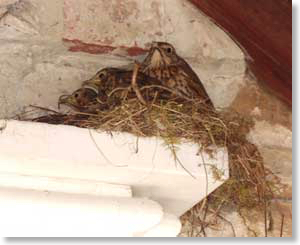
On a recent visit to a nearby monastery, we were thrilled to spot this bird’s nest above the entrance door. Seeing wild creatures close up is always heart-warming. One forgets that nature is “red in tooth and claw” and registers only the beauty and the vulnerability. In a similar manner, photos of the devastating effects of the oil-slicks in the Gulf of Mexico are changing the way in which we look at the problems they pose. The BP oil-rig disaster is being transformed from a personal tragedy (eleven dead and hundreds, if not thousands, losing their livelihoods) and ecological catastrophe into something potentially even more damaging.
The Obama administration’s attacks on BP (which, by the way, has not been “British Petroleum” since about the mid 1990s) are in danger of losing sight of the larger picture. One can understand the frustration, the political need to be seen to be doing something, but is the invective achieving anything positive? Driving down the BP share price, putting BP bonds into what is, to all effects and purposes, the junk category, and whipping up anti-British sentiment does no one any favours. Thirty-nine percent of BP is owned by U.S. investors, which has implications for US pension funds; and there is the inconvenient fact that putting British lives at risk in Afghanistan in what is widely perceived here as an American conflict is highly unpopular. Is there not a danger that a rift may be opened up which will have even more dire consequences than all that oil spilling into the sea?
So, where does the Sacred Heart, whose Solemnity we keep today, come into all this? With reverence, I would say at the very centre. Wherever there is human need and suffering, you will find God, although not perhaps the God you think you will find, the beautiful and transcendent Person untouched by the messiness of human existence. The Sacred Heart of Jesus is, as Isaiah said long ago, disfigured by our sin. We need to look beyond the obvious. That wounded Heart, which spilled its life-blood for us, is both a challenge and an encouragement. It challenges us to accept pain and suffering and sacrifice for the sake of others; it also encourages us to look forward to the hope of redemption. Somehow, all of us, both as individuals and as nation states, have got to learn how to lay aside our prejudices, our short-term triumphs over one another. What is happening now in the Gulf of Mexico may prove to have important consequences for us all. May the Sacred Heart of Jesus inspire and guide us. To see with his Heart is, after all, the surest way of seeing clearly.
Nuns on the Net
Unlike many, I don’t think that nuns are an endangered species, nor do I think our lives a waste or an irrelevance; but I do wonder why there is so much negativity, even among those who should know better. Even well-disposed clergy have a habit of referring to us as “the dear sisters” or “the good nuns”, phrases which set our teeth on edge because, frankly, they sound patronising. As to the people they think “might have a vocation”, words fail me. Even dedicated resources on the net are not without their problems.
For example, from time to time, I dip into a forum intended to help those considering a religious vocation. It tends to leave me tearing my wimple. I can cope with the romanticism, the dogmatism and even the rudeness of some posts (the forum is not UK-based, so one must allow for cultural differences and assume that no offence is intended) but what troubles me, and other monks/nuns with whom I have discussed the matter, is the prevalence of a number of self-appointed guru figures who seem to have a disproportionate amount of influence. When some who have never themselves been nuns/religious lay down the law about vocation or censure communities whose dress or ministry they disapprove of, there is a distinct whiff of sulphur, rather akin to that of sites which proudly assert their Catholicism but which, on closer examination, are found to be seriously adrift. There are honourable exceptions, of course. Digitalnun has been compiling a list of “trusted links” which she will eventually be posting on this web site in the hope of helping those trying to find their place in the Church. If you wish to suggest any for possible inclusion, please email the monastery. We will not link to any site we have not personally assessed, so please do not clog the comments section with URLs. Remember that digital blue pencil!
Age of Austerity
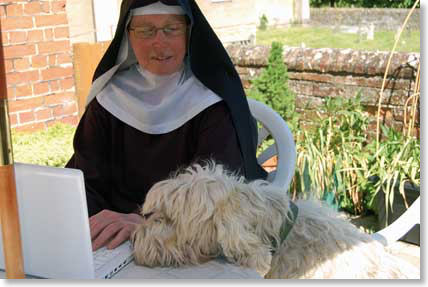
Could austerity become fashionable again? Yesterday’s speech by David Cameron made me think of wartime Britain. The austerity measures imposed by war resulted in a population which was actually healthier than ever before and, I think, more generous than before: witness the Welfare State and the opportunities offered by free education from primary to tertiary level. It is the generation to which I belong, the Baby Boomers, which has squandered that inheritance. We are now fatter, greedier and more reckless in our exploitation of the earth’s resources. Our selfishness means that young people today have a much less optimistic future than we once had.
However, I don’t think the budgetary cuts for which we are being prepared are necessarily all bad news. “Going without” is not in itself virtuous, can indeed be harmful, but if we are honest, we know that while we may not have everything we would like, most of us have all we need and more. The age of austerity upon which we are entering will certainly shake us out of our complacency. When we can no longer assume a right to this or that (holidays overseas, a designer label, or what you will), we shall be forced to reconsider where our priorities lie. Britain has a fine record for charitable giving, but when we can no longer give from our abundance but must share from more modest resources, we shall learn the true meaning of generosity. Is it too much to hope that we might become nicer people, more willing to help others, more kindly?
There will be some for whom the cuts will do more than trim the fat from their existence. There will be people who will suffer, whose incomes will not stretch to provide for all their needs and those of their families. I think we can be confident that the Churches will be in the forefront of trying to help. For some, that will mean a major shift in focus from the world “out there” to nearer home. With luck, or perhaps I should say grace, we might spend less time and energy on our internal squabbles and dissensions and more on learning how to be genuinely compassionate. If so, austerity will not only improve our physical health, it should do wonders for our spiritual health, too.
(Photo shows Duncan helping to compose a Colophon entry).
Restorations?

While we await a visit from BT which we hope will restore our connectivity with the outside world, we thought we would share this photograph with you (assuming our Broadband connection lasts long enough to upload it). It shows the chapel of the house where we stayed while D. Lucy enjoyed her delayed Silver Jubilee pilgrimage to Assisi. Here we prayed Lauds and Vespers, perched on the warm stone of the side walls, looking out over the green heart of Italy, with Hoopoes and Golden Orioles adding their song to ours. It was a magical few days for which we are profoundly grateful.
Connections
Blogging is likely to be sporadic while we try to get these problems solved. Email is currently unreliable; the telephone is almost incomprehensible; the waste of time is frightening. Can we learn anything from all this? We live in a world where communication has never been easier, but we rely too much on instant access. When it fails, our world fragments and we have to work harder at maintaining connections. We need the Holy Spirit.
Brave New World?
The biochemist in community has wisely suspended judgement, pointing out that from a Christian perspective "life" means more than a packet of DNA. She, at least, is not wildly excited by Dr Venter's work, expecting that media hype will not help anyone to a cool appreciation of what is going on. Again, she is alert to the moral dimensions of the case but seems not to have thought about the ethical ones. For me, the ethical considerations are the most urgent. Do we trust our institutions enough to allow them to develop this kind of research and not put it to uses which no decent human being could countenance?
We have not managed to rid the world of hunger, poverty or disease, for all our technological achievements over the past three thousand years. Still less have we managed to rid ourselves of violence and war. In fact, we seem to have found ever nastier and more horrific ways of killing. I wonder whether making that blue blob of synthetic DNA may turn out to be as important as the splitting of the atom. If so, pray God we never misuse it in the same deadly way.
Bangkok
A Sausage a Day
What struck me about the BBC's report was (a) food has become a substitute for religion, which is why there are so many articles and programmes about it, and (b) we long for what we eat to make us immortal while at the same time stuffing ourselves with too much of everything, which rather defeats the object. This is a terrible parody of the Eucharist. What truly nourishes, what truly gives life is "a morsel of bread and a sip of wine" become the Body and Blood of Christ.
Ascension Sunday 2010
De templo is not an easy read. There's a wealth of detail about architecture and, as you would expect, a great deal of number symbolism. Most modern readers find this far-stretched or tiresome, but Bede was anything but a simpleton. His purpose was to "crack the code" so to say, and reveal the mystery hidden within. For him, as a monk, monastic life was a paradigm of the life of the Church as a whole. That is where "being continually in the temple, praising God" comes in. It sums up one aspect of monastic life: our being continually in the presence of God, mindful of him and responding with prayer and praise.
Many people wonder what St Paul meant when he exhorted believers to pray constantly. Some try to multiply vocal prayers throughout the day and hope that by so doing they will indeed be praying constantly. Woodbine Willy is a wonderful example of how such a practice can make a huge impact on others. Most people simply find the idea exhausting. "My work is my prayer," they say; and very often it is the only prayer they make. Some join monasteries and hope that life will be one long liturgy until at last they enter upon the heavenly liturgy. Show them the scullery or hand them a duster, and they look a little puzzled. This is not prayer, surely?
Prayer and work are intimately connected. Work is not prayer in and of itself, although it can be subsumed into prayer. Equally, prayer can be very hard work, as those who have tried to pray year after year, day in day out, will attest. For a Christian, there can be no substitute for those times when we do nothing except concentrate on God. To these private times of prayer we must add corporate acts of prayer. A parish Mass or a monastic Office are alike in this: they are the common worship of the community, and as members of the Body of Christ, we need to take part in them.
What the writer of Acts understood and we sometimes forget is that the body of the living Christ is the new temple in which we live and move and have our being. Everything we do should therefore have something of the nature of prayer about it, not in the sense of repeating a multiplicity of vocal prayers or attending endless liturgies, but in the sense that mind and heart are focused upon God. There will be times when the focus is sharper, times when it is less distinct. That is as it should be. We cannot live always on the heights. It was when the Lord was physically removed from them that the disciples began to see him more clearly with the eyes of faith. Their response was to be "continually in the temple, praising God". However dark or troubled our own perception of God, that can be our response too by virtue of our baptism. God never asks what he does not first give.
Thirteenth Apostle?
Matthias is not the thirteenth Apostle, however. He is enrolled as one of the Twelve. The Church has never quite come to terms with the betrayal from within. Judas has been vilified, and sometimes I think the vilifcation says more about our fears than it does about Judas himself. We project onto him what we do not like about ourselves. If we search our hearts, we all know we have had Judas moments in our lives: times when we have behaved shabbily or affected others adversely. I like to think that the integrity of Matthias somehow compensates for the shortcomings of Judas; that his fidelity somehow makes up for the betrayal. Perhaps we could ask his prayers for our own infidelities, our own falling short of the vocation to which we have been called.
Today, when we are asked to pray and make reparation for the hurt and harm done by those who have abused others, we can also take encouragement from Matthias. We may be people of no importance; what we do may be very small and imperfect in our own eyes and the eyes of those around us; but it is God who judges human hearts and makes our actions fruitful. May he find in us what is pleasing to him as he found it in the heart of St Matthias.
Ascension Day Not
St Benedict was not keen on grumbling, however, so we need to find something positive for today. The best I can manage is the thought that the Ascension is an example of the paradox at the heart of the Church's life: simultaneous presence and absence, glory attained and yet to come. Perhaps having a few more days of waiting will sharpen our appreciation on Sunday. I hope so.
Rural Rides
Country Matters
For the podcast, please see here.
Days of Joy
First of all, by this stage of Easter we may need to be reminded about these "days of joy". They are continuing, even if we are beginning to feel that the Triduum is now quite distant. Then, there is the striking thought that what we do is in honour of "the rising Lord" (present participle). The Dominus resurgens is not an abstraction, nor is what we celebrate something over and done with but rather something, indeed someone, eternally present (the rising Lord). And we do more than "celebrate". That exsequimur is very strong: it means to follow to the end, to accomplish something. What we are praying about, therefore, is our following through to the very end these days of joy in honour of our rising Lord. There is a programme in the prayer, and it is not for wimps.
There is much more to say about the prayer than this but it is an ancient part of the practice of lectio divina to seize on a single phrase that can be slowly chewed over in the course of the day. For Digitalnun the thought that the Risen Christ is also Dominus resurgens will be more than enough.
Today also we come to the end of our novena to St Joseph. We are very grateful to all who have added their prayers to ours.
Holy Joseph, faithful follower of Jesus and loving spouse of his mother Mary, we believe that your prayers are powerful with God. We ask you to help us with your intercession, that what we ask in faith may be found pleasing in his sight and may be granted to us from the abundance of his mercy. We thank you for the many blessings we have received through your intercession. Pray for us now that we may become what we most desire to be, perfect disciples of our Lord Jesus Christ: who lives and reigns with the Father in the unity of the Holy Spirit, God for ever and ever. Amen.
A podcast on some favourite May saints has been uploaded to the podcast page.
A Touch of Whimsy
Light and warmth are so important to a sense of well-being, we forget that until the nineteenth century they were not readily available. Go into any house built before then, even the grandest, and you may be surprised how little natural light there is in the rooms; look at the fireplaces, look at the bedrooms, and think how miserable it would be going to bed by the light of a tallow candle, with no fire in the fireplace (our great-grandparents thought that having any heating in the bedroom, except in extremis, was a mark of moral degeneration). It was only in the latter part of the twentieth century that central heating became more usual in Britain, but when oil and gas were alike cheap, we embraced it with enthusiasm. Now we are learning to disentangle ourselves. Here we have disentangled ourselves more than most. Visitors to Hendred are warned that shirtsleeves will not suffice: a jumper (or two), a fleece, a scarf, a thermal jacket, and you may be comfortable, during the summer months at any rate.
Why this Saturday morning rant? No reason, really, except that when one is cold and melancholy it is a great relief to inflict one's misery on others. So, be warned, if someone you meet today is rather testy, it is not a sign of their imperfect conversion, not a mark of habitual sin or even an inveterately grumpy nature. It is the fault of the weather.
The British Constitution
Yesterday's Virtual Chapter was subject to a few technical glitches (both Digitalnun and Cybernun had difficulty logging into the system, while other participants were confined to texting rather than talking for the earlier part: possibly the internet was under strain) but you can listen to the results here. Suggestions for the next Chapter are welcome.
Civic Virtue
Many readers of Colophon will have read the Bishops' statement on Choosing the Common Good and tried to apply its principles when they come to vote. More will have spent time thinking about the policy statements of the various parties, the strengths and weaknesses of individual candidates, and decided for this person or that on the basis of what they think would be "best", where "best" is not clearly defined but is somehow to be equated with "doing what is right". Others (probably not readers of Colophon) will simply tick the name of the candidate whose party they favour without having any clear idea of what they stand for.
Does any of this matter? Today I think it matters very much indeed. We all know perfectly well that we face a very uncomfortable few years at least. The civil unrest in Greece is a tragic warning of what could happen if we do not face up to the demands of our situation. The concept of the common good is a valuable one, and you do not need to be a philosopher to recognize its implications. They go further than the concerns of our own nation state. At their core is a concern for justice, for right order, which is truly universal. One vote may seem small and insignificant but the strength of our political system rests on an intelligent and responsible use of the vote we have. Civic virtue may not sound very exciting but without it we could all too soon descend into chaos.
Digital Housekeeping
In the meantime, there is a Virtual Chapter tomorrow evening. The theme was suggested by a reader who is trying to work out how to reconcile the interior nature of Christian belief with a missionary faith. That is a question which concerns us all, so we hope there will be some thoughtful insight. For British participants the General Election is concentrating minds on how we engage in and with civil society. Here in the monastery there is the worrying prospect of Digitalnun dusting off her Thomas Aquinas and sitting before the microphone with several weighty tomes open before her. At least that should make her talk less!
We are still open to suggestions for a name for our email newsletter: you can subscribe to the newsletter itself using the sign-up box on the right. The suggestions already received are very imaginative, so there is a high standard to meet.
The Carthusian Martyrs
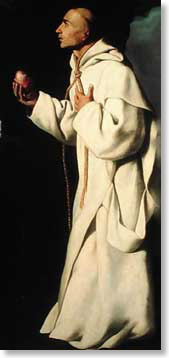
Do such martyrs have anything to teach us today when, rightly, we are all keen to put the polemics of a past age behind us? I think they do. We can honour brave men and women of faith in every generation and learn from their steadfastness. I may give offence to some of my Anglican friends (none is intended) when I say nothing becomes Cranmer so well as his death: he knew nothing could save him by that stage, but he went to the stake with a recantation in his pocket because he was not sure whether that was right. On 6 May we shall be going to the polls. How we use our vote matters. Probably none of the candidates will be "ideal" from our point of view. We shall have to compromise, but the compromise we make must be thoughtfully and carefully worked out. Much is at stake, if not quite as literally as in the case of many of our martyrs.
Fifth Week of Easter
We have been asked for suggestions about how to prepare for the next Virtual Chapter on Thursday evening. The most important text to study is probably Matthew 6, reading which prompted one of our readers to suggest the theme. For those of us in the UK, at least half our attention will be on the General Election; so we might consider what the political parties have had to say about the place (or lack thereof) of faith in society (e.g. Faith schools, the contribution of the Third Sector). We might also look at some of the questions raised by Lord Carey and others about the hostility, real or imagined, towards Christianity in Britain today. (Overseas participants may have some valuable insights to offer from their own experience, but I have to write from a British perspective.) There is also a huge amount of Catholic social teaching one could usefully go through, see here. If anyone else would like to make suggestions, please do.
The Podcast should be recorded later today. However, we have noticed that we often have unexpected callers on Bank Holiday Mondays, so please treat this as a statement of intention, not a firm promise (or threat).
The eagle-eyed will notice that we have added ReCaptcha security coding to our email Prayerline to keep spam levels down. To make it work we have to ask for a valid email address rather than allowing requests to be made entirely anonymously, but we can assure users that everything you write remains completely confidential as before.
Novena
Holy Joseph, faithful follower of Jesus and loving spouse of his mother Mary, we believe that your prayers are powerful with God. We ask you to help us with your intercession, that what we ask in faith may be found pleasing in his sight and may be granted to us from the abundance of his mercy. We thank you for the many blessings we have received through your intercession. Pray for us now that we may become what we most desire to be, perfect disciples of our Lord Jesus Christ: who lives and reigns with the Father in the unity of the Holy Spirit, God for ever and ever. Amen.
Newborn

One of those "ah" moments: a new-born lamb photographed while taking Duncan for a walk this morning. (In case you are wondering, we have put off getting our SLR repaired and have invested in a cheap point-and-shoot to "tide us over": digital equipment is fine until something goes wrong, then one has to decide whether to repair or replace. The latter often works out less expensive, which says something about our disposable society although I am not sure what.)
All week the Shepherd and his flock have dominated our reading of scripture. The shepherd motif is not unique to the Bible, of course. Homer often referred to the Greek chiefs as shepherds of their people; Hammurabi, the king of Babylon, also called himself "shepherd". The shepherd of the Middle East was and is a tough character who must actively manage his flock and face up to all kinds of dangers to ensure its safety and increase. Portrayals of the Good Shepherd tend to gloss over these realities and give us a rather saccharine image. However, we know very well that we behave like sheep more often than we care to admit. We are wilful, have a tendency to wander and become utterly helpless when knocked off balance. This morning's photo did remind me of one thing, however: the sheep too must experience risk and hardships. We tend to forget that childbirth remains a risky process, even here in the west. How much more so where basic hygiene and medical care is at a premium. Let us remember all expectant mothers in our prayers today.
In case you missed yesterday afternoon's blog post, we are setting up an email newsletter. If you would like to receive it, please register below.
Email Newsletter:
subscribe now
The Right Thing to Do
On a more mundane note, we do not know whether a regular email newsletter is the right thing to do or not, but not everyone has time to check the web site. In any case, some things are better dealt with by email rather than online; so, we are about to launch an email newsletter which will give you all the news that's fit to sprint through the ether. If you would like to receive it, please sign-up. Suggestions for a newsletter name are welcome (provided they are polite, of course). We shall not share your email address with anyone.
Email Newsletter:
subscribe now
Holy Water
We human beings are rather like our humble holy water bottle: not very impressive on the outside, perhaps, but beautiful within (at least, I hope so). We can press the analogy too far, but on this lovely spring morning when the whole of creation seems to be sending up alleluias, we do well to pause for a moment and just say "thank you". Thank you to God for all his gifts, and thank you to our neighbour for all that he or she brings to our life. A few drops of gratitude thrown into the desert of ungratefulness could have a remarkable effect.
Meanderings
The foolishness at the FCO seems to have attracted an absurd amount of attention. The internal memo was puerile, certainly; offensive, too, in its muddling of really important things Catholics believe to be wrong (like abortion) with things Catholics have long been actively involved in promoting (like AIDS clinics). It showed the perpetrator to be remarkably ignorant as well as silly. Perhaps the entrance exams for the FCO are easier than they were when Colophon was young (dim memories surface of sheltering under a tree while others constructed a raft in the midst of a downpour: another diplomatic career foundering on the rock of commonsense). Or perhaps diplomacy is no longer considered an art worth practising: boorishness rules, OK? What Colophon found really worrying was the thought that something similar might be written about a future visit by a Muslim head of state/religious leader. The possible consequences are too dreadful to contemplate.
Good Shepherd Sunday passed without a word being spoken about vocation, which shows just how far-reaching the abuse scandal is proving to be. Colophon has made its views known on several occasions so cannot be accused of treating matters superficially when it continues to assert that priestly and religious vocations are a gift from God to his Church, not to be despised or disparaged but earnestly sought and generously fostered. We need people who are willing to give their whole lives to God. So, even if our priests feel that they cannot speak about vocation, we can and must pray for all who are trying to discern God's will. They need encouragement and support. From whom will it come if not from us?
Finally, the letter from the Bishops of England and Wales acknowledging the wrongs that have been done, expressing the sorrow and shame we all feel and calling for special prayer on Fridays during May is to be warmly welcomed. It is exactly the kind of straightforward and honest response we had all been hoping for.
Giving the Internet Soul
The pope is spot on, surely, when he asks us to concentrate on the ways in which we Christians use language and other forms of communication "in the online society". Give the internet soul, YES! Digitalnun agrees heartily, but her eyes began to glaze as she read further: "The dangers of homologation and control, of intellectual and moral relativism are also increasing, as already recognizable in the decline of critical spirit, in truth reduced to a game of opinions, in the many forms of degradation and humiliation of the intimacy of the person." Yes again to the sentiments; but "?" to the expression.
Holy Father, very few English-speakers use words like "homologation" and those who do tend not to be very good at communicating. We are delighted that Rome is taking a positive view of the internet and the possibilities it opens up, but on this Good Shepherd Sunday, when we shall all be thinking and praying about vocation and our mission as Christians, could we put in a plea for more idiomatic and straightforward translations into a language spoken by millions of Catholics throughout the world? Otherwise, Roma locuta est, causa obscura est.
With filial love and respect, a blogging nun.
Valuing our Heritage
Catholics are notoriously bad at valuing their heritage. I don't just mean all the senseless destruction of Victorian Gothic which followed in the wake of Vatican II nor the equally senseless destruction of good contemporary design in favour of soulless pastiche which is sometimes a problem today (Digitalnun can be quite as severe about the Fusty and Musty school of church art as she is about the Brutal and Ugly: a pox on both their houses!) Heritage means more than that. It is art and architecture, language and music, of course, but also, and importantly, traditions of place and prayer, a whole way of being. Yes, Mass can be celebrated in a cowshed or a cathedral with great beauty and fervour; the Divine Office can be sung in a fine basilica or in the open air with devotion and skill. We know that. We give time and resources to our buildings, our liturgies, our vestments and so on and so forth, but sometimes we forget or undervalue our history. That's where the traditions of place and prayer come in.
This morning we attended Mass in the private chapel of the Eyston family at Hendred House. It has been in Catholic hands since 1256 and one certainly gets a feeling of generations of Berkshire Catholics praying there through the centuries. There are other places where one has a sense of fading glory, of abandonment, loss and ruin. One thinks of some of the splendid Victorian Gothic churches of the north. Monastic communities in this country have not always given a lead. A Jewish visitor to a Benedictine monastery once remarked that he had a sense of the Shekinah fading over the nearby city (where a community of monks had lived in the middle ages) but still being bright over the village where the nuns were then living. Today he might feel it fading there, too, for the nuns have gone and with them a Catholic presence which stretched back beyond Penal Times. Ichabod.
Heritage is not to be equated with mere conservation, a preservation of the status quo. Like Tradition, it must be alive and active. That is why traditions of place and prayer are worth cherishing, because they help us to a sense of the numinous, of God present, here and now. We look back and we look forward; but we can only know God in the present.
Our next web conference is scheduled to take place on Thursday, 6 May at 7.30 p.m. London time (13.30 EST 14.30 EDT and 18.30 UTC). We shall be looking at how to reconcile the interiority of Christianity with mission. Plenty of time afterwards to catch up on the Election results!
Early Rising
One could advance the eco-friendly argument, that making maximum use of natural daylight must be a good thing. The cellarer (bursar) would agree, adding that money not frittered away on artificial light could be better spent elsewhere, "elsewhere" never being defined, for fear she be held to ransom over a rash statement. One could also say that there is a practical advantage in getting up early to read and pray before the telephone starts ringing or people start coming to the door. Having been hauled out of bed by insistent late-night telephone callers three times already this week, I am not as enthusiastic about this as I usually am, although I know it to be true: reading and prayer are best carried out when there is less likelihood of interruption.
But is there a deeper, more spiritual significance to the practice of early rising? I think there is. All monastic traditions have looked upon night and early morning as privileged times of prayer. The Resurrection took place in that mysterious period between darkness and light. To pray at such times is to assert the triumph of good over evil, of Life over death. At a time when the world is unconscious or uncaring, we raise our hands like Moses in intercession for others. Like Moses, too, we know ourselves to be weak and feeble, sustained not by our own power but by Another's. Getting up early never comes easily to some, even after a lifetime's practice; but there is always the hope that, like Mary, we may meet our Saviour "very early, before the sun has yet risen".
Quiet Day
Peter's Problem
When the disciple Jesus loved said that the man on the seashore was the Lord, Peter panicked, grabbed his cloak and jumped into the water. (I do not think the conventionally pious explanation, that Peter jumped off the boat in order to get to Jesus more quickly, is anywhere near the truth. Except when becalmed, one does not leap from a boat to reach shore quickly, one stays on it; and if you were Peter, after that terrible betrayal at the trial, I think you'd be alarmed at the thought of meeting him again.) Peter wants to escape Jesus, just as Adam fled at the sound of the Lord's voice in the Garden of Eden. Like Adam, Peter is conscious of his nakedness and hopes his cloak will cover not only his body but also his confusion and shame. He has yet to learn that he cannot escape nor does trying to cover up anything succeed. He is forced to confront his deepest fear: Jesus Christ, risen from the dead, here and now on the seashore.
We shall never know what Peter saw in Jesus' eyes when he reached the shore. Forgiveness? Acceptance? Pain? Characteristically, he bustles about, bringing part of the catch to the barbecue; but there is no escape. The questions come, one after the other, but always with the same theme, "do you love me?" Peter answers truthfully, with a mounting sense of despair that he will ever be able to put things right and assure Jesus of his love. That is precisely his problem, and often it is ours too. WE want to put things right but have to learn, over and over again, that our betrayals and sins are "put right" by the Lord. Yes, we have to consent to his action, but it is he who takes the initiative, he alone who can redeem.
Peter experienced the Lord's forgiveness but it came with the command, "feed my sheep." For us too forgiveness is accompanied by a mission to pass on that forgiveness to others. How we do so may be a puzzle to us, but it should not be a problem. That particular problem was solved two thousand years ago beside the sea of Galilee.
A brief podcast on vocation will be found on the podcast page.
Frost and Frore
Many years ago, at the request of the Dalai Lama, two Tibetan monks stayed at our monastery for a year. Philosophically East never quite managed to meet West, but the language of compassion proved universal. It is heart-warming to see it being spoken now in the devasted streets of Jiegu.
Digital Doodles
After some hours spent cracking code, the afternoon was cheered by the arrival of a small party from the SLG, Oxford, who had come to talk about design software and updating their Press. Some readers will already be familiar with their list of spiritual works. If you are not, I recommend that you have a look at their web site. As always, we who spend most of our lives in silence had not the slightest difficulty in talking nineteen to the dozen about subjects of common interest.
No sooner had the SLG departed than we were plunged into another minor domestic complication. The on-going (nearly three months' long) saga of our changing banks has reached a new and dispiriting low. We now appear to be paying Standing Orders and Direct Debits from both old and new accounts, i.e. twice over, but the kind people who support us with donations directly to our bank account seem not to have been informed of the switch (despite our new bank's promise to tell everyone on our list). There is nothing for it but to try to sort out the muddle ourselves, which will mean a lot of letter-writing. In the circumstances, this blog is likely to fall silent for a day or two.
Digitalnun is now sitting grumpily at the computer. She has often waxed lyrical about acceptance and Christian resignation, but being asked to practise what one preaches will surely test her spirit. We shall see how she fares. In the meantime, a friend has taken photographs of the cross made by Martin Wenham as a temporary marker for D. Teresa's grave. As mentioned before, she is buried under the great west window.

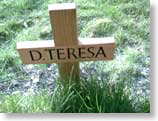
Grave Cross
Digitalnun's perplexity about the number of business emails received from fellow-Christians on Sundays seems to have struck a chordin others. Perhaps we need to think more about how and when we do things. Benedict has some perceptive remarks about choosing "the appropriate moment" for making a request or approaching a superior, so expect to read a post on this subject soon.
This week's podcast will be posted on Tuesday as we have a lot of catching up to do today.
Low Sunday 2010
Not exactly. Notice that I said "Catholics stand accused", not "priests and religious stand accused". We all like to distance ourselves from failure, how much more so from that which is evil. We may be quietly saying inside "There but for the grace of God go I", but our public stance is likely to be horror and outrage at the perpetrators. The trouble is, as St Paul reminds us, the Body of Christ is one and indivisible. We have all fallen short of the glory of God and are all somehow bound up with one another.
Since 2001 the Catholic Church in England and Wales has had some very rigorous procedures in place to try to prevent the abuse of children or vulnerable adults. The case of David Pearce shows how faulty or negligent implementation can make them as good as useless. Do we therefore say, "Scrap the procedures. They are not working", or do we acknowledge that there will always be failures because human nature is not yet perfect? Acceptance of failure is not the same as condoning it. As a Church we must redouble our efforts to protect the vulnerable and to create a culture in which children and young people are truly valued and respected.
The wounds on the body of the Risen Christ are still there, but they have become glorious channels of life and healing. I am not suggesting for one moment that the dreadful things done to children and young people can ever be anything but appalling, but isn't there a possibility that out of this experience something good may come? It is Colophon's hope, as I am sure it must be the hope of many, that a humbler, more open Church may arise from the ashes of our previous over-confidence.
There will probably always be men and women drawn to priesthood and the religious life who do not have the requisite maturity or balance to undertake its obligations. Sadly, I have known some of them. But there are also saints; and I have known some of them, too. Many good Catholics are suffering today for the sins of others. Let us not forget them as we try to make sense of what is happening in and to the Church. Today's gospel is full of hope: sin and death are not the end of the story but the beginning. On us too let us ask the Lord to breathe his Holy Spirit.
Veilaudio, the CNR and Life
Matthew's words have set Digitalnun thinking about some of the ways in which our community differs from others. For example, our Associates, Oblates and Friends are an integral part of our "monastic enterprise", not just a nice extra. During recent weeks this has been very evident in the relaunching of Veilaudio (formerly St Cecilia's Guild).
When D. Teresa died she took to the grave with her a great deal of information about the audio book service. We all tend to store things in our heads or jot down coded messages incomprehensible to others on the backs of envelopes or in a digital Shovebox. D. Teresa was no exception; so, for the last few weeks, two of our Friends have been patiently and painstakingly working their way through the Upper Room which houses most of the audio library. They have pieced together a list of members' names and addresses, sorted through hundreds of cassettes, fathomed the mysteries of the archaic cataloguing system and begun transferring records to something safer and more easily upgradeable. Every user of the service should now have received a letter explaining what we are doing. Meanwhile, another Friend has completed exhaustive tests on the digital recording equipment we are hoping to buy for those who record books for us, and a visually impaired Friend has been experimenting with some of the new audio formats we shall be introducing. In the process, redundant equipment has been identified and disposed of and clutter eliminated. On the down side, we realise just how much we miss D. Teresa's unique "take" on things, her unsurpassed ability to befriend elderly and isolated people, and her genius for choosing books to record.
Our next task will be to decide which titles we shall be recording this year. Hitherto we have managed to produce roughly one new audio book every fortnight, and we'd like to keep that up although there will inevitably be a hiatus until we have everything working properly. At the same time, we shall have to do some serious fund-raising if we are to keep Veilaudio a free service. Watch this space, as they say.
Finally, many thanks to those who have responded to our request for suggested times/dates for our next web conference. If you haven't yet done so, there is still time. The subject will be reconciling the interiority of Christianity with the demands of a missionary Faith (cfr Matthew 6 and what we do on Ash Wednesday). If you live in the U.S. dialling directly into Talkshoe may be easier than using the VOIP option we Europeans resort to.
Web Conference Plans
Digitalnun has been exploring some alternative web conference software, but we'll stick with Talkshoe for the time being. Please remember that if you wish to join in the discussion, it is better to use a headset with earphones and microphone rather than relying on the inbuilt microphone in your computer.
The Easter Octave
It does not really matter where we look for the origins of the octave, e.g. the dedication of Solomon's temple on the eighth day, Early Christian baptismal practice, or the dedication of Constantine's churches in Tyre and Jerusalem in the fourth century. What matters is what the octave has become in Christian thought and practice. It is a privileged time for teasing out, as it were, all the richness of the great event we are celebrating. The Triduum is so full of drama, the liturgy so demanding, that one really needs eight days in which to reflect on the Resurrection. It is good that during these days we hear the different resurrection narratives in their proper context and are able to sing the psalms with a sense of completion, of victory won.
Perhaps the very busyness of the Easter Octave is an opportunity to ask ourselves what it means to be a Benedictine today, to live with the tension, so to say, of being contemplative in a world that is anything but. I am reminded yet again of the "eye of the storm" idea. It is, paradoxically, at the heart of the tempest that the deepest peace and stillness is to be sought and found. Maybe that is what is being asked of all of us, whatever our state in life, this Octave.
Trials and Tribulations
It always amuses us that as soon as some great Christian festival approaches, we receive a lot of work from people who are preparing to celebrate the feast/just setting off on holiday and would like to have everything finished when they return. Quite when we are supposed to do all this work, given that we are celebrating the feast too, is never made clear. This year we seem to have more than usual to get through and some of it has involved confronting the darker side of the web (we have been asked to help people whose sites have been hacked, not nice, not nice at all). In between times, i.e. when we should have been sleeping or eating, we have been begun sorting through D. Teresa's things, welcomed visitors and tried to keep up with Veilaiudio (thank heavens for our Friends, who are doing most of the work there) AND dealt with the ongoing saga of changing banks. If you too are thinking of changing banks, consider this and be warned.
In January we decided that the service we had been receiving from our old bank did not justify the charges we were being asked to pay so we began the process of moving everything to another. Little did we expect that more than two months later the process would still be far from complete, that extracting information from our old bank would be like drawing blood from stones and that we would face 1 April not knowing which bank would be paying which standing order. Digitalnun's desk is always covered with paper but it has never been quite so difficult to work out which pile concerns which problem. On the plus side, our almost daily conversations with a succession of courteous and helpful Head Office staff at the new bank have done much to restore our faith in human nature. We have received an abundance of "the good word" if nothing else. I know we should be grateful. If the sun shines today, we shall even feel grateful; but it would be such a relief to have the business concluded. Funny how things like this can can assume such gigantic proportions, isn't it?
Aleluia, alleluia, alleluia
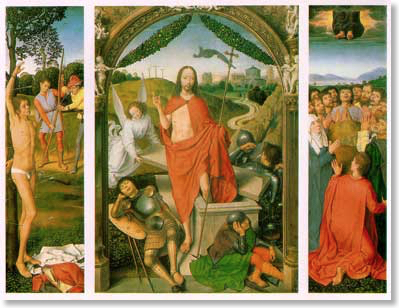
Christ is risen, alleluia! Those words have rung out from countless churches and chapels throughout the centuries as they ring out today. He is risen indeed, alleluia! For eight days we shall celebrate Easter day, then for six weeks more we shall celebrate the Easter season. All the sin and shabbiness which disfigures our lives is redeemed, transformed by the love poured out upon us. The Resurrection is too big to be grasped, we can only kneel in wonder at God's amazing, reckless generosity. Today, when we are all tired after the drama of the Triduum, the splendour of the liturgy, the sheer effort involved in making Easter a day of celebration, we do well to rest if we can. To rest in God is to allow him full scope to act, and isn't that what we most desire?
For those who expressed an interest in a plainsong ringtone, here is a little Easter present for you. Right click the image to download the linked file and save to your desktop, then transfer to your mobile via bluetooth or USB cable (the sound quality is not brilliant, but that keeps the file size small).
Paschal Triduum 2010
I like the fact that at midday on Good Friday and Holy Saturday we sing the whole of psalm 118 (119) straight through. It is a great dance around the Law, but on both days it takes on a different character. Sung on Good Friday, words which at other times are so beautiful are like the hammering of nails; on Holy Saturday they have the bleakness of death. The same is true for other elements in the liturgy, too. Throughout these days it is our custom to read the Last Discourse from St John's Gospel as evening falls. With the waning of the light, the words take on a solemnity they sometimes seem to lack when read at other hours. The oratory will be stark and bare: waiting, waiting.
This year we shall not be blogging during the Triduum: we all need a little time to reflect. So, no distractions, no seeking ways of escape: we must go into the tomb if we wish to rise with Christ on Easter morning. May you be greatly blessed this Easter.
Day of Preparation
For us, the public face of preparation is largely a matter of cleaning, cooking and "running through" different elements of the liturgy. But what about the private face? Whatever sort of Lent we may have had, whether we have been fervent or lackadaisical, today presents a great opportunity to focus on what really matters: to give some time to prayer, to fast, to give alms, to get into the rhythm, so to say, of Holy Week.
Each day of the Triduum forms part of one great whole: it is a single Liturgy that unfolds in three parts. We begin the Mass of the Lord's Supper on Maundy Thursday with Paul's words about glorying in the cross of Christ; Mass ends without the usual blessing and dismissal, because we are expected to be present at the next phase, the Solemn Liturgy of Good Friday afternoon. The Good Friday Liturgy looks forward to the resurrection and again leads naturally to the Great Vigil on Easter night. Only then will there be a blessing and dismissal, because with the Easter Vigil we reach the summit of the Christian year.
Betrayal, Death and Resurrection: that is what we see when we look at Jesus as he passes through his Triduum. When we look at ourselves, we wonder what he can see in us to merit what he has given: his very self in the Eucharist and in the Priesthood, Redemption and Eternal Life. As we shall sing on Easter night, " to ransom a slave, you gave away your Son." Our day of preparation might include a few minutes spent thinking about that.
Holy Week 2010
Palm Sunday 2010
This year the Church is asked to go through Holy Week carrying the burden of a self-knowledge many find deeply distressing. The revelations about abuse and cover-ups may have been hyped by the media but no one with any integrity is going to use that as an excuse for not confronting this darkness within the Church. For contemplatives there is an added dimension to the suffering: we are called to make reparation in ways that few understand. It is a part of our vocation that is not often alluded to, probably because it has to be lived before it can be explained. This week we are called to live with an intensity unknown at other times of the year.
Over Holy Week hangs a great sadness but a great confidence, too. Christ our Lord has taken upon himself every sin and forgiven them all. We cannot change the past but it can be redeemed. We can "go and sin no more". Let us pray for the whole Church, that we may become what we are meant to be: a people purified and fit for the Kingdom of God.
A Lesson Learned
Then we noticed a book with Haiti in the title and were ashamed. Yes, our loss is real, but it in no way compares with the loss the people of Haiti have experienced or the difficulties they face every day. We treasure our books, but we shouldn't invest so much of our hearts in them. The gospel is clear about that kind of thing. We dream of having more space, of being able to do things that are at present impossible; and I am confident that one day we shall; but for now we must relearn the lesson. In small things as in big, God is in charge. Sometimes you just have to begin all over again.
A Printer's Rant
So, before you send me your book and tell me to print it "just as it is", please consider this. When we set out to design a book we begin with pencil and paper, protractor and set square, and map out the page size, text block and margins. We think about the typeface (note the singular: a mark of bad design is an abundance of typefaces spattered across the page), the illustrations, the kind of paper to be used and the colour of the ink (black inks differ from one another and change appearance depending what they are printed on). Above all, we think about the content and how it will be used.
We look at the illustrations and the screening, correcting tints in photographs, cropping and enhancing. We check for things like transparency; change to vector art where appropriate; make sure that everything will output as it should. This takes time, and the equipment used is expensive. Quite often, trying to put right what others did wrong takes longer than starting afresh, but it is difficult to convince people of this, so we do not always try; although Digitalnun is usually patient about explaining why things that look marvellous on screen can look disappointing on the printed page. It can be very hard work.
Why do we bother? Printing is one of the invisible arts: you will know when it is well done because nothing will jar, nothing will scream at you, "look at me! me! me!" There is an integrity about the well-printed page that sits well with monastic life. For fifteen hundred years Benedictine monks and nuns have worked with words: writing them, printing them, digitizing them. The internet is opening up even more opportunities for allowing words to speak eloquently to us. It is worth taking trouble about them.
Annunciation 2010
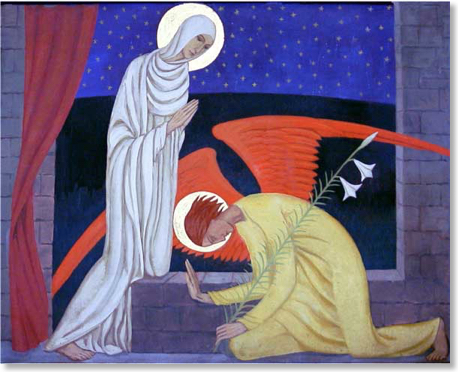
The Solemnity of the Annunciation of the Lord is one of the most attractive feasts in the Church calendar. There is always something fresh to ponder in Luke's account (1.26-38), while the abundance of music, poetry and art devoted to this subject is amazing. We must not lose sight of the fact, however, that we are remembering an event in history which was to have consequences for us all. Our salvation, and that of the whole world, hung upon the readiness of an obscure young girl (perhaps as young as twelve or thirteen) to do what God asked of her. All the Fathers agree that Mary's consent was necessary for the Redemption to take place. That does not mean that God would not have redeemed us had Mary not given her consent but that God foresaw her acceptance from all eternity (cfr St Thomas, Summa III.30). It was indeed a moment of unequalled faith: of Mary in God, and of God in Mary.
Recently I learned that there is a delightful legend said to come from Nazareth. The Angel Gabriel found Mary sitting by a fountain. Not surprisingly, his appearance startled her and she fled from him in fear. He followed her into the house to deliver his message, which is why the Annunciation is often depicted as taking place inside. In fact, the iconography of the Annunciation is a fascinating study in itself. Early Christian depictions usually show Gabriel as an angel of the Old Testament, severe and terrifying, before whom Mary kneels tremblingly. From about the twelfth century onwards, a new lyricism transforms the scene. The stiff hieratic forms yield to something much more youthful and human. Now Gabriel kneels before Mary. To be the Mother of God is to be exalted above the angels. Paradoxically, it is Mary's humility and obedience that lifts her so high.
A podcast about the Annunciation has been posted here.
Muddled Thoughts
This is the anniversary of the day on which Romero was gunned down at the altar. He knew that he was likely to die and had already forgiven those who would do the deed. Most people think of him as a brave man who changed from being a pillar of the establishment to one who openly questioned whether the inequalities of the society in which he lived were justified and who worked tirelessly for social justice. My questioner asked why the Catholic Church had been "so ambivalent" (his words) about Romero for so long. I think it is a valid question.
Martyrdom, as the Church understands it, is to give one's life for Christ and for the truth of his teaching. Some have tried a little chop-logic on Romero, arguing that he died for something other than that. None of us knows what was in his heart and mind at the moment of death, any more than we know what was in the heart or mind of the man who shot him; but it seems reasonable to suppose that a priest saying Mass was focused on what he was doing, that as the gun rang out God was all in all.
I do not know if Oscar Romero was a martyr or not; but I do know that this morning his courage and generosity have made me feel a little shabby, a little cowardly. I do not live in daily expectation of being murdered, but I grunt and groan about the petty inconveniences of life as though they were important. I am not sure that anyone would find enough evidence to convict me of "working tirelessly for social justice". There is a danger in concentrating on one's own shortcomings, however. I do not expect to become a martyr, but who knows what God may ask, what grace he may give. I must be ready even here, in dear old England. After all, I have vowed my life to him.
St Benedict 2010

Meanwhile, over at the Vatican, there is at last an official Vatican News Twitter feed. Six in fact: for the English language version look for news-va-en. There is also a new web site for "Vatican Resources" at http://www.resources.va/. Both the Twitter accounts and the Resources site are currently dominated by the abuse scandals, which is telling. Here in the UK people have been quick to comment on the Pope's letter, often negatively, but the whole subject seems to be generating more heat than light. The anti-Catholic feeling finding expression in the media is nothing new, but if it were directed at any other group in society might be found unacceptable. There is a danger that some will react to the negativity rather than tackle the underlying issues. May St Benedict help us with his prayers to listen to what the Holy Spirit is saying to the Church.
On Saying Thank-You
Thinking about one's own shortcomings is not good for the temper, so it was a relief to catch sight of one of the books in my room: a book of Jewish blessings in which there is a blessing for every conceivable occasion. See the sun or the moon? Bless God. See a new animal or taste a new food? Bless God. Go to bed or rise up? Bless God. In the Rule of St Benedict, every important action in community is accompanied by a blessing: before we read, before we serve in the kitchen, when we receive a guest. It is harder to bless God when painful things happen, but who has not struggled in the face of death to say, "Blessed be the Lord who has given and who has taken away"?
The abuse scandals coming to light in the Catholic Church have caused much anguish. Readers of this blog will know exactly where we stand so will understand when I say that even for this we must bless God. Bless him not for the pain or the destruction of trust, but in the midst of the pain and destruction. Bless him for coming upon us as purifying fire. Bless him above all for being God and loving us despite our failure and our shame. It is when we are least lovable that we need his love most.
St Joseph
Humilty and persevering fidelity to the task in hand are not spectacular qualities but they are very necessary to the good order of both family and society. I am not alone in thinking that fatherhood does not seem to be properly valued today, and I find it troubling. We may be learning to our cost that single-parent families are hard on both parents and children, but there seems to be an inbuilt presumption that mothering is more important than fathering. I wonder. Good fathering is important to both boys and girls, we all agree, but perhaps even struggling, incompetent and not very assured fathering is better than no fathering at all.
So, take heart if you are a father and don't feel that you are making a very good fist of it. Your child needs you, just as you are. Would Jesus of Nazareth have been the person he was without both Joseph and Mary to help him towards adulthood? Did they never make mistakes, get things wrong? Of course not! They were human, too. Let us pray today for all fathers: good, bad, indifferent and absent. Especially the absent.
Word, words, words
The reason for this restraint in speech is simple: we need to listen. The very first word of the Rule is "obsculta", listen carefully. We need silence to hear God, we need silence to hear others, we even need silence to "hear" ourselves. (How often have you heard a harrassed parent say, "Shh, I can't hear myself think!") One facet of modern life many find irritating is the sheer volume of meaningless noise with which we fill the world (think being put on hold on the telephone). I do not know what we do about it, but I have made a token protest. The ringtone on my mobile is a very meaningful piece of plainsong. If we have to have noise, let it be prayerful.
Glorious St Patrick
What history fails to record, legend often supplies. There are some good stories about St Patrick, but even so, this morning they fail to stir. We are at that point of Lent where we seem to have been trekking across the interior desert for ages and the way ahead stretches long and lonely before us. Excellent! Lent is doing its work. It is making us more sensitive to God and hopefully to others also. It is making us confront the fact of sin and forgiveness and the bleakness of our inner landscape. It is not enough, however, to lament our fallen state. We are meant to do something about it.
St Patrick was moved by the plight of his captors to spend the rest of his life trying to win them for God. He could do that only because he had experienced the power of God's forgiveness in his own life and was therefore able to forgive those who had injured him. Forgiveness spurred him to action. We too have been forgiven, but do we pass that forgiveness on? Or are we "hearers of the word only?"
A New Name

We can let you into a little secret. St Cecilia's Guild is about to be renamed and will soon become Veilaudio. We hope the new name will not only describe better what our audio service to the blind and visually impaired actually is but also help identify it more immediately with the monastery. We already have Veilnet (for web design and hosting), Veilpress (for typography and printing and Veilshop (for retail sales). If you are wondering about the use of "veil", it is a play on "vale" (as in Vale of White Horse, where we live) and a nod in the direction of our being nuns. We have a simple logo (see above) to go with the new name and will be launching it properly when our rejigged web site goes "live".
No podcast this week because we have lent our HandyZoom to a friend. After using the Zoom any other audio seems inferior, and since we don't consciously do inferior here, you are spared our ramblings for a few more days.
Laetare Sunday 2010
By a nice irony, today's gospel (Luke 15) is all about men: a prodigal son, a scratchy elder brother, and a generous father. Of course, at the heart of the gospel is the teaching about God's tender love for his wayward sons and daughters which transcends all questions of sex. John Paul I described this love of God as "motherly" and one can see why. In fact, for me, the missing character in the gospel is the mother. Has she been written out of the story, as women have so often been written out of the story of the Church?
In asking that question, I am not seeking to make a cheap point. The abuse scandals which have hurt so many are not about celibacy, not about the clergy alone: they concern the Church as a whole, you and me as much as bishops and priests. They are about an abuse of power, collusion and cover-up: the Church failing to nurture and protect, seeking things other than the Kingdom. Attempts to apportion blame get us nowhere. What we need above all else, I would suggest, is to regain a sense of the Church as Mother, of our mission of service, of profound humility before God and one another. A humble, servant Church will still be a Church of sinners; but God has no problem with sinners, even if we do. It is hypocrisy that corrupts and destroys.
This is a very good day on which to pray for our Mother the Church and for ourselves.
Mums and Kitchens
Two elements of Benedict's treatment of the subject stand out: all are to share equally in the burden of cooking unless some other business of overriding importance to the community has to be attended to, and help is to be given whenever needed. The spiritual motive and benefit are never far from the surface. Serving in the kitchen "secures a richer recompense and greater love"; so all are to "serve one another in love". The trouble is, kitchens can be hot and steamy places, and I am not referring to the pots and pans. There is nothing like having to produce a meal for others when one is tired or the store cupboard is low to make one irritable. Feeling guilty because temper has flared only makes matters worse. (If you do not recognize this scenario and cheerfully move around your designer kitchen, glass in hand, producing fantastic meals from fresh organic produce, sourced locally, for an admiring circle of family and friends, the likelihood is that you have no need to cook for others but do so for sheer delight. Lucky you. Or maybe, not so lucky: meals are sacramentals, and to provide them for others is a wonderful form of service.)
Perhaps this is a week-end when Mums could be freed from feeling guilty for all the times they are manifestly not "the angel in the house". It is difficult to love an angel. Human beings, with all their shortcomings, are much more lovable. Be human.
Catching Up
However, we do have some good news. Thanks to generous gifts, the future of this web site looks assured for another year, at least as far as hosting and ancillary matters are concerned. (Inspiration depends on the Holy Spirit.) Myles' s Jazz Evening together with the Raffle organized by Mary and Damien raised £446 for our work for the blind, which was a brilliant result for a small village in the bleak midwinter.
Today we have a lot of catching up to do. There are about 80 letters of condolence to which we must reply and some work and admin deadlines to meet so there are likely to be a few tense moments. It is just as well that Digitalnun has given up worry for Lent. "Cast all your burdens upon him, for he has care of you" as we sing at Compline. That is a sentence to treasure throughout the day.
An Ordinary Day
As the day unfolds there will be work to do, people to see, unexpected delights and probably moments of difficulty or disappointment also. The holiness of the ordinary is something we do not always appreciate as we ought. It is, however, on ordinary days such as these that our salvation is worked out. Whether we are full of energy and hope, or tired and a little grumpy, the present moment is the only one in which we can meet God. We may forget that most of the time: the important thing is not to forget it all the time. The ordinary is really not so ordinary after all.
Welcome
It made me think about how we welcome others. So often we concentrate on the adjuncts of hospitality: food, drink, setting. The really important element of welcome, giving time and listening to the other, is something we are less good at. Why? It is surely easier than killing fatted calves or organizing great celebrations. The analogy with prayer is obvious. God asks of us a listening heart rather than great sacrifices, but we often seem keen to give him sacrifice (often trivial) rather than obedience. It doesn't work the other way, of course. God gives us everything and listens to us, too. Perhaps we should think more about how God has welcomed us into his life than how we try to welcome him into ours. Look at the crucifix and see how his arms are spread wide to receive us, eternally.
Techie Trials
Meanwhile, anyone who has an administrative or managerial role may find it helpful to listen to the Rule today and tomorrow. Chapter 31, on the Cellarer or Bursar of the monastery, is a succinct treatise on the spiritual aspects of management. Goods and tools are to be accorded the same care and respect that we give sacred altar vessels. People can be more awkward to deal with, but even the most demanding must be treated with courtesy and respect. When there is nothing else to give, there is always the good word which is above the best gift. A good word. Surely we can all speak one today?
Genetics and the Story
What is it that enables some people to maintain their religious identity for centuries while others fall away or reject it quite early in life? The theologian may argue the case for grace, the sociologist for cultural influences and endogamy, and so on and so forth. I suspect there is no one answer. Religious communities reinforce a sense of identity by their use of common texts (e.g. for us as Benedictines the Rule and Customary), common rituals (our ways of dress/worship) and common history (the retelling of the story of how we came to be). During Lent we are particularly conscious of the latter: the telling of the story. On Easter Night we shall listen by the light of the paschal candle to the whole of salvation history, culminating in the gospel of the Resurrection. The fact that the Son of God became man for our sakes, shared our flesh and blood and identified with us in both his birth and his death, is breath-taking. In Jesus there is not a single selfish gene, only the purest, most generous love. That is a story worth telling again and again.
Pure Praise
True praise is beautifully simple and leads to ecstasy in the literal sense. We stand outside ourselves, our gaze wholly focused on the other, our very body language reflecting the joy and delight we experience. Children and dogs are good teachers of how to praise. When we were reunited with Duncan the other day his whole body was one ecstatic wiggle of delight (PBGVs are well-named "the happy breed"). In England our worship of God tends to the stately rather than the ecstatic, but perhaps we should allow our praise a freer flow. David danced before the Ark, indifferent to the disapproval of his wife or any other onlooker. I doubt whether we'll be wiggling in choir today, but I hope our singing of the psalms will be full of a similar transcendent joy. Let everything that lives and that breathes, praise the Lord!
Excommunication
This is a real challenge to anyone who has ever had to "take disciplinary action" because it is easy to assume that all blame lies with the offender. It may do, but that doesn't mean we can wash our hands of responsibility for his/her conduct. It is also a challenge to the Churches as we struggle with our interior dissensions and disputes. How do we maintain that "bond of unity which the Spirit gives" when some of our members seem to be adopting positions diametrically opposed to the historic faith and belief of our Church? How do we reconcile all this "comfort-giving" stuff with the need to be clear and firm in our belief and practice?
Benedict is wise enough not to answer that question. Instead, he demands of the abbot an almost super-human degree of effort to win back the straying brother, reminding him that he has undertaken the care of weak souls not tyranny over strong ones, warning him not to give up just because the task is difficult. Ultimately, he uses the example of the Good Shepherd leaving the ninety-nine sheep in the wilderness and going in search of the one that is lost. He adds a poignant detail, however. He assumes the lost sheep was found and that the Shepherd "had such great compassion on its weakness that he deigned to place it on his own sacred shoulders and so brought it back to the flock."
It is rare to find such a clear statement of the obligation to be compassionate, to take on one's own shoulders the burden of another. We can dodge it; we can fudge it; but we can't finally escape it, because it is part of what it means to be Christian and a member of society. I hope that thought makes you as uncomfortable as it makes me.
Amen
Home sweet home
It is, however, good to be back in the routine of monastic life and the simplicity of Lent. Lent seems so long when we begin but passes so quickly, we need to make the most of it. We have decided that this year we shall drop our usual programme of Lenten talks, etc as we have a great deal to catch up on and it is silly to overstretch ourselves. We shall, however, honour all our existing commitments to the CWL and local parishes.
Today marks the thirtieth day since the death of D. Teresa, the completion of the "month's mind". Now we must begin in earnest the sad work of sorting through her effects and dealing with all the legal business which is more complicated than usual so will require more time. One of her sisters will be staying with us for a few days, so please keep her in your prayers. Our audio service to the blind continues but please bear with us while we try to disentangle various elements. D. Teresa was the audio librarian and the only one of us really "au fait" with the system.
A Time for (Temporary) Silence
Talking of prayer, Colophon is not off to Rome, but the monastery bloggers and podcasters feel the need to take more in if they are to give out anything worth reading or hearing. So, no more blogging, podcasting or tweeting until the 1 March; and to make sure she is not tempted back into cyberspace before the feast of St David, Digitalnun is not even going to update the Prayer Box. Instead, you can listen to the daily section of the Rule below; and if you find yourself wondering how to feed your Hendred podcast addiction (oh, the arrogance! Ed), there is still a longish one on Lent on the podcast page, plus 80 others. That should mortify you sufficiently, should it not?
February 23
Alternative content
February 24
Alternative content
February 25
Alternative content
February 26
Alternative content
February 27
Alternative content
February 28
Alternative content
A Missionary Faith
On the very day when the gospel told us to let no one know we were fasting, Catholics were walking around with great ashy smudges on their foreheads to proclaim their penitent condition. They may not have been having trumpets sounded when they gave alms, but they were definitely seen by others in church as they attended Mass or other devotions. What are we to make of this? And how do we reconcile the interiority of Christianity with the duty to proclaim the gospel?
First, I think the discrepancy between what the gospel says and what we actually do is worth noting. Ash Wednesday highlights a perennial problem for Christians: we are rather picky about how we interpret the scriptures. By Maundy Thursday we shall be following the gospel literally, washing feet and celebrating a festive meal, but on Ash Wednesday what we do is diametrically opposed to what the gospel says. Or is it?
I myself think that the gospel is pointing to the way in which we can use religion for irreligious ends, to draw attention to ourselves, to portray ourselves as rather better than we are, and certainly better than the next man or woman. Sadly, we can end up believing our own myth: because I go to church on Sundays, tithe my income and fast regularly, I really am a good person. Well, you may be, but you may also be a conceited fool with a heart of stone, blind to your own shortcomings. (A nun's anger, said Newman, is like rapsberry vinegar: sweet acid; I plead guilty).
But what about the duty to proclaim the gospel? It seems very un-English. While Catholics are quite happy to walk around with ashes on their foreheads on Ash Wednesday, they tend to become tongue-tied when asked to explain what they believe. One does not often see them nowadays standing on street corners and proclaiming the Word of God. It may be something of a cop-out to suggest that there is more than one way of proclaiming Jesus Christ. As a contemplative nun, for example, I am sure that the most important thing I can do to spread the gospel is to live monastic life as well as I can, devoting myself to prayer and service in the monastery. I am encouraged in this by the thought that probably the greatest missionary of the nineteenth century was a French Carmelite nun called Thérèse.
But there are times when one must go beyond simply "performing the duties of one's state in life". None of us knows when those times may come, but we can be absolutely sure that we will be given grace when we need it. God never asks what he is unwilling to grant. The problem for us is being ready to listen.
Shrove Tuesday 2010
Only God can forgive sin. The priest acts in God's name, in accordance with the power and charge given him in the Sacrament of Order; and forgiveness is by no means automatic. The penitent must confess, make satisfaction, perform the penance imposed on him and have a firm purpose of amendment for the future. It is not enough just to rattle off a "laundry list", whip through an Act of Contrition, reel off an "Our Father" or two and assume all is well in this world and the next. Sin matters because it binds us and God wants his children to be free, but we have to do our part in responding to the invitation God makes in this Sacrament.
The first stumbling-block for some is the act of confession. To examine one's conscience in the light of the gospel can be painful in itself. Try reading 1 Corinthinans 13, putting your own name where St Paul puts the word "love" and you will soon see where you are wanting! Trying to articulate this murky side of oneself is certainly humbling, but it is also remarkably liberating. Sin's power over us is the power of darkness and concealment which confession breaks by allowing light and healing in. In a sense, the Sacrament is already work when we realise that we are sinners and have fallen short of God's glory.
Being sorry for one's sins is sometimes another difficulty. Here it is important to remember that it is not what one feels but what one intends that matters. If one is resolved to try one's hardest not to commit a particular sin again, there is no need to try to manufacture a feeling one doesn't honestly feel.
Making satisfaction for one's sins is often overlooked but is absolutely essential. If, for example, one has harmed someone by speaking ill of them, one must do all one can to put matters right. That may require a public humility which makes one squirm. Tough. Sin is serious; so is grace. Or there may be sin that no one but oneself knows about, but that too must be put right if one can. Confessing one's sins to a priest not only reveals them for what they are, it also makes one aware how clever we can be in finding excuses for them or minimizing their importance: having to do something about them strips this false comfort from us.
The penance imposed by the priest refers to the temporal punishment due to sin. By confessing we acknowledge we have injured the whole Body of Christ and we are required to make amends, hence the penance. It must be performed diligently and as soon as possible. Finally, there is that firm purpose of amendment for the future and our gratitude to God for what he has done for us.
Conversion, confession, celebration: this is the threefold pattern of the Sacrament of Penance which prepares us for Lent. It is not all doom and gloom. But before we clear our larders of eggs and fats for the Lenten fast, before we set our first pancake sizzling in the pan, let us remember what Lent is about. It is our great Festival of Freedom as Christians, and a necessary part of our preparation is the acknowledgement of our entanglement in sin.
This week's podcast (to be posted tomorrow) will be longer than usual and will be part of the prioress's Chapter talk for Ash Wednesday.
Ars Amandi
By a happy accident, St Valentine's Day coincides with Sunday this year, so we had the Beatitudes at Mass. I daresay many a preacher compared the two ways of loving, Christian and commercial, contrasting the self-giving of the one with the exploitation of the other. I wonder how many dared to argue that Christian love, as expressed in the Beatitudes, is the most romantic of all loves, because it catches us up into the mystery of Christ's love for his Church, looks to the Other rather than to self and is eternal rather than ephemeral. There are no ribbons and rosebuds to express such love as this, no poetry adequate to proclaim it. Only a morsel of bread and a sip of wine, transformed into the Body and Blood of Christ, can contain the Love "which moves the sun and lesser stars". This is the love-feast of the Christian, the source of all his joy; and we celebrate it, not on just one day of the year, but on every day save Good Friday and Holy Saturday. For us ars amandi, ars vivendi: the art of loving is the art of living.
The Wasteland Blooms
To be a vessel of the Spirit is the vocation of every Christian, of course, but monks and nuns are called to empty themselves out even more completely, if possible, that God may be all in all. Only so can the inner wasteland bloom.
Between Sunshine and Snowshowers
Life has not stopped in the meantime, of course, and we have done our best to keep the business going (needs must pay the bills!) and answer as courteously as we could those who wanted time and attention. Lent is perilously close, but we have decided to scale down our Lent programme for this year as we shall lack one of our principal speakers. There will be a weekly Holy Hour and possibly a couple of talks. Details will be announced later.
St Scholastica 2010
This is also the day on which we shall lay D. Teresa's body in the earth, far from her native Trinidad, but in a pleasant English churchyard where the swallows swoop in summer and bats and owls fly about at dusk. The readings at Mass will be Isaiah 25. 6-9; Romans 8.14-23 and John 14. 1-6. I suspect D. Teresa is rather looking forward to the promised Banquet.
Reception of the Body
So, tonight we shall greet the coffin at the church door and process into church with psalms and prayer. The paschal candle will be lit as a symbol of our hope in the Resurrection. The coffin will be sprinkled with holy water as a reminder of baptism then placed before the altar; the Bible and a Cross will be placed on the coffin as a reminder that we live by the word of God and are made perfect through conformity to Christ's sufferings. FInally, we shall pray, both out loud in words and silently with prayer which needs no outward expression. The Everlasting Arms hold D. Teresa safely in their embrace.
The Importance of Lectio Divina
Lectio divina demands a more leisurely approach, where quality rather than quantity is sought. An important part of the process is the quest for God, allowing the text to speak of God and lead one to prayer. Thus, intention is important; but it is surprising how often one may sit down to something with no conscious intention of doing anything particularly "religious" then find that one has been granted an insight or brought up against a question that forces one to one's knees. My novice mistress looked decidedly sceptical when I confessed that reading Homer turned into prayer and utterly nonplussed when one of my fellows volunteered playing tennis!
What is essential is that lectio divina should be practised regularly, even if for only a few minutes each day. Unfortunately, when very busy, lectio divina tends to get postponed, reduced to a bare minimum or even dropped altogether. During the past week we have had to reduce the time we devote to reading, and we certainly feel the want of it. But perhaps because it wasn't laziness that caused the reduction, I believe there have been compensations. We live in a world where everything and everyone can speak to us of God.
In Praise of Water
Water is one of our commonest sacramentals, beautiful in itself and even more beautiful as a channel of divine grace. It is our "natural element" as Christians. It surrounds us in the womb, it cleanses and refreshes us throughout life. Here in England we usually have enough water to meet all our needs and often all our wants (not quite the same thing). We are never very far from a source of cheap, pure water. Most of us are not very far, either, from a river or sea where we can simply enjoy the gift of water reflecting light back into the air. Perhaps in our weak and wobbly moments, when we feel like water ourselves, we can remember that. Water, just by being water, can make everything luminous; and if you don't believe me, just go into the Fens and look up at the sky.
St Paul Miki and Companions
Why should that surprise anyone? What happened on Calvary must have looked like the end of everything for the first followers of Jesus; but it wasn't. With the benefit of hindsight we can see that the death and resurrection of Jesus are the fons et origo of our life as Christians, quite the opposite of what they must have seemed at the time. The crucifixion of those Nagasaki martyrs must have looked like the end of Christianity in Japan; but it wasn't. It was the beginning of something that even today places the whole Church in their debt.
Just as a community is not really a community unless it numbers the old and sick among its members, those who, in economic terms, are net consumers rather than contributors (the language is as ugly as the attitude), so too a community is not fully a community until some of its members have died and the communion of saints has become a personal reality on both the vertical and the horizontal level. The Nagasaki Christians experienced that when those brave men and boys died on the hill outside their city. It is something our community here in Hendred has begun to experience with the death of our dear D. Teresa. We have suffered the blow; we now confidently await the blessings to follow.
Norovirus
Peace and Justice
Peace is not the mere absence of war, nor does it exist in a moral vacuum. It is intimately connected with justice; and justice in this context means more a sense of "right order" than what we commonly think of as justice. The right ordering of our lives and of society will never be easy, will always require some effort. Here in the monastery we have a frequent reminder of that. Whenever we go into choir, we make the sign of the cross with holy water. It reminds us of our baptism and serves as a ritual purification before we enter the holy of holies. Sometimes it is more than that: a dose of cold reality to pacify an inner rage or cool a hot temper, even, at times, a welcome draught to water a dry and shrivelled heart. It brings us up short, makes us think what we are doing, challenges us to set right whatever is wrong in our lives. It is an invitation to enter into the peace of the Lord. "Peace and justice have embraced" sings the Psalmist; and where else can they do so but in us?
Hospital Visits
St Thomas Aquinas
I was thinking about Aquinas while reading the pathetic arguments of A. C. Grayling that God cannot exist if he allows tragedies like Haiti. St Thomas would have argued Grayling's case rather better than Grayling himself, I suspect, then demolished it elegantly. "Elegance" is not an obvious word to use in connection with Aquinas but I think it is just. His arguments are always tautly constructed and expressed with an economy of language I find pleasing (but then, I probably have a medieval mind). He would have made a marvellous blogger and a first-class tweeter. He was a man of deep prayer, engaging humilty and endearing humanity (he was rather plump). Above all, he was wise enough to know when to keep silent. In 1273 he laid aside his pen, having been granted an experience in prayer that made him realise that all he had written hitherto was "so much straw" compared with what he now perceived. May St Thomas aid with his prayers those who people the blogosphere and grant wisdom and understanding to us all.
Jazzing up Monday

Others can blog about St Paul, we'll just provide a little winter cheer in the form of an advertisement for a Jazz evening on Saturday, 27 February, in Snell's Hall, East Hendred. Doors and bar open at 7.30 p.m. Admission £4. In aid of our work for the blind and visually impaired. We promise there won't be a nun in sight, so do please come and enjoy! Tickets from John Clement, Myles Madden or the monastery.
Benedict XVI and Blogging
Blogging could also be a great help in improving the standard of preaching and I personally hope that our seminaries are encouraging their students to get to grips with all forms of media. At the same time, I hope no one in the Vatican will decide that nuns ought not to blog. "Vita Consecrata" grudgingly allowed us, under certain conditions, to use fax machines at a time when the rest of the world had long abandoned faxes for emails; so we'll continue to hope we may go on inflicting our thoughts and prejudices on the world at large. You can listen to our take on Unity in this week's podcast, which is the nearest any of us will get to preaching in the Catholic Church (Digitalnun is sometimes invited to preach in churches of other denominations, perhaps because the sermon can always become an address and is therefore freed from clerical associations). Preaching, however, is always secondary to prayer for us. The past week has brought much to pray about. Please continue to support the people of Haiti with your prayers, pray and work for Christian unity, and ask for wisdom and charity in discussion of the Equality Bill.
Where did the Week go?
Such things we can laugh about, but within minutes of ending the Chapter we learned that the brother of one of the community had been taken ill. We don't yet know how seriously, but it was a great shock to his sisters, one of whom found him on the floor where he had lain for some time; so please pray for them all. It brought home, in a small way, what the people of Haiti are suffering on a much larger scale without the services we take for granted.
In between whiles, there has been much activity: an edition de luxe for the English College, Valladolid, has been sent to the printers, all 800 pages of it, painstakingly typeset in Greek, Latin, English and Spanish, with some amazing illustrations tweaked in Photoshop to overcome the effects of centuries of wear and tear; two clients' web sites have been brought almost to the point of completion; the new recording technology for our audio book service to the blind and housebound has been exhaustively tested; and we have done our best to maintain the regular round of prayer and praise, welcome to visitors and the 1001 household tasks that make up the everyday life of any monastic community.
However busy we are, we do not forget God. How much less could he ever forget us?
A Busy Day
Car-buying distractions notwithstanding, we are hoping that everything is now set for the Virtual Chapter on Vocation at 7.30 p.m. tonight. You can join us by clicking on the widget in the sidebar or by following the instructions on the Podcast page. The Chapter recording will be available for listening to afterwards.
In the World Not Of
I think one must begin by stating the obvious. If one is a Christian, one is dedicated to Christ and does one's best to live one's vocation as well as possible. To do so, one must make use of the various helps we are given: prayer, scripture and the sacraments above all; but also faithful and persevering performance of one's duty (to husband/wife/family/community/whatever) and generous service of others. Inevitably, there is a falling short. Who has not got to the end of the day and felt ashamed of all the missed opportunities, the wrong turnings taken, the petty selfishness that is all the more galling because it is petty? The important thing is that we TRY. We try because we "hold nothing dearer than Christ". We may never say so explicitly (frightfully un-British!), we may even be uncomfortable about admitting as much to ourselves, but it is a fact of our existence.
It is precisely because we are rooted in Christ and because we attempt to keep our commitment deep through prayer and the sacraments, for example, that I think we can be confident that we can pass through the world unscathed, in not of. St Paul was clear that our freedom as children of God is more than just a figure of speech. The trouble is that we don't always live up to that freedom, don't always trust the Holy Spirit. Freedom isn't something we can take for granted, it has to be worked at. So too with Christian freedom: we have to put some effort into ensuring that our conscience is properly informed, be ready to accept correction, live with humility. Only then can we experience the kind of freedom St Paul wrote about and recognize that how the world perceives us may be unimportant, even seriously flawed. What matters is how God sees us. The world in which we live is the one God designed for us; the situations in which we find ourselves are the ones in which we are to live our Faith and become holy; today is for each one of us the day of salvation.
Wedding Feast at Cana
So many questions, so many distractions. One should never be afraid of allowing one's distractions a moment or two of freedom now and then. They have a way of making the stories of the gospel come alive with a freshness and vigour they might not have if we always insist on viewing them through our "scriptural spectacles" . Mooching around the water-jars, metaphorically speaking, I cannot help but hear the quiet insistence of Mary's "Do whatever he tells you." That is a command directed at you and me today, not just the servants of two thousand years ago.
Preparations
- how can I know God is calling me?
- how and when should I tell my parents what I want to do?
- is it useful to have some work experience before I enter the seminary/religious community?
- how important is it to share the same Faith in marriage?
- what is the difference between nuns and sisters?
- is it a vocation to be single?
For some reason Twitterfeed is now indexing the Google code we use for the "translate" widget, so we are experimenting with a different position on the blog page, in the sidebar. With luck, there will be a few more behind-the-scenes tweaking of various parts of the site over the week-end. If we manage to break anything in our enthusiasm, please let us know.
Finally, the Octave of Prayer for Christian Unity is almost upon us. For many people the whole concept of unity seems to have lost its urgency. Either there is a sense that "none of the differences matters" or "it's not achievable, so why bother?" Dare one say that unity isn't optional and that the Octave of Prayer matters very much indeed?
Authority and Obedience
I was thinking about this recently because of the number of emails and letters which have come our way about the new translation of the Missal. Most are, frankly, ill-informed, whether "for" or "against" and show the writer to have little grasp of history or theology. (Sometimes they suggest "little Latin and less Greek" and a tin ear into the bargain, not that I am prejudiced, you understand, merely a woman of definite opinions.) The liturgy should NEVER become a source of disunity, should never become something we squabble over. It is too important for that. If you have time to read only one book about liturgy, let it be The Spirit of the Liturgy by Joseph Ratzinger and remember that “There is no ‘pre-’ or ‘post-’ Conciliar Church. There is but one, unique Church that walks the path toward the Lord…” That surely is what authority and obedience in the Church is all about.
Horror in Haiti
Whenever we are faced with a natural disaster, or the suffering of those we perceive to be innocent of having brought suffering on themselves, our belief in a good and loving God is tested. We know that God does not want to inflict pain. He is not a sadist; he derives no pleasure from death and destruction. Why, then, does he allow them to happen? Why has he allowed the people of Haiti, who are so poor and have suffered so much, to suffer even more? The honest answer finds no favour with those who do not want God to exist or who want the kind of God we would all despise.
God is creator of the universe and respects the laws of nature, gravity and so on, which inform that universe. He is not a puppeteer, an interventionist. The earthquake that tore Haiti apart was predictable, although we do not know enough to have been able to predict when it might occur. The island lies between two great fault lines and the tectonic plates are in constant movement: it was, indeed, a natural, seismic disaster. The fact that God did not intervene to prevent the catastrophe does not mean that God is indifferent. Far from it. We know that the very hairs of our head are numbered. The language we use to speak of God is inadequate, analogical; he is involved in the suffering of his children. He too "grieves", in a sense, "feels pain". We have only to look at the cross to see that God has identified so completely with us that in Jesus he has made himself vulnerable and experienced in his own flesh suffering and death.
That helps to explain why we pray. We do not pray for any particular result. We do not tell God what to do. We simply allow God to be God, knowing that he can use our readiness to align our will with his. It is part of the covenant between God and ourselves. "How" it works is beyond our understanding; but that it does work is certain. Our response to the earthquake in Haiti was therefore to pray, to give a little more than is comfortable to one of the relief funds, and to go on praying rather than follow in minute detail news bulletins and the like.
May God bless the people of Haiti and have mercy on the souls of all who have died. Amen.
Haiti and Hilary
Here the snow has been falling all night and is falling still: everywhere looks so beautiful that it has proved a great distraction. We were half-way through Vigils before I remembered that today is the Memoria of St Hilary of Poitiers (died c. 368). The "Hammer of the Arians" is such a contrast to St Aelred, whom we commemorated yesterday: a pugnacious, slightly irritable man, who could write like an angel when he wasn't skirmishing with rival authorities, the Emperor in particular. A convert from paganism, he was married with a daughter, Apra, when he was chosen as bishop of Poitiers. His zeal for orthodoxy was intensified by his experience of Arianism, which he distrusted and feared because it imperilled the eternal salvation of souls committed to his care. His comment on the Arians is revealing, "They didn't know who they were." Hilary knew perfectly well who he was, a child of God, a God who was a Trinity of Persons:
(Hilary, De Trinitate)For one to attempt to speak of God in terms more precise than he himself has used: to undertake such a thing is to embark upon the boundless, to dare the incomprehensible. He fixed the names of His nature: Father, Son, and Holy Spirit. Whatever is sought over and above this is beyond the meaning of words, beyond the limits of perception, beyond the embrace of understanding."
Not knowing who one is seems as much a problem today as it ever was. Perhaps that is something that will come up in our next web conference on 21 January: vocation is about what one is, not just what one does; and it applies to everyone, married or single, monastic, clerical or lay.
St Aelred of Rievaulx
Fashions in monastic spirituality come and go, and it is Aelred's De Spirituali Amicitia (On Spiritual Friendship) which is probably most read nowadays, possibly because the homoerotic elements (real or perceived) noticed by Foucault and others have sparked a vigorous debate. I suspect we are not sufficiently allowing for the differences between the twelfth century and our own. I find it easier to identify with the slightly world-weary Aelred, conscious of sin and loss, wanting to do better and echoing St Augustine as he says:
See, dear Lord, how I have wandered the world and (have seen) those things which are in the world….In these I sought rest for my unhappy soul, but everywhere (I found) labour and lament, sorrow and affliction of spirit. You cried out, Lord; you cried out and called. You terrified me and shattered my deafness. You struck, you flogged, you conquered my hardheartedness. You sweetened, you flavoured, you banished my bitterness. I heard you calling, but, alas, how late.
Yes, that is the voice of the monk (or nun) in every age and time.
Note: our next Virtual Chapter will be on the theme of Vocation: 7.30 p.m. GMT, Thursday, 21 January.
Ordinary Time
Harriet Harman's Equality bill is exciting debate in religious circles but as we have not yet studied its details, we shall defer comment for the moment. In the meantime, we are indebted to Heresy Corner for providing biographies of the thirteen "inter-faith" advisers appointed by John Denham to act as the present Government's "sounding-board" in all matters connected with faith. The emphasis is definitely "inter-faith" (not a single Catholic among them). There are some excellent people among the appointees but, like many others, we are still doubtful what, if anything, will be achieved. They are hardly likely to be called in to advise on the Equality bill, are they?
A Point of View
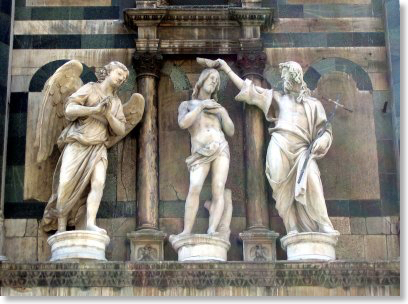
With the Baptism of the Lord we come to the official end of Christmastide, and we end as we began, with a Mystery that challenges all our preconceived ideas about how things ought to be. God made man should not have been born in a stable, should he? No more should Jesus Christ, the Saviour of the World, have been baptized by John. John himself was reluctant, but Jesus countermanded him, saying , "Let it be so for now. We must do all that righteousness demands." (Matthew 3.15) With that answer we are given a glimpse into the relationship between Father and Son and are reminded, yet again, that God does not see as we see.
St Ephrem (who died c. 373) wrote a magnificent hymn about the Baptism of the Lord. (It is hymn XIV if you want to read it for yourself.) Ephrem begins with the hiddenness of the Messiah: "The Bride was espoused but knew not who was the Bridegroom on whom she gazed: the guests were assembled, the desert was filled, and our Lord was hidden among them." Then follows a lengthy dialogue between Jesus and John in which all John's objections are overruled, one by one, "'Small is the river whereto Thou art come, that Thou shouldst lodge therein and it should cleanse Thee. The heavens suffice not for Thy mightiness; how much less shall Baptism contain Thee!' 'The womb is smaller than Jordan; yet was I willing to lodge in the Virgin: and as I was born from woman, so too am I to be baptized in Jordan.'"
Gradually, the themes unfold: the espousal of the Church to her heavenly Bridegroom, the forgiveness of sin through baptism, the gift of priesthood, and finally, the revelation of the Trinity:"The heavenly ranks were silent as they stood, and the Bridegroom went down into Jordan; the Holy One was baptized and straightway went up, and His Light shone forth on the world. The doors of the highest were opened above, and the voice of the Father was heard," This is my Beloved in Whom I am well pleased." All ye peoples, come and worship Him. They that saw were amazed as they stood, at the Spirit Who came down and bore witness to Him. Praise to Thy Epiphany that gladdens all, Thou in Whose revelation the worlds are lightened!"
Ghiberti's sculpture of the Baptism of the Lord is outside the baptistry in Florence. One has to look up to see it: the angle is awkward, the pigeons are a nuisance, it is not how we are accustomed to seeing depictions of the Baptism. But for me, it expresses the divine paradox we have returned to again and again during the Christmas season, "Father, through the lowliness of your Son, you raised up a fallen world." That is more than a point of view. It is Salvation Incarnate.
Courage and Cowardice
Constable Peadar Heffron was grievously injured yesterday when a bomb exploded under his car on the Milltown Road, Belfast. The attack was both cowardly and vicious in the fullest sense of the word. The perpetrators (thought to be dissident republicans) exposed themselves to minimal risk, but the lives of their victim and their victim's young wife will be changed for ever by what they did. (At the time of writing, Mr Heffron's survival is by no means certain.) What Colophon chokes on is the fact that this act was carried out by people who, presumably, had at least a nominally Christian education, who grew up in a society in which both civil and religious law assert that the unjust taking of life is wrong. So, we have a cowardly act by cowardly people and the whole world is diminished by it.
Contrast that story with one from Portsmouth. Angela Mahon was being driven to hospital to give birth when the car she was in became stuck in the snow. As her contractions worsened, she knew she had no choice but to walk. Dressed only in her nightclothes, she walked the rest of the way, arriving at the hospital covered in snow and saying, "Help, I'm in labour." This story has a happy ending, with the birth of twin boys a few hours later; but the comments Angela made to "The Portsmouth News" are revealing: "I was so scared . . . I was really panicking. I think I was in shock. I just wanted to get there for the twins." I don't know whether Angela Mahon has any religious beliefs, but what she did was genuinely courageous and self-sacrificing. Real courage takes risks, and knows the risks it takes. It puts others first. Above all, it is life-giving whereas cowardice is death-dealing.
What can the Churches do to encourage a culture of life rather than a culture of death? The public pronouncements of our religious leaders are often thoughtful but can sometimes seem inept, out of touch or even crass, perhaps because the language used is, by and large, no longer a language the world understands or values. Having said that, I am reminded of Chesterton's remark that it is not that Christianity has been tried and found wanting but that it has never been tried. Perhaps those of us who claim to be Christian need to try harder, to show by our actions that we really believe what we say we believe. It isn't easy to be brave, to stand up to hostility or derision or risk our own comfort or ease, but on the whole I think it preferable to causing others to weep because we have been cowards.
Numb Brains

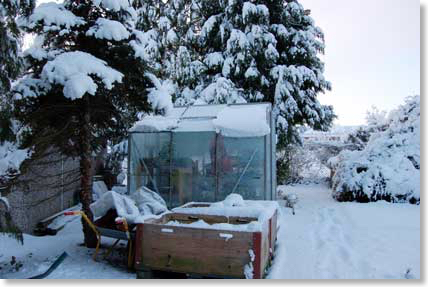
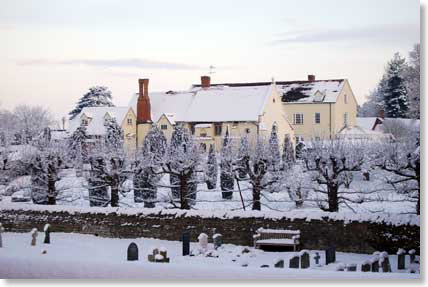
Plans Awry
Why do we find patience so difficult? Is it because we want instant solutions, instant results (even in prayer); so when we don't get what we want, we behave like spoiled children and go off in a huff, with a metaphorical flick of our hair and a metaphorical stamp of our feet? Or is it because we just don't see how patience can lead us to a deeper union with Christ? We haven't time, we say, we are too busy. Now, one of the funny things about time is how elastic it is. A five-minute wait can seem like eternity, while a whole day spent with someone we love can go by in a flash.
For many of us in Britain the snow and ice are giving opportunities we hadn't expected to change gear, to reconsider. We can't get on and do some of the things that last week looked important, even urgent. Here in the monastery we have had to reschedule meetings and journeys that have been in the diary for months. Other things have come to take their place, like clearing paths and dealing with burst pipes in church: not nearly so "important" as what we've had to cancel, but not things we can put off.
The key point about patience is not what we are asked to do but how we accept what is asked of us at any given moment. God, as we know, has an inconvenient habit of seeing differently from us. We can choose to co-operate, or we can refuse. Ultimately, patience is about preferring God's will to our own. Our plans may have gone awry, but His may not.
Snow

Sheep may safely graze, but only because the farmer has been out dropping feed. The scene by Hill Farm at eight o'clock this morning.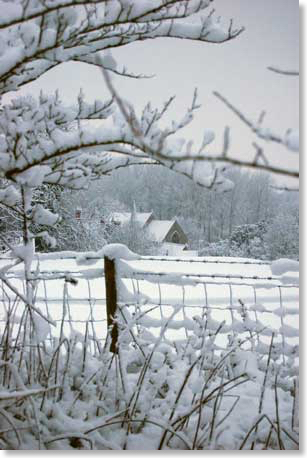
St Mary's Church glimpsed through the hedge a little later. The silence was almost complete, suggesting that the A34 rush-hour didn't happen this morning. Snow is a very effective muffler of sound, so Digitalnun began thinking of all her favourite quotations about snow, ending with "Soft as roosting birds falls the snow". That one is from scripture. If you have nothing else to do today because you can't get to work, why not spend half an hour looking at references to snow in the bible? You might be surprised how many there are.
Update: we have just heard of the death of Mgr Graham Leonard. Please pray for the repose of the soul of this great priest and pastor, for the consolation of his widow, Priscilla, and for his many friends who mourn his passing even as they rejoice that his sufferings are at an end. Requiescat in pace.
Clergy Unions
Religious authority is difficult to get right. For the believer, obedience is a good thing, but it means taking a huge risk. We may believe that God's authority is mediated through human beings; but human beings, as we know, tend to get things wrong. When someone charged with authority identifies his/her own will with that of God, the consequences can be terrible. (When someone not charged with authority identifies his/her will with that of God, the results can be equally dire but they are not invested with the religious significance of episcopal/clerical utterance.) Benedict was well aware of this tendency, of course; but the checks and guards he provides for the monastery only really work when everyone agrees that they should and is genuinely seeking the good of all in a comparatively small society. The exercise of authority in the wider Church can be more complicated. Injustices do occur and are not always righted. Part of the trouble, I suspect, is the high value we place on "autonomy". Autonomy is a fine thing when everything is going well, but when it isn't, "Quis custodiet ipsos custodes?"
Light
New Year resolutions are probably already looking a little limp, but perhaps we could spend a moment or two today asking how far we have allowed ourselves to become strangers to the natural rhythms of night and day, the season, even our own bodies (hands up those who went to bed last night muttering that they had spent too long in front of the television?). The connection with prayer may not be immediately obvious, but one of the first requirements of the contemplative is to look and take notice, to allow God the opportunity to speak. And when God speaks, things happen.
Epiphany 2010

Epiphany is one of my favourite feasts, steeped in beauty and mystery, with many levels of meaning. The Magnificat antiphon reminds us of the miraculous ways in which Christ manifested his glory. "We honour the day adorned with three miracles. Today a star led the Magi to the crib; today water was made into wine for the wedding-feast; today Christ willed to be baptized in the Jordan." Thus, Christ showed his glory to the gentiles, prepared the Church as his Bride and made holy all the waters of the earth, taking away our sin. There in a nutshell is what Incarnation and Redemption is all about. Theology expressed as poetry, music and ritual is probably the only way some of us can begin to grasp such sublime Truth.
Life is not all theology, however. One of the things that keeps me Catholic is the fact that it is such a cheerful religion: it doesn't fudge death and judgement, heaven and hell; doesn't promise (contrary to what many believe) an easy forgiveness for sin; but it does allow us to be human and to take seriously what it means for God to become human also. As an Englishwoman, I especially like the way in which it lets us use humour as a means of approaching God and the things of God.
The photograph above from Autun shows a medieval sculptor's idea of the Magi on their way to the crib: all three cosily tucked up in bed, two of them with eyes fast shut, the third being gently awoken by an angel touching his little finger and pointing out the star they must follow. Medieval ideas of the majesty of kingship crumble before this tender portrait. It too tells us something about Epiphany. The King of Kings and Lord of Lords is as humble and approachable as a baby in a manger; and who would not smile at such a welcome and welcoming thought?
Larkin Was Wrong
Macrina the Younger was not satisfied with turning Basil's life around: she had a profound effect on the life of another brother, Gregory of Nyssa, also a saint. (It is from Gregory that we learn of Basil's early worldliness. Given Gregory's love and admiration for his sister Macrina, we may wonder whether there was a little fraternal exaggeration of Basil's shortcomings.)
Basil was also lucky in his friends. St Gregory Nazianzus (also known as Gregory Nazianzus the Younger: names in this period are disappointingly repetitive) was devoted to him and wrote a rather fulsome life which contains much interesting detail. A later, painful estrangement only served to highlight the closeness of the earlier years of their friendship. He was not always so lucky in relations with his superiors who sometimes felt overshadowed by his gifts, and there were periods of exile and estrangement which must have cost him dear. Basil's letters provide fascinating insights into his many undertakings, his disputes, his concerns and his enthusiasms. It is, of course, as a promoter of coenobitic monasticism that he is particularly honoured by Benedictines, with the Long and the Short Rules both being important sources.
It is, however, as a child positively influenced by his upbringing that we might think of Basil this morning. His life is an encouragement to parents unsure of the effect they are having on their offspring. It is even more of an encouragement to elder sisters (especially bossy ones). I wonder if that holds for monastic communities, too.
A New Year
How different all this was from what we had planned. It is good to begin a New Year with the realisation that we are not in charge, that "there's a divinity that shapes our ends/ rough-hew them how we will." For some that is a stumbling-block, something to be feared and rebelled against; for others, it is a freedom, a liberation from the tyranny of believing that we must do everything ourselves. Perhaps 2010 will be the year when we all finally learn that human pride and folly are destructive and undergo a change of heart, what Christians call "conversion". We none of us know what this year will hold; but the community here will be constant in prayer, please God; and prayer, as we know, can achieve great things.
May God grant you your heart's desire this year, and more important, His heart's desire for each one of you.
(Podcasts will resume when one of the community can manage a few words without splutters.)
Holy Innocents
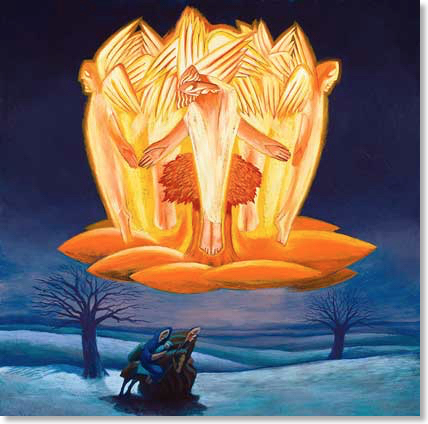
The Flight into Egypt by Nicholas Mynheer
Copyright © Nicholas Mynheer. Reproduction prohibited.
Used here by kind permission of the artist
Today's gospel is Matthew's account of the flight into Egypt. When I first typed those words I wrote "light into Egypt" which not only seemed peculiarly appropriate but also called to mind the above painting by Nicholas Mynheer. No, I am not going to "explain" the symbolism but just let you meditate on all the imagery suggests. You can find more of Nicholas's work at his new web site, http://www.mynheer-art.co.uk/
Christmas 2009
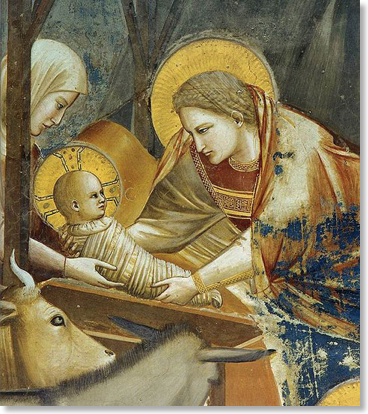
VERBUM CARO FACTUM EST
We wish all our oblates, associates, friends and cybervisitors
a very happy Christmas.
May the Prince of Peace fill your hearts and homes
with joy and gladness.
We shall keep you in our prayers.
Mass will be offered for your intentions
on Monday, 28 December.
THE WORD WAS MADE FLESH
JOY TO ALL THE WORLD
Christmas Eve 2009
One of the most beautiful parts of the Christmas Eve liturgy is the singing of the Martyrology which situates the birth of Christ in time and place. When we reach the words "All the earth being at peace . . ." the music becomes more and more intense, until finally the Incarnation is announced on a falling cadence. When God has uttered his Word, there is no need for further speech.
No need for further speech, true, but we continue to babble because we are afraid of that mysterious silence out of which the all-powerful word of God speaks. Somehow we need to recover a little interior silence to allow what we celebrate to remain at the heart of all we do and say. It won't mean our being any less genial, nor, alas, less busy, but it might make Christmas less stressful because we shall be more relaxed about the inevitable gap between expectation and reality, especially the expectation we have of ourselves.
If that seems paradoxical (relaxed? at Christmas?) just remember, Jesus was content with very little: a shelter, his mother's milk, somewhere to lay his head. We do not have to be perfect to pease him, nor do we have to be perfect to please others. Those we love are lovable with all their shortcomings; so are we. Married, single, widowed, divorced or separated; alone or with others; as a member of a religious community or as a hermit; we need to slow down (yes, slow down!) and lose ourselves, just for a moment or two, in wonder at the nearness of our God. "Tonight is born for you the Saviour of the World." Let us be glad and give thanks.
O Emmanuel
Today's Mass readings are Malachi 3. 1-4, 23-24 and Luke 1. 57-66. The responsorial psalm is taken from psalm 24, and, instead of the antiphon of the day, O Emmanuel, we have a version yesterday's (O Rex Gentium). Once again Colophon will be perverse and consider the Mass readings in the light of O Emmanuel, the last of the Great "O"s.
According to Malachi, the advent of the Lord was to be preceded by the coming of his messenger, the prophet Elijah. The identification of Elijah with John the Baptist was made by the Lord Jesus himself ("I tell you solemnly, Elijah has come…") but it is easy to see in Luke's account of the Baptist's ministry parallels with that of Elijah, especially in that fiery zeal for God which must have been so uncomfortable for his listeners. But it is the end of today's gospel passage which draws our attention. "'What will this child turn out to be?" [the people] wondered. And indeed the hand of the Lord was upon him."' Here, just before the birth of Christ, we are asked to consider the birth of his forerunner, the man who would prepare the way for him. John's birth was strange and there is a sense that something stranger still is about to take place. Who could have foreseen that the Son of God was about to be born? We know that John will be driven out into the desert by his love for God; that he will live on the margins of society, dress in weird garments and live on an austere diet; that he will be fearless in proclaiming the truth, challenge the kings of this world and pay the price exacted for such courage; that he will point his own disciples towards Christ and rejoice that he himself must diminish. And all because "the hand of the Lord was upon him."
Tonight's antiphon prepares us for the coming of Christ by heaping upon him titles which explain who he is and what he has come to do. As King and Law-giver he fulfils the promise of the Old Testament; he is the one for whom, whether knowingly or unknowingly, the whole of humanity (= the gentiles) has been longing; he is the Saviour of all. It is as Emmanuel, God-with-us, that we invoke him and ask him again to come and save us.
O Rex Gentium
Today's Mass readings could be described as a celebration of the Magnificat, a sustained exposition of Mary's song of praise. We begin with 1 Samuel 1. 24-28, the story of Hannah's dedication of the infant Samuel to the service of the Lord; as responsorial psalm we sing her song of triumph, 1 Samuel 2. 1, 4-8, on which so much of the Magnificat is based; the alternative gospel acclamation echoes the O antiphon of the day, O Rex Gentium, while the gospel is the Magnificat itself, Luke 1. 46-56.
What are we to make of all this joy and gladness? Why do we exult? Surely it is because we have been given a rare privilege. For gentile Christians being adopted into the "family of God", sharing in the promises made to his Chosen People, and coming to know Jesus Christ as Lord is something beyond our wildest dreams. When we look at our Saviour, we can say with Hannah, "This is the child I prayed for, and the Lord has given me what I asked"; and with Mary, "The Almighty has done great things for me; holy is his name." At our baptism we received the gift God offered us, made our profession of faith (or had it made for us by our godparents) and so were welcomed into the community of believers, the Church. We were baptised into Christ's death that we might rise with him to newness of life. This is the new creation we sing about with such wonder and gratitude. Of course, we "know all that"; but these last days of Advent are a good time for reminding ourselves of truths that sometimes slip from view. Just as the snow is making us look at the world about us with fresh eyes, so the liturgy can help us focus anew on the miracle of salvation.
Tonight's O antiphon provides an exquisite setting for the Magnificat. It expresses our deep longing for redemption and recalls the act by which the Lord Jesus opened the way of salvation to all. Jew and gentile have been made one through his sacrifice on the Cross. He has become the corner-stone because he alone can save, can breathe new life into those he formed from the dust of earth.
O Oriens
Today at Mass we read either the Song of Songs 2. 8-14 or, as we do in community, Zephaniah 3. 14-18, and the account of the Visitation we had yesterday, Luke 1. 39-45, with verses from psalm 32 as responsorial psalm. The gospel acclamation ignores the O antiphon for the day and instead provides shortened forms of those for 20 and 23 December. We shall not do likewise because to address Christ as the Morning Star (O Oriens) on this, the shortest day of the year in the northern hemisphere, is symbolic of our hope both for this world and the next.
The exuberant joy of the passage from Zephaniah finds a lively echo in the gospel. Neither Elizabeth nor John can contain their gladness at the nearness of their Lord, and although we do not read the next few verses of Luke today, we know that they contain Mary's own hymn of rejoicing, the Magnificat. There is a world of difference between such Spirit-filled outpourings and the forced jollity of some of the "worship songs" inflicted on innocent congregations. But the presence of such delight in God begs the question. How often do we receive the gospel as Good News? How often do we welcome the coming of God as cause for celebration? Too frequently, I suspect, we are a little piano, unwilling to risk all that admitting God into our lives "with no holds barred" may involve. We prefer the dimness of the familiar and safe to the brilliance of the unexpected.
Tonight as we sing the Magnificat antiphon, hailing Christ as Splendour of Eternal Light and Sun of Justice, we shall be reminded that we are children of light, not creatures of darkness. As Christians we are, so to say, professional risk-takers, ready to be light-bearers in any and every situation. It requires effort, of course, just as it required effort on Mary's part to be a Light-bearer to Elizabeth; but only so can our prayer embrace the whole human race, "Come and free those sitting in darkness and the shadow of death."
O Clavis David
This is the day on which, throughout the Benedictine world, a sermon or talk known as the Missus Est is traditionally given to the community, in keeping with the gospel for 20 December, Luke 1. 26-38. It is not difficult to link the Annunciation with the antiphon O Clavis David, but the readings of the Fourth Sunday of Advent take precedence over the ferial ones; so instead of the Annunciation, we are invited to reflect on the Visitation, Luke 1. 39-45, together with Micah 5. 1-4, Hebrews 10. 5-10, and verses from psalm 80.
Unusually, all three Mass readings focus attention on the body of the one we are awaiting. There is the mysterious prophecy in Micah of "the time when she is to give birth gives birth"; in Hebrews there are references to the "body you prepared for me" and "the offering of the body of Jesus Christ once for all"; and the gospel has Elizabeth's lyrical outburst, "Blessed are you among women, and blessed is the fruit of your womb! And how does this happen to me, that the mother of my Lord should come to me?" while the unborn John the Baptist senses the nearness of his God and dances for joy in his mother's womb.
This concentration on the sheer physicality of birth and the "bodyliness" of the Lord Jesus should make us think. We do not worship a God who is somehow "out there", remote, uninterested, uninvolved. On the contrary, we worship a God who, in Christ Jesus, has experienced what it is to be human, who has promised to be with us always, to the end of time. As Christopher Smart said so well, he is "a native/Of the world he made." He is also, as Isaiah prophesied, the Key of David, the Sceptre of the house of Israel, to whom all authority in heaven and on earth has been committed; but unlike many politicians who strut about the world's stage, sometimes leaving things a little better but often much worse, not culpably or intentionally but because their interests are limited to their own time or their own country (think Copenhagen), Jesus' ambition, so to say, is cosmic. There is nothing and no-one beyond the scope of his love and mercy. He wants to free us from the prisons we have made for ourselves, the grubby little sins and shabby half-truths that prevent our becoming what he desires us to be. Tragically, we often prefer a half-life in chains to living fully the glorious freedom of the children of God. If we could only believe how much he loves us, we could pray with perfect confidence "come and free from prison one who sits in darkness and the shadow of death."
O Radix Jesse
Today at Mass we read Judges 13. 2-7; 24-25 and Luke 1. 5-25, with verses of psalm 70 and a shortened version of O Radix Jesse before the gospel. Once again we reflect how God brings life and hope where previously there was only death and despair. The theme of the barren woman miraculously made fertile is found throughout the Old Testament and lies at the heart of the promise made to Abraham and Sarah. The birth of Samson and of John the Baptist belong to this genre and have some striking parallels. The appearance of the angel of the Lord, the giving of the promise (only half-believed by Zechariah), and the setting apart for God's service of the child who will be born (indicated in both cases by the requirement to live as a nazirite, abstaining from wine and strong drink) can blind us to differences which are perhaps even more telling than the similarities.
The Lord blessed Samson, his Spirit moved him, but Samson's ultimate failure was as tragic as his vocation was heroic. There was no such failure with John. He did indeed inherit the spirit and power of Elijah, was filled even from his mother's womb with the Holy Spirit and proved great in the sight of the Lord. ("I tell you solemnly that among those born of women, there has arisen none greater than John the Baptist.") Yet we know that, great as John was, his role was to point to someone greater still. Mary would not doubt the angel's message but embrace God's will with joyful alacrity (genoito moi kata to rhema suo has much more eagerness in it than our rather feeble "Let it be done to me according to your word" can convey), and God would work in her a wonder the world had never seen before and never would again. Jesus would be born of a virgin, not a barren woman; and he would prove to be the true Deliverer of Israel, before whom kings would fall silent and in search of whom the gentiles would come.
How does this tie up with O Radix Jesse? The symbolism of the antiphon is clear enough, but Paul helps to articulate the theology underpinning it, especially in Romans 15. 8-13. He says Christ became a servant of the Jewish people to maintain God's faithfulness by making good God's promises to the patriarchs and by giving the gentiles cause to glorify God for his mercy. He quotes Isaiah also, for Christ is that scion of Jesse who will rule over the gentiles and in whom they will place their hope. What is this promise to Israel, this mercy shown to the gentiles, this hope we all share? Surely it is freedom from sin and death and the enjoyment of eternal life made possible through the sacrifice of Jesus Christ on Calvary? The Messiah for whom Israel has prayed and longed is become the Saviour of the World. All the jangling discordances of humanity are quieted; the divine harmony is restored; but here on earth we have yet to experience the fullness of redemption. So we pray, "Come and free us; delay no longer!"
O Adonai
For today's Mass readings we have Jeremiah 23. 5-8 and Matthew 1.18-24, with verses from psalm 71 and an abridged version of O Adonai as the link between them. The passage from Jeremiah is fascinating. Here is a portrait of true kingship; honest, wise, full of integrity, instilling confidence and enabling Israel to live in perfect freedom. This vision of messianic kingship is realised in Christ Jesus, who is indeed the "virtuous Branch of David", the fulfilment of the psalmist's dream. He is also to be identified with the all-Holy One who appeared to Moses in the burning bush, who gave the Law on Sinai and saved the Israelites with outstretched arm, just as the outstretched arms of the Lord Jesus on the cross brought salvation to all the world.
The gospel reading contains lots of difficulties for scripture scholars but we can derive much to think about without becoming too narrowly academic. Here we have a second Joseph, a man of dreams and integrity like the first, but one who, as a descendant of David, can confer on the Son who is to be born of Mary, all the privileges and expectations of his royal ancestry. There is something very likeable about Joseph. He is perplexed by Mary's pregnancy, tries to find a human solution to the "problem", but is utterly accepting of the angel's reassurance and command. No wonder he has become a model of Christian obedience. What draws our attention here, however, is the name disclosed to Joseph: Mary's Son is to be named Jesus, Joshua, because he is the one who is to save his people not from material slavery but from slavery to sin. We have entered into a new order of creation: God's ideas are so much bigger than our own. Well may we pray that he will come and save us with his outstretched arm.
O Sapientia
So it is with a cheerful conscience that we turn to the Mass readings for inspiration. Today we have Genesis 49. 2, 8-10 and Matthew 1. 1-17, together with Ps 71 and a curiously abridged version of O Sapientia as the Gospel Acclamation. The opening prayer of the Mass, with its breath-taking "may we share in the divinity of Christ, who humbled himself to share in our humanity", will still be ringing in our ears when we hear the gospel. Some people find the Old Testament genealogies tiresome. Even the genealogy of Christ is sometimes read as though it were meaningless. But today we shall be reminded forcefully that God became man in Jesus Christ, that he came of an ordinary human family, and like all of us, had a few skeletons in his family cupboard. Look at some of the names in Matthew's list and you will see what I mean: alongside the great and good are the decently obscure and a few instances of what we might most kindly call folly.
We begin, of course, with Abraham, our father in faith, and go on through the patriarchs, some a little dodgy it is true, but made respectable by their antiquity; but what about Rahab? A prostitute is not the kind of ancestor most people glory in, unless she happens to be the paramour of kings. And Ruth, why, she wasn't even Jewish. David may have been the great hero of Judaism, the kind of king Israel hoped to find in the Messiah, but his son Solomon was born of adultery with Bathsheba. Only when we come to "Joseph the husband of Mary; of her was born Jesus who is called the Christ" does this long list of begetting reach its end. With Christ we come to the perfect fulfilment of creation, of everything the Divine Wisdom brought into being; and it is Christ whom we shall invoke tonight under the title of Wisdom and ask to come and teach us the way of prudence.
Zoom, Zoom
Digitalnun is pleased about this choice as she already uses the H4N's baby brother, the HandyZoom, to record podcasts for our web site and is enthusiastic about the audio quality which can be obtained. She may not be quite so enthusiastic when she realises that to replace all the recording equipment used by our volunteer readers (i.e. the people who record the texts for us) is going to cost around £6,000, but never mind, Christmas is coming and one can always hope. Replacing the recorders will enable us to introduce phase 1 of our changeover to mp3 files and CDs and memory sticks. Introducing DAISY CDs for more complex books will take a while longer, not least because the kind of equipment needed is more expensive and the process involved more complicated, but at least we can expect to make a start in 2010.
Meanwhile Technonun is continuing to research OpenSource library software for the audio library. Perhaps someone reading this could make a suggestion about which would be most suitable? We have under 1,000 audio titles at present, but we need to keep track of who has what as well as maintaining a proper catalogue, preferably online as well as in St Cecilia's itself. We have two volunteers who are willing to do the keying-in for us and we don't want their enthusiasm to evaporate while we dither. We'd prefer a little more "zoom, zoom" all round, in fact.
Tuesday
The trouble with Advent is the difficulty of matching expectations with reality. We want to give more time to God, to prepare thoughtfully for the coming feasts of Christmas and Epiphany, and we know that silence and solitude are important aspects of that. But we can't opt out of the busyness of life which seems so much more intense at this season of the year, and we certainly can't refuse to answer the doorbell unless we have hearts of stone (which perhaps we do: awful thought). The alternative is to embrace the busyness, to see it as part of the preparation. In other words, to stop railing against the demands on our time and energy and accept them as the way in which we are enabled to celebrate properly, a necessary part of our sanctification.
I am a long way from having achieved that myself. I am quite sure I shall continue to go to bed each night mentally comparing my "to do" list with my "have done" list and fretting about the discrepancy. I am equally sure, alas, I shall continue to be grumpy whenever someone asks me if I could "please just" do something or other. I'll continue to wake up most mornings looking like a lemur. BUT, I also trust that somewhere, somehow, in the midst of all this apparent failure, grace will be at work, that even what I see as failure can be transformed; is, in some small way, part of God's plan for my life and the lives of those with whom I come into contact, so that when I come to celebrate Christmas, it will be as a humbler, possibly less selfish, person than would otherwise have been the case. I hope so; I really hope so.
Conditor alme siderum
Opinions differ as to the hymn's authorship. Some ascribe it to St Ambrose himself, others more cautiously credit it to "Anon. seventh century". Either way, in just five classical Ambrosian quatrains plus a doxology, the writer gives us an overview of salvation history, all the more powerful for being expressed with great simplicity and economy: Christ himself is the creator of the stars of night, the light of all believers, who came to save a fallen world under sentence of death; as Bridegroom of the Bride, he came at evening time from the spotless womb of the Virgin; now all creation acknowledges him as Lord and awaits his Second Coming and the Day of Judgement. These are the great themes of Advent and the melody of the accompanying chant, haunting in its simplicity, is one of the most beautiful in the repertoire.
For those who would like to ponder the hymn as lectio divina, the text, translation and music are given below (click on the icon to download the PDF). Finding a non-copyright recording has been more difficult. We tend to sing the hymn as taught by our mentors, with a light, almost dancing movement (hence shooting stars . . .). There is a slightly ponderous recording from Belo Horizonte here. Best of all, however, would be for you to learn to sing the hymn yourself. If plainchant is new to you a good place to start is the excellent Musica Sacra site.

Conditor download
There is a recording of our latest Virtual Chapter on the podcast page. We now know that the echo chamber effect is caused when someone uses an inbuilt computer microphone rather than a headset, so technically this last recording is a great improvement on 28 November's. The next Chapter will be in the New Year.
This week's prayer podcast is on the podcast page. Gaudete!
Surprise, surprise!
One of the questions we face during Advent is what kind of God shall we be welcoming at Christmas? The Jesus born at Bethlehem wasn't the kind of Messiah many in Israel had been hoping for, and my guess is that he won't be the kind many of us are hoping for today. The daily Mass readings for Advent express our longing for redemption but also make us aware that the Saviour we are awaiting is going to be very different from anything the world has ever known, and we prefer the familiar. Perhaps the cribs being prepared in many of our churches can teach us something we need to learn again and again. If we have a tendency to think of God as always enthroned on the cherubim, to think of him in nappies forces us to admit the enormity of his humility and graciousness. Our (limited) ideas have to go if the (infinite) reality of God is to make any impression. It won't be a comfortable experience, but falling into the hands of the living God never has been, has it?
Reminder: Virtual Chapter today at 11.00 a.m. GMT
Chapter 58
Benedict assumes, of course, that there will be a steady stream of people knocking at the door of the monastery and asking for admission. In Europe that has not been the case for several years. Some communities have died out, others have dwindled in numbers. The "explanations" offered by those who have never lived monastic life often seem shallow. The plain fact is that those of us who do live a monastic life are not very good at communicating what is so wonderful about it. The reasons for that are many and various, but one must ask whether we sometimes lack conviction and are therefore not convincing. For myself, I can only say that I find monastic life my natural element, a pearl of great price, something I want to share with others; but I am happy to leave the outcome to God.
Perhaps we should have devoted tomorrow's Virtual Chapter to the subject of vocation but we've received quite a lot of questions about prayer and how the internet helps or does not help spread interest in and information about religion, religious life and kindred topics; so, if you are free to join us at 11.00 a.m. tomorrow, let us know what you think. Hopefully, Digitalnun will not be locked out of the system this time so the Chapter will go ahead at the intended hour!
A Bright Spot in the Gloom
Conviviality
Today's brief chapter of the Rule reminds us that the monastery ought to be a place of conviviality, of shared life, where guests are welcomed to our table as they are to our liturgy and other aspects of monastic life. We have three separate groups meeting here from 2.30 p.m. onwards and the community will be working flat out to be welcoming, to give each visitor time as well as the endless tea/coffee/biscuits which seem to fuel church gatherings. Inevitably, the question will arise: is what we are doing a bit irrelevant? Budget cuts, climate change, family concerns are all much closer to people's hearts than anything we may be discussing in our meetings. So why do we bother?
I think the clue lies in the word conviviality: feasting, shared life, is never very attractive to the outsider, the onlooker. One has to be involved, to take part. The challenge for us as a community is the same as for the Church as a whole. We need to draw people into the life we share in Christ, and we can only do that if we are living that life as deeply and generously as possible through prayer and sacrifice as well as service. Advent is a good time to ask ourselves whether we are so busy giving out that in reality we have nothing of value to share. The answer may shock us into reassessing how we live. It won't make the budget cuts any less painful; it wont solve the problems of global warming; but it might, just might, make us nicer to know: real Christians, in fact.
Immaculate Conception of the B.V.M.
Magnificat was begun on the feast of the Immaculate Conception 1999. The Immaculate Conception of the B.V.M. must be one of the most misunderstood feasts in the calendar. Even Catholics tend to stray into unconscious heresy when asked to explain what it means. What the Catholic Church actually teaches is that "the Blessed Virgin Mary in the first instance of her conception was preserved exempt from all stain of original sin by a singular privilege and grace granted by God, in view of the merits of Jesus Christ, the Saviour of the human race." (Apostolic Constitution Ineffabilis Deus, 8 December 1854) In other words, Mary, although conceived and born like the rest of us, was not cleansed from original sin by baptism as we are but was preserved from such sin because of the merits of her Redeemer, Jesus Christ. Maximus of Turin uses a lovely phrase, he talks of "original grace" at work in her in contrast to original sin at work in us (see Nom. viii de Natali Domini). Mary was not exempt from the temporal penalties of sin such as pain and death, nor was her sinlessness something she herself achieved. It was entirely the gift and grace of God, a fruit of the redemption wrought by our Lord Jesus Christ. Only he can save us from sin. Thinking of the Climate Change Conference currently taking place in Copenhagen, I am tempted to add, only he can save us from ourselves.
Advent II
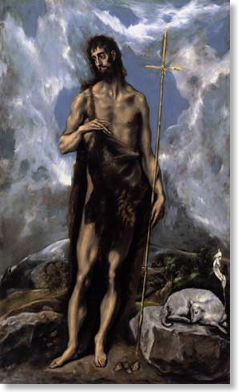
The Second Sunday of Advent takes us out into the desert with John the Baptist and that lonely Voice urging us to prepare for the coming of the Word. There is something immensely attractive about John which this painting by El Greco conveys better than any words. We see the saint in a rocky landscape with a diffuse light about him. Everything except John's face seems to resolve into triangles, even the sheep near his feet. A distant city at the foot of the mountain is shrouded in gloom, but there is a beautiful light playing on the cross John holds in his hand, and on his face, the only truly rounded shape in the whole painting, there is a radiance and sweetness which is utterly compelling. El Greco has captured both the gentleness and the loneliness of Christ's Forerunner, the contradiction of the prophet in every age.
Today also happens to be the anniversary of the wreck of the Deutschland, which inspired Hopkins' greatest poem. I suspect John's prayer was very like that of the dying Franciscan, '"O Christ, Christ come quickly" since he was, as Daniélou perceptively remarked, "a one-joy man". For those of us whose hearts are not quite so focused, there are these lines, especially the last, to offer encouragement:
I kiss my hand
To the stars, lovely-asunder
Starlight, wafting him out of it; and
Glow, glory in thunder;
Kiss my hand to the dappled-with-damson west:
Since, tho' he is under the world's splendour & wonder,
His mystery must be instressed, stressed;
For I greet him the days I meet him, & bless when I understand.
Saturday Shopping
For those already exhausted with pre-Christmas shopping there is an alternative on Saturday, 12 December, when we shall be hosting another Virtual Chapter. Talkshoe has explained that they were rebooting their servers when we scheduled the last one (if only we had known!). Let's hope for better things next week. We have received a number of questions about prayer so will make that a major theme, but you are welcome to suggest other topics. It is helpful but not essential to submit questions/suggestions in advance.
Finally, Digitalnun recently came across an ebook she made ten years ago. It's entirely possible it may appear on our Digital Books page on 8 December. Can anyone guess what it is?
Craftmanship

Yesterday Benedict spoke to us about the oratory. Today and tomorrow he speaks to us about guests. The two subjects are closely linked, especially for Benedictines, because the God whom we seek in prayer is to be encountered, reverenced and served in those who come to our door (which in our day includes the digital door). It can be difficult to get the balance right, and many a monastic community has lamented the demands of hospitality and sought to limit or distance its guests. The truth is, of course, that once one sees hospitality as an expression of love of God and love of neighbour, talk of "balance" begins to seem inappropriate. Purity of heart, that ability to recognize what God is asking and respond to the sacrament of the present moment with alacrity and generosity, becomes much more central. Here at Hendred we do our best to be welcoming but we are aware of our failures. "The life so short, the craft so long to learn" can apply to monastic living, too.
RB 52: On the Monastery Oratory
We all need a sacred space but comparatively few have the luxury of an area devoted only to prayer and worship. We have to cultivate instead an inner space, a holy ground of mind and heart, with time we reserve for God alone. The Lord Jesus understood that. When he told his disciples to go into their inner room and pray, he must have meant withdrawing into the inner chambers of the heart since there were few private rooms in first-century Palestine.
I think we can apply what Benedict says about the monastery oratory to this inner space, this sacred time. We need to value the time we devote to prayer, ring-fence it round with a little selfishness even to ensure that it becomes as regular a part of our life as breathing. Reverence and silence on our part are fundamental attitudes but we tend to learn them gradually and have constantly to relearn what we thought we already knew. During Advent we have the example of John the Baptist waiting in the wilderness for the appearing of the Saviour. Perhaps his family thought of him as being lost to them during that time, possibly wasting his life. These days before Christmas can be "wilderness days" for all of us, but they do not have to be lost days. Prayer is never a waste of time.
Just to show that we are not above a little commercialism in a good cause ourselves, here's a reminder about John and Penny's Christmas Book Sale this afternoon. Enjoy!

Preparing the Liturgy
Redecorating the oratory has had to be postponed because of work pressures, but we are delighted to record the purchase of a Glastonbury chair for use by the presiding priest at Mass. Handynun put it together on Saturday with much muttering about its being properly made, no glue anywhere, nice patina under the grubbiness, and so on and so forth. Even after a preliminary cleaning and waxing it looked very good; and the monks who said Mass for us on Monday and Tuesday both declared it "very pleasing" so we are distinctly gruntled. Our friend Neville has made a new oak base for the processional cross which is a great improvement on the metal one, so we have begun Advent feeling that the oratory looks much more dignified than before. Next we must think about replacing our red lectern fall (which is looking a little sad) but this is a good time of year to be looking for red fabric. Reindeer and Fr Christmas patterns not required.
Advent 2009
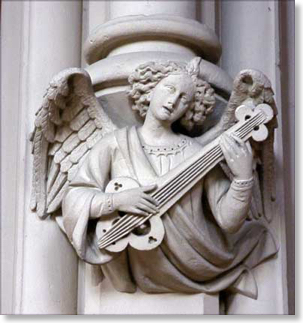
We begin Advent with three days of as near-perfect silence as we can manage, to allow time for reflection on the mystery of the Word who became man for our sakes. Choir continues, of course, and the angels are allowed to sing (think Hilton, angel-song . . .) but otherwise we try to keep speaking and writing to a minimum. So, no blogging and no tweeting until Wednesday unless there is some overwhelming reason for doing so.
Our podcast for the first Sunday of Advent will be found on the podcast page.
Finally, our apologies to all who had difficulty getting into the Virtual Chapter on 28 November: Digitalnun was locked out of the system for half an hour and when she was finally allowed in, there were some "audio issues". Beelzebub having his own back perhaps? We are grateful for all the positive feedback and will arrange another Chapter in a fortnight's time, on Saturday 12 December, when we'll explore the subject of prayer. There is a partial recording of the 28 November discussion on the podcast page.
The Virtual World
There are, however, important questions about the relationship between the real and virtual worlds we all need to consider. Readers of Colophon know we have a strict policy regarding the blog. It only gets updated when we have time. So, too, with other aspects of the web site. Indeed, the only part of the site unfailingly attended to is the prayerline, which is given the same priority as requests for prayer received in any other way. For us, these self-imposed restraints are a way of ensuring that the virtual never becomes a substitute for or an escape from the real. Not to have an online presence, however, seems tantamount to not existing. The Catholic Church is slowly waking up to that fact and has been consulting the likes of Google and Facebook (but not Twitter!) about how to improve its e-cred.
Digitalnun would have loved to have been a fly on the wall at the recent (12-15 November) Vatican conference on the internet. Some of the published statistics are revealing, showing a rather half-hearted embrace of what is possible. Lots of cardinals and bishops are happy to blog and Youtube apparently, but an amazing 70% of church-based web sites have no interactive features. Monsignor Jean-Michel Di Falco, bishop of Gap, made an eloquent plea for a cadre of Web 2.0 savvy priests to re-evangelize the (real) world, using a flurry of high-flown metaphors which read well in French but are slightly bathetic in English. "Pope, cardinals, bishops, priests, lay people - with the Internet we enter a marketplace, a free and spontaneous space where everything is said about everything, where everyone can debate everything," he concluded. Is it my imagination, Monseigneur, or did you forget about nuns?
Shame
The worrying thing about the publication of this report is that we may not learn the lessons. In our revulsion at what has happened we may simply condemn the whole Church as being corrupt from top to bottom, holding those presently serving responsible for what occurred in the past. That is dangerous, typical of the lack of historical perspective now common in our public debate. As members of the Church we can acknowledge the sinfulness of what has been done, express our sorrow and shame, our determination not to allow similar things to happen in the future (present Safeguarding procedures in this diocese, for example, are excellent though no procedure will ever be sufficient protection against someone determined to do wrong). We can also seek to make reparation in some way, but we cannot undo what has happened, cannot, I think, apologize in any meaningful sense for what we ourselves had no part in. Sin remains sin although redeemed. Many, however, will expect an apology; will demand that we all be held responsible; will assume that what happened in Dublin happened elsewhere. No doubt there will be a rush of legal cases seeking financial compensation. Given the tacky concern of some to preserve their financial assets at all costs, that may seem fitting, but am I alone in recalling that when similar cases occurred in the diocese of Boston it was the poor who suffered most from the closure of Church schools and hospitals (oh, and the sisters, whose convents were sold to pay the debts incurred by the diocese)? If one good deed can have untold consequences, so, sadly, can an evil one; and it is always the most vulnerable who suffer.
Web Conference
Preparations are under way for our second public Virtual Chapter at 2.00 p.m. GMT tomorrow. There is still time to submit a question/topic for discussion (or you can make your point live during the Chapter). Several of the questions sent in concern the living of a Benedictine spirituality in the world, so tomorrow we shall explore some of the following:
- how can a lay person "live" the Rule of St Benedict?
- how can a lay person live a life of prayer?
- does being an oblate help?
- why are Benedictine communities all so different?
- why did you become a nun?
Thanksgiving 2009

The Bow in the Clouds: East Hendred 8.30 a.m. 26 November 2009
Thanksgiving Day is a good idea. Here is Digitalnun's personal grateful list for 26 November 2009: for family and friends, especially the awkward ones, and life in community; Duncan's comical nose, snuggled into his blanket; the soft gleam of the sanctuary lamp and the quiet of the oratory; books spilling into every corner; night-scented stock still blooming against the wall; the shock of cold water; grey light on the horizon; the busy patter of squirrels in the roofspace; the De Profundis chanted trustingly at Vigils; fresh bread baking in the kitchen; a manageable inbox; the promise of another day. For all, Deo Gratias.
Update: Coming back from walking the dog at 8.30 a.m. we saw this double rainbow in the sky over Hendred House (you can just make out the second bow at the east end of the house). The bow in the clouds is a sign of God's first covenant, a covenant made with the whole of creation. Something more for which to give thanks.
Confused Standards?
What is the role of the Church in this? No doubt there will be supportive statements from our leaders, condemning this and applauding that. Diocesan departments will beaver away producing strategies to ensure that all involved in active ministry conform to "best practice", but there is a danger that most of this will wash over our heads. Values are not instilled by legislation. Law has a directive as well as compulsive force, true, but it is up to us as Christians to show by our whole manner of living what we hold dear, what we believe to be the right way of relating to God, people and the world around us. That applies to those of us who live in monasteries as much as to those who live in the world. To be honest and truthful will always be costly; to be prepared to stand up to bullies will always mean running the risk of a bloody nose or worse; but ultimately, trying to live by the standards of the Lord Jesus means we can sleep easy o' nights, because we shall be at peace with him and with ourselves. No confusion there.
Tantrums in Choir
St Clement of Rome
One has a similar feeling standing in the basilica of San Clemente. Above ground all is beauty: the mosaics are luminous, there is light and air and the incessant chatter of tour guides and their charges. Down below, in the gloom of the Mithraic shrine we touch a darker world altogether. From time to time we need to be reminded of that world because something of its darkness infects us all at times. I had not noticed until today that we read RB 44 on St Clement's feast. The ritualisation of making amends Benedict gives us in that chapter is powerful. So often we think a cursory "apology" will make up for a wound we have dealt another. Unfortunately, just because we have decided it is time to forgive doesn't necessarily mean the other thinks so, too. Benedict, like Clement, knew that it takes time to heal such injuries, but healed they must be because a wound left to fester will do untold damage to the Body of Christ. Peace may begin with a smile, but it is only a beginning.
Solemnity of Christ the King
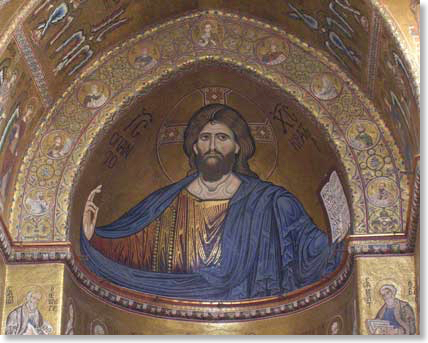
On this last Sunday of the Church's year, we celebrate the Solemnity of Christ the King. One suspects few now read Quas primas, Pius XI's 1925 encyclical establishing the feast and his reasons for doing so. The concept of the kingdom or reign of God and of the kingship of Christ was by no means novel, it is after all entirely scriptural in origin; but what was perhaps new was Pius XI's impassioned insistence that the evils under which the world was labouring were attributable to the fact that people had abandoned Jesus Christ and his holy law and that there could be no lasting peace unless individuals and nation states returned to what he called "the Empire of our Lord". For many today the language of kingship and empire is unacceptable, indeed outmoded. Does that mean that the theology underlying this feast is also outmoded? If we look at the preface for the day, we find a very clear exposition of the major themes:
Father, all-powerful and ever-living God,
we do well always and everywhere to give you thanks.
You anointed Jesus Christ, your only Son,
with the oil of gladness,
as the eternal priest and universal king.
As priest he offered his life on the altar of the cross
and redeemed the human race by this one perfect sacrifice of peace.
As king he claims dominion over all creation,
that he may present to you, his almighty Father,
an eternal and universal kingdom:
a kingdom of truth and life,
a kingdom of holiness and grace,
a kingdom of justice, love, and peace.
And so, with all the choirs of angels in heaven
we proclaim your glory and join in their unending hymn of praise . . .
The kingship that we celebrate in this feast is a sacrificial kingship based on truth, holiness and grace, which makes possible for us a life of justice, love and peace. Can such a kingship ever be "outmoded"?
Reminder: all podcasts are now located on the podcast page.
Dies Memorabilis 2009
Our relaunched veilshop has already sold a chasuble, which is very pleasing, and we have received a number of questions/suggestions for the next Virtual Chapter on 28 November. Some we shall probably hold over as it makes sense to group ideas according to general themes, but we'll see. In the meantime, SOMEONE is preparing a podcast for the Solemnity of Christ the King. As for me, at some point I think I shall allow myself half an hour with Catullus. Life in a monastery is not all duty. As Newman once remarked, it is the most poetic of pursuits, though I'm not sure what he would have made of my choice of recreational reading.
Moonlight and Mammon
More prosaically in the service of Mammon (no mulled wine or mince pies on offer, unlike at Moonlight Publishing), Veilshop has just been relaunched. We have only put a few items up for sale at the moment and are limiting shipping to the U.K. until we get round to that web site makeover which seems to be receding ever further into the future. If you encounter any problems with the shopping cart, please let us know. Even the most exhaustive testing sometimes seems to miss some snag or other.
Lest you think our thoughts are wholly this-worldly, on Wednesdays during Advent we shall be holding Advent Liturgy preparation sessions at 2.30 p.m. and again at 7.30 p.m. in the monastery library. We'll be looking at the Sunday Mass readings and prayers as a way of preparing for Christmas. As always, these sessions are open to anyone who wishes to come along and refreshments will be served. Please pass the word on to anyone you think would like to know about them. Advent is such an important season and passes so quickly that it's good to take a little time, if we can, to explore what the liturgy offers us.
Finally, advance notice that Vespers on Sunday 22 November will be said privately (i.e. not open to the public) as the prioress is off to Choral Evensong at St Peter's College, Oxford, where she has been invited to preach. References to dogs walking on hind legs will not be appreciated!
Vocation Questions
Many ask why vocations seem to be few in England yet flourishing elsewhere, something we find difficult to answer since both call and response are gifts of God. (We who are monks and nuns might nevertheless ask ourselves some hard questions about our communities and whether we inspire others or simply live off a reputation from the past that is no longer valid). It can be quite informative to spend a little time looking at some of the web sites younger people turn to when they are thinking about vocation. Inevitably, there is interest in the more "accidental" features of monastic life: the form of the habit, photos/videos of profession ceremonies, descriptions of monastic practices (the odder the better) and views of buildings (the older the better, it seems: wonder if our gothick cellars qualify?). None of this is in the least bit unexpected or troubling. What is deeply troubling is the burden of debt so many young people seem to be under and which holds them back. Some communities are rich enough to be able to help but I suspect that most in this country aren't. Perhaps these are question for the wider Church in England: how much do we value religious life; what can we do to help those whom God calls? Is religious life now on the endangered list, and would it matter if it disappeared?
It would be interesting to know what you think.
In Praise of Caxton
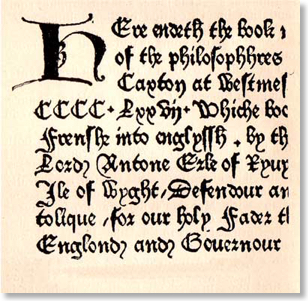
On this day in 1477 William Caxton issued the first book in English actually printed in England, or so we believe. It was Dictes or Sayengis of the Philosophres (Sayings of the Philosophers) translated from the French by Anthony Rivers, second Earl Rivers, a learned man and brother-in-law of Edward IV, beheaded in 1483 by the future Richard III. The colophon (detail illustrated above) is fascinating. It shows type trying to look like handwriting but with some ugly word spacing and contrasting weights of letter-forms. Having said that, the page is remarkably evenly inked, while the use of punctuation (a Cistercian innovation of some centuries earlier) makes the text easy to read. No wonder many in Westminster were deeply worried about this new technology. It was to have a great future. You wouldn't be reading this if it hadn't.
One of the developments of Web 2.0 we particularly welcome here at Hendred is the renewed interest in typography, specifically typography for onscreen use. Our current site is typographically merely "functional" but there are many examples of really beautiful work on the web which is quietly raising standards. Sadly, many people are happy to stick to Arial (probably the worst typeface ever designed in our unprejudiced view) or Times (an excellent typeface, but over-used) or "don't see what all the fuss is about". It is the latter which sends Digitalnun into despondency. If you want to know why, read Beatrice Warde's little gem on the importance of typography, The Crystal Goblet. It will open your eyes.
St Gertrude of Helfta
That last sentence shows how different some saints are from ourselves. We are very conscious of our rights, of our dignity. We react with outrage if those rights are infringed (it may help if a tabloid comes along to record our outrage, but not all are so "lucky"). Nothing wrong with that, of course, until we look at our Lord Jesus Christ and mark the dignity of the Man of Sorrows. Then we can begin to feel uncomfortable, feel that we are strutting about like the proverbial cock on a dunghill. It is difficult to combine modesty about ourselves with a proper sense of our own worth as children of God, created in his image and likeness. St Gertrude was shaped and formed by the Rule of St Benedict, and I think her sense of herself as simultaneously the worst of sinners yet redeemed by grace is attributable to her having absorbed the Rule's teaching on humility. Only the truly humble can keep the two in tension. Like Luther, she knew herself to be simul pecctor et iustus, or as Hopkins put it
I am all at once what Christ is, | since he was what I am, and
This Jack, joke, poor potsherd, | patch, matchwood, immortal diamond,
Is immortal diamond.
Coal and diamond are both forms of carbon. I wonder which you and I are, don't you?
Washday Blues
Where does the cheerfulness come from? I'd like to think it stems from a sense of purpose, from a lively faith, a warm charity and a genuine hope. I suspect it may also have something to do with the prospect of a nice, quiet monastic Mass for St Edmund of Abingdon (co-patron of our diocese) and a decent dinner afterwards! We are not angels yet. Of course, we also have some unexpected blessings to smile about. Yesterday, coming out of Mass, a parishioner gave me an envelope. Inside was a very generous donation towards our work for the blind and visually impaired. That means a lot to us because keeping St Cecilia's going as a free service is high on our list of priorities but we have faced completely empty coffers before now. People tend to assume that all religious communities are well-off. If we were, I think we'd be a different kind of community, but I hope we come some way towards realising Benedict's ideal of the monk as one who "lives by the work of his hands as our fathers and the apostles did". That is not to downplay the importance of the help we receive from friends and benefactors, far from it, but it can be comforting to others to know that the community faces similar challenges to everyone else.
So, washday blues are not part of the agenda for today, or any day for that matter.
Special Gifts
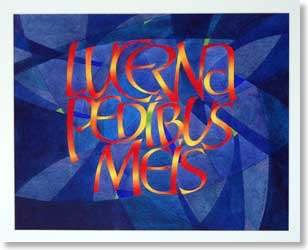
Sunday is always special in a monastery, the gift of a day which has its own unique character. Although in one sense we are busier than ever, with a more elaborate liturgy and a commitment to more prayer and reading than on ferias, there is a silence and spaciousness about Sunday which is a valuable corrective to the rush and racket of the rest of the week. Visitors often drop in, and somehow there is always time to share a cup of tea or coffee with them, even if the cook is going quietly demented in the kitchen and the dog is indicating that he wants some "me time" out on the Downs.
Yesterday I spent a few moments looking at a special gift we received earlier this year. When we began planning our guest room, we asked our good friend Martin Wenham if we could commission him to do a painting. (if you take to heart what Benedict says about treating guests as though Christ, you will understand that only the best is good enough. Add to that the prioress's inconvenient and potentially expensive preference for original works of art over Catholic kitsch, and you'll see we couldn't put just anything on the wall.) Typically, Martin produced a painting which he simply gave to the community. The reproduction above does not do it justice. It shimmers and shines as the light changes and is a beautiful reminder of the friendships God brings into our lives to enrich and sustain them.
Today we shall receive another special gift. "Someone else" is doing the cooking, and she-who-cooks-Sunday-lunch every week in the interval between Mass and Midday Office is sending up unseasonal "alleluias" as she contemplates all that she will do, or rather not do, with the time this generous act of a friend will give her.
Gifts don't have to be complicated to be special. They don't have to be huge or expensive, though they always cost the giver something. One of the gifts I remember best may strike you as a mere nothing, although the memory of it has stayed with me for years. I was working late in a University Library on a sweltering hot summer's day and the Librarian looked exhausted. As I returned a book and thanked her, she gave a brilliant smile. A smile like that can only come from the pure in heart, from those who see God and reverence Him in others. "Smile Sunday" anyone?
This week's prayer podcast will be found in its new position on the Podcast page. There is also another talk on the Talks page, by Dr Annette Goulden OCDS on St Thérèse of Lisieux.
Virtual Chapter Update
If anyone wishes to hear how our first experiment went, you can listen again by clicking on the widget in the sidebar here or the one on the podcast page.
The echo effect you can hear at times was caused by one of our participants having set his output volumes a little high, but that is easily remedied. There was more use of the chat option than is likely to be the case in future (we were trying to help people get online), hence some of the silences. All we need now is some feedback and questions/ideas/suggestions for any future events. Thank you to those who have already given encouragement. We were very apprehensive!
Now Saturday can be a "normal" day. One wonders what it will hold. Scroll down to comment . . .
All Benedictine Saints 2009


Salve festa dies! Rather a lot of people to celebrate today, from St Benedict himself, Father of Western Monasticism, to Dorothy Day, Benedictine Oblate and Servant of God. (Before anyone asks, the stages of canonisation, or official proclamation as a saint in the Catholic Church, go Servant of God–Venerable–Blessed–Saint).
One of the things I like about Dorothy Day is the fact that she was so honest: about her life ("Don't call me a saint – I don't want to be dismissed that easily"), her temper ("I hold more temper in one minute than you will hold in your entire life"), and God ("If I have accomplished anything in my life, it is because I wasn't embarrassed to talk about God"). She was certainly never held back by embarrassment in any sphere, and thank God for that. She was prickly and prophetic, utterly centred on Christ.
Honesty is very closely linked to the humility St Benedict saw as the foundation of monastic living. It isn't easy to be honest. Most of us make all sorts of accommodations and compromises to shield ourselves from the truth, even though we know, deep down, that letting the Light into our lives is the only way to freedom and peace. St Benedict urges us everyday to open our eyes to the light that comes from God. Isn't it encouraging that we have so many men and women as different as Benedict and Dorothy to show us the way?
News and Views
The Virtual Chapter
What is a Chapter? some have asked. Chapter is the name given to a meeting of the monastic community. Usually, as tomorrow, there is some form of input such as a reading from the Rule of St Benedict followed by a short talk from the superior, then a discussion, which may or may not be linked to the input. The kind of things discussed vary enormously: business matters, the admission of candidates to community, liturgy, discipline, anything that affects the material and spiritual well-being of the community. Some of our own chapters have been about the way in which we should use the internet and the limits to our involvement. Tomorrow, it's largely up to you, the participants, what we discuss.
To take part you will need:
- Headphones for listening (or turn the volume of your speakers up)
- A microphone for talking (if you have a Mac you can use the built-in one)
- click on the widget on our home page or in the sidebar of this blog OR
- paste this link into your browser http://www.talkshoe.com/tc/69374
Blind leading the blind:
To begin with, you'll find that you are "muted", i.e. you won't immediately be able to talk. That will give us time to welcome you, and you time to explore the TalkShoe™interface if you are unfamiliar with teleconferencing. After the introductory talk, you'll be invited to speak. We'll guide you through the process if you need any help (that's the blind leading the blind bit). Then it's over to you. Digitalnun will try to ensure we don't all speak at once but please be patient as she is a novice at this kind of thing and will probably get muddled, poor old thing (Mouse, you have much to answer for).
If you miss the Chapter:
If you miss the Chapter, you'll be able to listen afterwards as it will be recorded. Just click on the widget again and you will be able to hear the recording.
A shared Cloister:
We have it in mind to hold a number of themed sessions on vocation, liturgy, prayer and so on but we'd really like feedback so that we can work on what might be genuinely useful. We also want to keep things simple and low cost. If you find tomorrow's session worthwhile, please spread the word. Spreading the Word being, of course, what it's really all about.
Meandering Thoughts
Martin was an ascetic. In fact, even his contemporaries sometimes wondered whether his tendency to have visions was the result of overlong fasts; but he was a man of deep and genuine compassion, always ready to emerge from his solitude to plead the cause of his people or come to their aid. He understood very well that his monastic retirement was not for himself alone. His ability to live on very little taught him to be aware of the need in others.
At 11 o'clock this morning we shall be remembering the causes of the First World War, and how the seeds of the Second were sown in the punitive settlement that ended it. The desire to make Germany pay meant that, ultimately, everyone paid. Perhaps there is a message here for all who exercise power. Conflicts begin because we want something we don't have but think we have a right to, and they go on because we forget that winning is not the whole story. A wilderness is not peace. Sometimes sacrificing "victory" is the best way to ensure that history does not repeat itself.
And what of Benedict, the man of peace? The Benedictine motto is the word peace (pax) surrounded by a crown of thorns. It reminds us that peace is a struggle, that it requires a daily renunciation of all that is not peace, of the disordered desires that so often make us unhappy. Above all, I think it reminds us that for a Christian peace can only be attained through union with the sacrifice of our Lord Jesus Christ, who "did not count equality with God a thing to be grasped but emptied himself, assuming the condition of a slave". And all for love of us.
Anglicanorum Coetibus
O Blessed Virgin Mary, Mother of God and our most gentle Queen and Mother, look down in mercy upon England, thy dowry, and upon us all who greatly hope and trust in thee. By thee it was that Jesus, our Saviour and our hope, was given unto the world; and He has given thee to us that we might hope still more. Plead for us thy children, whom thou didst receive and accept at the foot of the cross, O Sorrowful Mother. Intercede for our separated brethren, that with us in the one true fold, they may be united to the Chief Shepherd, the Vicar of thy Son. Pray for us all, dear Mother, that by faith, fruitful in good works, we may all deserve to see and praise God, together with thee in our heavenly home. Amen.
My second thought was, this is a generous document and I hope it will be received as such.
The preamble is important because it sets out very clearly that the papal offer is made in response to a perceived pastoral need; the pope's concern is, as always, for the unity of the Church. This is his solemn duty. Throughout the document there is an awareness that the Catholic Church does not act apart from the Orthodox in certain matters, a point worth making because some developments in other churches have been made in isolation, thus calling in question their understanding of the nature and practice of authority. There is clarity also about the Catechism of the Catholic Church being the authoritative statement of the Church's faith, while the Ordinariates are placed under the Congregation for the Doctrine of the Faith. This will reassure those who have been worried by some of the wilder speculations we have read recently. Reassuring, too, will be the statement that former Catholic priests who left to exercise ministry as Anglicans will not be eligible for reinstatement as Catholic priests in the new Ordinariates.
The arrangements for priestly formation, for liturgical continuity, for religious communities and so on are generous and repay careful study. There will be much picking over the details, especially as regards the admission of married men and the permission now given for priests to have secular jobs in order to support their families, rather as Anglican non-stipendiaries currently do and as Catholic "Worker Priests" used to do. Unspoken here is the recognition that should large numbers of Anglican clergy choose to become Catholics, there isn't enough money to support them and their families in a decent manner.
As one might expect, the relations between the Ordinariates and the Bishops' Conferences are given several paragraphs. There are some real surprises here. The principle that bishops should be unmarried is maintained but married former Anglican bishops are, apparently, to be allowed to attend meetings of the relevant Bishops' Conference (where they will be accorded the status of retired bishops) and, if they so petition, allowed to use episcopal insignia (pectoral cross, ring, etc.) As a lapsed medievalist, I can see plenty of scope here for ecclesiological wrangling. Indeed, one of the questions I keep coming back to is, what is a bishop, what is his function in the Church? I hope I won't give offence if I say that the concept of the "flying bishop" has always been troubling to me (for theological rather than pastoral reasons, which I understand), while the use of episcopal insignia by one who is not regarded as a bishop I find confusing. Perhaps the concept of the "mitred prelate" is a valid analogy.
Anyway, I am sure that there is already masses of comment much better informed than Colophon's. We must continue to pray because no matter how good everyone's intentions are, no matter how hopeful everyone is that we will all obey the promptings of the Holy Spirit, the human cost will be huge. I notice that the Apostolic Constitution was signed on the feast of St Carlo Borromeo and issued on the feast of the Lateran Basilica, anniversary of the day the Berlin Wall came down. Significant?
Virtual Chapter
Virtual Chapter
Secondly, at 4.00 p.m. GMT on Friday, 13 November, God willing, we shall be hosting our first Virtual Chapter using TalkShoe™, a teleconferencing service based in the U.S.A. There will be a short talk from the prioress on the feast of the day (All Benedictine Saints), followed by an opportunity for discussion. As this is our first attempt at a Virtual Chapter, please bear with us as we struggle to master the technology and hit the right buttons. Digitalnun will be quite ruthless about muting anyone who tries to hog the conversation or causes annoyance to others, but if all goes as we hope we'll certainly introduce more online sessions.
How to take part
There are two main ways of taking part over the internet using VOIP (Voice Over Internet Protocol) so that you do not incur the expense of a telephone call to Pittsburgh.
(1) If you wish only to listen/use the live text facility (which allows you to type your comments in real time), you can click on the TalkShoe badge in the sidebar of this blog to connect over the internet or you can paste this link into your browser http://www.talkshoe.com/tc/69374. (2) If you wish not only to listen/text but also to talk, you should (preferably) first download the TalkShoe Live software (which is free) and follow the instructions for installing it on your computer (Mac or Windows) then make use of the integrated ShoePhone application to join in.
If you don't want to use VOIP, you can, of course, use an ordinary landline or mobile to connect, but please check call charges before you do so as we wouldn't want anyone to incur an unexpected telephone bill. You would need to telephone the U.S.A. (724) 444-7444 and add the call series ID which is 69374.
TalkShoe™ Software
You can read more about TalkShoe and download TalkShoe Live software here. A guide to taking part will be posted the day before the Virtual Chapter in case anyone is still confused.
Prayer Podcast
There is no podcast this week but when the series resumes, the link will be found on the Podcast page, not Colophon. We need a more logical grouping of media files. At present our site reflects the fact that, like Topsy, it "just growed", and as we add more content navigation becomes more complex. Not a good idea!
Remembrance Sunday 2009
 The sound of half-muffled bells from Worcester Cathedral on Remembrance Sunday is always evocative and brings back memories of snatches heard across the water meadows. It is one of the few days in the year when all fifteen bells are rung and those who know about such things get terribly excited about musical tenths. For us, it is simply part of the sound of Remembrance Sunday, along with blood-red poppies and the moving sight of former servicemen and women laying wreaths in memory of the fallen. This year hearts will be heavy with the knowledge that loss of life continues. The Great War to end all Wars ushered in another, and many have followed since.
The sound of half-muffled bells from Worcester Cathedral on Remembrance Sunday is always evocative and brings back memories of snatches heard across the water meadows. It is one of the few days in the year when all fifteen bells are rung and those who know about such things get terribly excited about musical tenths. For us, it is simply part of the sound of Remembrance Sunday, along with blood-red poppies and the moving sight of former servicemen and women laying wreaths in memory of the fallen. This year hearts will be heavy with the knowledge that loss of life continues. The Great War to end all Wars ushered in another, and many have followed since.Have you ever asked yourself what is going on during the Two Minutes' Silence? Many will be thinking about family members or comrades they have lost, or the pity and horror of war in general; others will be praying for all who have died in war and for those who grieve or suffer as a result; others again will be asking God to guide us into the ways of peace. But what will God be praying? If the question startles, consider. When we pray, we tend to concentrate on our part in the prayer and forget God's. We cry out to him readily enough in moments of sorrow and distress but how rarely do we hear God crying out to us? We are not good at listening, still less good at acting on what we hear because we know that what God says may challenge us in ways we would rather not be challenged.
Today is not only Remembrance Sunday, it is also the anniversary of Enniskillin. Those of us who remember that horror were deeply impressed by Gordon Wilson's willingness to forgive the brutal murder of his daughter. Wasn't that an example of someone listening to God's prayer and responding with a generosity most of us could never match? Perhaps this morning during the Two Minutes' Silence we could humbly await God's word rather than filling the silence with our own clamour. He knows and understands our need, and only he can turn our hearts to better things. If our prayer is powerful with God, shouldn't his prayer be even more powerful with us?.
Day of Recollection
Now, there's a very interesting phrase in that sentence quoted above: if you "just". How often do we hear "if you just" or "could/couldn't you just" and know that we are in for something the speaker either does not realise, or is not willing to admit, will be anything but "just"? In the practical sphere it may be something like, "Well, couldn't you just fit these 3 pages of closely written A3 sheets into an A5 flyer for me?" Answer, "Yes, if we may delete at least 95% of what you have written" which usually leads to a wobbly. Or, discussing the manifest deficiencies of another, "I don't see why he doesn't just . . . .", when it must be perfectly obvious why he doesn't "just" whatever.
It all becomes more serious when it is God who is "just" asking something of us. One sees it in monastic life. People give up all the big things — marriage, family, career — then stumble over something as small and inconsiderable as being required to eat one kind of food when they prefer another. Of course, it is not God who is asking this directly of the monk or nun; but living a common life is part of our response to God's invitation to become a monk or nun. It is quite easy to opt out of the common life, to make little accommodations that gradually whittle away the substance of what we have vowed. If we "just" do this or that it may not amount to much in our own eyes, but when it comes to evaluating something we need to look with God's eyes, not our own. Most of us are not called to do great and glorious things for the love of God, we are "just" called to get on with the business of everyday, and do whatever it is we have to do with love and fidelity. The ladies of the C.W.L. are a wonderful example of "just" being good Catholics. A reminder, if we need one, that life and death, heaven and hell, can all turn on that little word, "just".
(N.B. We don't know why comments are disappearing from this blog: the problem seems to be with JS-Kit as others have reported the same. We'll investigate.)
Bonfire Night
Of course, we are in the heart of Thames Valley Recusant country here. From our terrace one can look across to the medieval chapel of the Eyston family which has never been out of Catholic hands since it was built in 1256. Mapledurham, Milton, Stonor, all are within a short distance, while Campion and Challoner are names to conjure with for their local associations as well as their place in history. I mention this because one of the more amusing aspects of recent comments on the forthcoming Apostolic Constitution (thank heavens for some light relief amid the turmoil) is the belief that Catholics in this country have no history, or at any rate, none worth talking about. On the contrary, we have an interesting history, shadowy in parts it is true, but fascinating to those who can identify with it. Digitalnun was regaling us with the darker side of her family's activities in the sixteenth and seventeenth centuries. Apparently, they stuck to their guns (those who know Digitalnun will understand that it's in the genes) and had some slightly dodgy characters like John the Monk (an ex-monk of Canterbury, pensioned off after the Dissolution) among their number, but then made the fatal mistake of meddling with politics. You can guess the rest.
Colophon does not advocate the view that the Church should steer clear of politics. On the contrary, the Church must necessarily be engaged wherever people are. It will always be difficult to decide how that engagement should be worked out and mistakes are bound to occur, but today we can salute all those who, at various times and in various ways, have tried to make the world a better place through their political service. Guy Fawkes' solution isn't one that appeals to us nowadays, especially since we have become all too familiar with the use of terror and murder as political weapons, so perhaps we might spare a grateful thought for those whose quiet integrity gives the lie to the belief that politicians are universally corrupt. Remember what ten just men might achieve and pray for all our politicians.
Supernun
By the time we have reached a certain age, most of us suffer from various delusions, one of the most deadly (literally) being that we must always say "yes". This affects Christians of all kinds, and is especially prevalent among the clergy and members of religious communities. It is easy to see why. We so want to be always ready to do the will of God and devote much time and effort to trying to discern what He is asking. We know He often speaks through those with whom we come into contact so we are always on the alert. Those of us who have "signed up" to an obviously full-time commitment often allow a very human element of guilt to creep in when faced with demands that tax our strength. Are we doing enough? Dare we say "no"? The problem is that we cannot always handle the reactions of others if we do say "no". We can be imprisoned by fear, and that is quite the opposite of the freedom love confers. A cowardly "yes" is morally no different from a cowardly "no": it just sounds better. And we all like to be liked.
So, Digitalnun, who is not Supernun, has a proposal to make. Let's make today a day on which we all take stock, not of the demands we make on others nor of the demands others make on us, but of the demands we make on ourselves. How far are they consistent with what we are called to be? Are they really a covert source of pride? Little tin fig leaves we create for ourselves which ultimately are rather ridiculous.
All Souls
All Saints
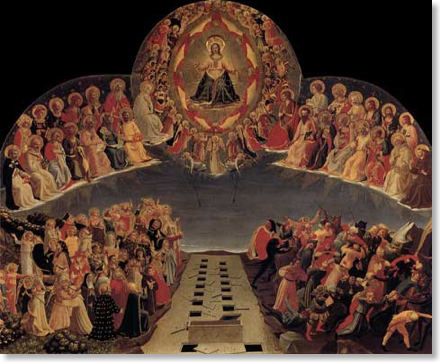
One picture is worth a thousand words, although, of course, it takes words to say that. So, here is a a favourite Fra Angelico and a podcast about the Solemnities of All Saints and All Souls.
Of Saints, Spooks and Serendipity
So where does the serendipity come in? Think communication, think Church, saints in heaven, saints on earth . . . the song of the saints . . . Are you with us yet? Here's a clue. Regular readers know we intend to make changes to this site. This will be the last week-end that the weekly podcast will be linked to the blog page (we're hoping our oldest nun will do the podcast this week but she doesn't know she's being asked yet, so please don't let her know). The podcast is moving because we have a great new feature we are hoping to introduce in November: the virtual Chapter. This will give anyone who wishes an opportunity to listen via VOIP (i.e. via their computers, no call charges) to a live talk from one of the community followed by a live discussion over the ether: an opportunity to visit the monastery without actually making the journey. Initial tests have been encouraging so we have tentatively scheduled the first Chapter for the afternoon of 13 November (All Benedictine Saints). We are allowing fifteen minutes for the first session and will see how it goes. All you need to take part is a computer with internet connection, speakers or headphones (i.e. some way of listening), and if you want to take part in the discussion, an inbuilt microphone or one you can hook up to your computer. Full details will be posted; if no-one joins us, it won't matter because as everyone knows, contemplative nuns can talk the hind legs off the proverbial donkey given half a chance.
In the meantime, may you all have a blessed time celebrating what God has done in and for His people. Pray for the lonely, the bereaved and those who may find some aspects of this week-end a little frightening. "Cliffs of fall. . . hold them cheap who ne'er hung there". (A lazy misquote, but you get the drift.)
The Penal Code in RB
Cloister Updates

Excellent talk on St Thérèse by Annette Goulden last night. We'll be putting it up on our Talks page once we've been through the recording. As a Child Psychiatrist, Annette made a good case for Thérèse's having survived what was, by any standards, an extraordinary childhood to become a woman of rare confidence and courage, far removed from the sickly-sweet "Little Flower" of popular myth. Another group expected today and more people at the week-end, so the kitchen is piled with dishes waiting to be cooked or frozen as appropriate. Next week-end we have a group wanting a day on Hildegarde of Bingen so we have elected the prioress to give a talk on her. The news was greeted with a dangerously "blotting-paper" look, so we wonder what we have let ourselves in for. The new choir psalters are proving a success: much better layout and printing than heretofore, although the paper is not all it might be. The garden is still full of colour, which is a joy, and last Sunday's short talks after Mass on the work of St Cecilia's have resulted in some generous offers of help. More about that at a later date. So, life continues as usual, with various activities going on in different parts of the monastery, all held together and given coherence by the regular round of prayer and worship largely unseen (or not adverted to) by those outside the cloister. Thérèse wanted to be love at the heart of the Church. Perhaps for a Benedictine it is a case of wanting to be love and praise at the heart of the Church.
A Death A Minute
To talk about the discipline of psalmody might seem like evidence of an arcane and distant spirituality, a sign that the Church, or at least the monastic part of the Church, is far removed from the realities of life. Perversely perhaps, I think the opposite is true. One does not enter a monastery to flee the world's problems but to embrace them at the deepest possible level and bring them to God in prayer. For a Benedictine, the psalmody of the Divine Office prayed hour by hour, day by day, week in, week out, is the context in which this prayer is articulated by the Holy Spirit and taken up into the great High Priestly prayer of Jesus Christ. The psalter reflects so many moods and concerns, including our moments of doubt and rebellion, bewilderment and pain. Yesterday evening, when news of the Baghdad bombs had reached us, the psalms of Compline with their infinite trust in the goodness of God were the prayer we most wanted to utter. Evil cannot ultimately triumph. Death is not the end of the story. The eternal God is our dwelling-place and underneath are the everlasting arms.
No podcast this week as Digitalnun has nothing to say and the rest of the community is "unavailable for comment".
Fear of Rome
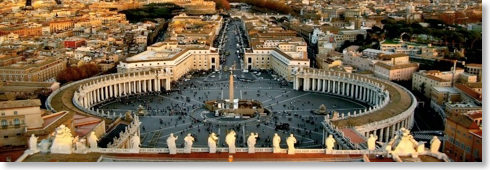
The last few days have been thought-provoking for those who believe in both freedom of speech and what our grandmothers would have called "civilized behaviour". At the risk of sounding hopelessly fuddy-duddy, I must admit I don't believe that everything one thinks or feels should be expressed, especially if hurtful to others; nor should the way in which it is expressed intentionally give offence. I presume everyone with any heart or brains deplores the antics of the BNP, but the rumpus over Nick Griffin's appearance on "Question Time" (which, being TV-free, we did not see) seems equally deplorable to me. Similarly, many of the comments on the forthcoming Apostolic Constitution and the questions now facing many Anglicans have been, to say the least, ill-judged and wounding. We have returned to the polemics of the sixteenth and seventeenth centuries, but without the magnificent language in which insults were then traded. It makes one wonder what we Christians really do believe if we treat one another so badly. Perhaps I should take Colophon's advice and devote myself entirely to prayer and reflection, but there is one point on which it may be possible to say something constructive. My remarks concern the situation in England where Anglicans greatly outnumber Catholics and the Church of England is the Established Church.
A major strand running through both Anglican and Catholic reactions in this country has been fear of Rome and what she is "really" doing. We have had talk of "poaching" and "undermining", righteous anger, unholy glee, and everything in between. One has sympathy with those who feel the announcement was made in an awkward way, but would the timing and manner of such an announcement ever have been "right"? The simple view, that the pope has taken at face value the requests made to him and responded by saying, "Very well, we will welcome you Anglicans into Full Communion, if you wish, and allow you to retain many elements of your spiritual tradition" is too simple for most. Some Anglicans who have dreamed of this for years are, now the offer has been made, asking themselves whether it is what they wish after all (I base this assertion on responses from a few of my own Anglican friends). Some Catholics are quietly uneasy about how an influx of former Anglicans would change the complexion of the Catholic Church in England. Others are wondering whether all those considering the pope's offer are aware that plurality in liturgical and disciplinary matters does not extend to doctrine. The novelty of the canonical structures the pope has proposed has taken everyone by surprise, yet I would argue that it is the most hopeful and reassuring element in the whole mix.
The Catholic Church is often portrayed as a top-down organization, rigidly hierarchical. I have to say, from my own experience, that it is not. Every Catholic has the right of recourse to Rome. It isn't a question of going through endless bureaucratic channels: it is direct and immediate. A few years ago, when faced with a difficult question of conscience, I went to Rome to ask advice. The Prefect and officials of the Congregation I consulted were immensely helpful and thanks to their innovative approach, the outcome was positive. The whole process showed me a very human side of the Church, of people anxious to help others, prepared to create new structures to meet new situations, a welcome sidelight on the pastoral concern that underlies canon law. Benedict XVI's pontificate has demonstrated a similar willingness to respond to pastoral needs with new canonical solutions. Some have not been an unalloyed success, witness the continuing difficulties with the SSPX, but they make one hope that the working out of the pope's proposal will be more acceptable to all than may now appear. At least, I think we can expect a degree of humanity and kindness that, sadly, has not always characterized the doings of the Catholic Church, or any other for that matter.
None of this takes away from the fact that situation at the moment is troubled and troubling. Prayer and reflection are indeed needed. Happily, this is the Lord's Day, and of one thing we can be sure: Christians everywhere, of whatever tradition, will be seeking God's guidance in all their undertakings.
A Plodding Perseverance
Perseverance is something Benedictines like to think they are good at doing. Indeed, every time a novice is formally questioned about her willingness to continue in the monastery, the ceremony is known as "The Novice's Perseverance". She has to ask permission to persevere, and it is only granted after she has received a little talk about the dura et aspera, the hard and difficult ways through which we go to God, usually made more memorable by a few observations about how the novice might pull her monastic socks up.
Plodding and perseverance seem to go together. We misprize them at our peril. Think for a moment how much of life would grind to a halt if we couldn't take for granted the fact that water will flow from our taps, electricity at the flick of a switch. We rely on others getting on with their jobs, day after day, and only become aware of how much we rely on them when something goes wrong (as with the postal strikes now). And let's not forget our families, friends and communities, the people to whom we behave the worst and who ultimately treat us the best (even when they are being maddening), simply because they acknowledge their connection with us. Every Benedictine I know prays daily for the grace of perseverance. It may not be something we think about very often, but it is not to be taken for granted.
Blogging Nuns
Q. Why do nuns blog? Is it because they live a largely silent life, so blogging allows some self-expression that might otherwise be unavailable?
Digitalnun: Possibly, especially if one isn't a superior and therefore able to regale the community with one's views on a regular basis! Blogging is also very suited to short reflections. Colophon readers know that our blog doesn't happen if the community is busy with something else. It's important as a means of sharing our life, but it isn't a priority. We blog in the hope of interesting/being helpful to others but the views expressed can be highly individual, even quirky; so although it's a community blog, it doesn't really fit any particular category.
Q. Do you think people have stereotypes of nuns and how does the blog deal with that?
Digitalnun: Undoubtedly. Sometimes they make us all laugh, sometimes they irritate profoundly; Colophon reflects both reactions. People may assume that because we're nuns we're (a) brain-dead ; (b) incompetent; (c) kill-joys. One thing which genuinely does annoy is the way some people criticize if we don't live up to their expectations of what a nun should be/do. For example, someone thought it a "sin against poverty" that a nun should wear a gold ring (after profession we wear a plain gold band on the right hand as a sign of our consecration) while being quite happy about monks having holidays (which nuns usually don't). Most of us received our rings as gifts from our families or bought them ourselves before we gave away our worldly possessions, but does it really matter? I think the blog allows us occasionally to challenge some of the sillier stereotypes, but it isn't why we write.
Q. Where do your own blog posts originate?
Digitalnun: From distractions in prayer or reading; from what I hope are little jolts of the Holy Spirit; from the sheer perversity of what passes as my brain; my dyspepsia; oh, and the fact that I live in company with others who are much holier and nicer than I am and who constantly amaze me with their goodness and wisdom.
Q. Why don't you link to other blogs and web sites as others do?
Digitalnun: We don't actually do much surfing of the internet (no time!) so any links would probably just duplicate those easily available elsewhere. I think we also assume that people come here to read what we've said rather than get a news round-up, so we try to keep things simple. That said, we are thinking about adding a links section to our revamped web site but whether we'd have time to keep the links current, I'm not sure. Out of date links are a pain.
Q The comment box is now working properly. How did that happen?
Digitalnun: Ouch! You'll see I've done something about the blog archive on the left-hand side.
Q. Will you say anything about future plans?
Digitalnun: Not much at this stage because we're never sure whether we'll be able to stick to our hoped-for schedule. However, we have finally decided to end support for Internet Explorer 6 users. We want to strip out a lot of redundant code from the web site so that it loads more quickly and we can introduce features and material we've been working on for a while. I think there will be some interesting developments in the months ahead.
Christmas is Coming
Charity Christmas Cards and the Proportion of the Purchase Price going to Charity
W H Smith: 20% - 100%
Asda: All at 50%
Waterstones: 20% - 50%
John Lewis: 10% - 25%
Clintons: All at 21%
Paperchase: 16% - 18%
Debenhams: All at 17%
Waitrose: All at 15%
Morrisons: All at 13%
Post Office: 10% - 13%
House of Fraser and Next: 6% - 13%
M & S, Tesco, Rymans, Sainsbury's, Selfridges: All at 10%
(Source: "Which?" magazine, via BBC)
Apostolic Constitution
First, let's be clear what an Apostolic Constitution is. It is the most solemn, public form of papal decree and the canonical structures it introduces have binding force. As one canon lawyer remarked, "Rome can do anything", and in this case, Rome has. We ourselves know how creative Rome can be in response to a situation it believes requires special treatment, and what a shock such creativity can be to those who weren't expecting it or who feel in some way threatened by it. That is exactly what happened yesterday as a quick trip through the blogosphere will demonstrate.
Secondly, the Apostolic Constitution will be concerned with Anglicans and Catholics worldwide, not just those in the U.K. The Catholic Church always takes a global perspective. Some of the responses in this country have inevitably taken a rather narrower view. It is sometimes said, with some truth, that the Vatican doesn't really understand Anglicanism or the hesitation some English Catholics feel about the prospect of former Anglicans joining their ranks. Paul VI certainly had a better understanding than most and it is no accident that under him the Catholic-Anglican dialogue advanced further than at any period before. But where are we now?
No doubt, over the coming months, many Anglicans will consider their position. Some will want to enter into Full Communion; others will prefer to stay with the Church in which they are. There will be joy and grief and much secret agonizing. The human cost will be huge. Others will argue that they already are in Communion in all that matters, and there will be a continuance of the sad situation whereby Catholics upholding the doctrine and discipline of the Eucharist will be subject to some quite unpleasant attacks (we know, for we have been there). There will be hope and disappointment, difficulties in adjusting, bafflement and blessing.
What of the Catholic side? There will surely be a mixture of reactions, ranging from a raucous triumphalism through indifference to downright hostility. A few have commented on the position of Catholic priests who have embraced celibacy as part of their vocation but would much rather be married. How will they feel? (And let's say at this point, that despite the appalling stories of abuse that have come to light, most priests, like most other people, are good and decent men.) In England we have a lot of Catholics whose families built schools and churches out of their poverty rather than their abundance, who are accustomed to being laughed at for their lack of education or sophistication but who, together with the Recusant families, have kept the Faith alive through several centuries. Their reactions are also likely to be mixed. Then what of the bishops? It is no secret that the welcome accorded to Polish Catholics in recent years has sometimes led to awkward situations, the bishops broadly favouring integration into existing local structures and Poles generally preferring to retain a distinct identity under the Polish Catholic Mission. The prospect of "Anglican Ordinariates" may lead to something of the same. It certainly raises some important questions about our understanding of what a bishop is and the way in which a diocese operates.
As we said earlier, this is a time for prayer, reflection and studying the experience of other places and peoples (Amritsar, India, comes to mind). In this country we shall be praying for Archbishop Rowan (especially + Rowan!) and Archbishop Vincent who will need not only wisdom but charity and courage in large measure. Let us pray also for all who are afraid that they are about to lose something very precious, who are not sure where they stand or what to think, who are troubled and anxious. Let us pray that we follow the promptings of the Lord rather than the dictates of our own wayward and often selfish hearts.
Beauty in Worship
Protective Courtesies
Sunday Vigils
Gifts and Call
Advance notice: in November we shall be making the first of a series of changes to our web site. The weekly prayer podcast (didn't happen last Sunday because of "the bug") will be moving from Colophon to another page as we have a new feature we want to introduce. Just to tease your interest, think "live", think "interactive" . . . And thank you for all the feedback you send. Although we do test everything, we can't always know how things will look on your screen/operating system so we rely on you to let us know.
Scroll down to comment and wait for the comment box to creak into action.
Kindly Fruits of the Earth
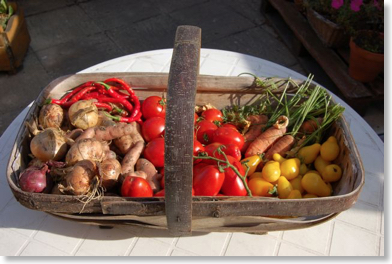
No doubt someone will ask why Colophon is quoting from the Book of Common Prayer, but "the kindly fruits of the earth" is an apt and beautiful phrase to describe the plentiful harvest we have enjoyed from our own garden and those of our friends. At the moment, the thought of food is still a little unwelcome to the community, but with that selfless determination characteristic of Benedictines, we thought we should enter into the spirit of World Food Day (a pity it didn't coincide with CAFOD Family Fast Day on 2 October) and spend a moment or two reflecting on how we share resources with others. We are usually quite good at sharing what we have in the way of facilities, food and drink, time and so on, but whether we always do so in a kindly manner is more debatable. It is possible to "perform an act of charity" in such a way that there is nothing "charitable" about it, especially when we're tired or harrassed or just plain out of sorts. Zeal is sometimes double-edged, and feelings of guilt, like feelings of shame, do not often lead to conversion of heart but rather trap us in negativity.
One area where we acknowledge that we ought to do more concerns those whose plight is largely ignored by the media. We have already commented on the persecution of Christians in various parts of the world. Just yesterday we received an appeal from Faith Without Fear concerning the 50,000 Christians forced from their homes in Orissa, India, last year. There are still 4,000 displaced and persecuted. We continue to hold them in prayer, but can we ask you to go to the Faith Without Fear web site and sign the petition? It is a small thing to do, but as we have been reminded many times during the progress of St Thérèse's relics, life is made up of small but significant acts. Perhaps our photo is worth a second look, too, as we think about the Orissa Christians. Some have predicted that in years to come shortages of food and water will lead to increasing strife among peoples. If we have not begun to learn to live peacefully with one another before then, how shall we celebrate the "kindly fruits of the earth" we are meant to share? Scroll down to comment.
M.P.s Expenses (Again)
Feeble Twitters
Mark's Gospel and the Mary Rose

There is a phrase in today's gospel (Mk 10. 17-30) which lies at the heart of every vocation: "Jesus looked steadily at him and loved him." It can be hard to bear another's gaze, especially "the beams of love". When we are not very happy about something we've done or feel uncertain about the reception we'll meet, we can be reluctant to meet someone's eyes. After eating from the Tree of the Knowledge of Good and Evil, Adam and Eve fled the Lord God in the Garden of Eden and we've been doing the same ever since. It's only when the Lord Jesus looks at us, long and steadily, that things are put right, that we recognize shame for what it is, a barrier we erect, and can open ourselves to grace. In the Old Testament God is sometimes likened to the refiner sitting by the fire, watching closely the process of purification. It can be painful as the dross is burned off, but the result is beautiful. I often wonder about that young man in the gospel. He went away sad, but did he experience a change of heart, remember the look the Lord gave him, and let go of his wealth in order to find his true treasure in Jesus? We don't know.
And the connection with the Mary Rose, Henry VIII's favourite ship, which went down in 1545 with the loss of 400 lives? Today is the anniversary of its being raised from the Solent in 1982. An examination of the teeth of some of the sailors whose bodies were recovered with the vessel revealed that many of them were Spanish, probably press-ganged into service after the wreck of their own ships in Cornwall six months earlier. One theory why the Mary Rose went down is that the crew had an imperfect command of English and did not understand what they were being asked to do to avoid being run down by the French. It takes time to learn a new language. As with the crew of the Mary Rose so with us, if we are not to make shipwreck of our lives, we need to tune into another language, the language of the Gospel. There is, however, an important difference. We have the assurance that the Lord has first looked at us and loved us — as we are, not as we might be. We are safe in his hands. (Podcast tomorrow, all being well.)
The Fun of Being Fickle
Psalms of the Passion
St Cecilia's Guild: Catalogue Posted
Lepanto, Our Lady, and Life
I know that our Hindu friends would be the first to distance themselves from the sentiments expressed on the Tamil Nadu Forum. They, like me, believe that respect for others is a fundamental principle and value the tradition of free speech we enjoy in the U.K. Above all, we share the belief that life is sacred, that it comes to us as a gift and is not to be insulted or mistreated, still less bludgeoned to death.
The language of invective is, of course, a constant in history: some of the insults bandied about in eighteenth century England, for example, would make ears burn today; and many a threat may be uttered in the heat of an argument that the speaker has no intention of carrying out. But I am still left wondering how it is that words which from a Christian would be actionable are somehow tolerable when expressed by someone who is not a Christian. Don't get me wrong, I am not asking for "special treatment" for Christians here or elsewhere, nor am I suggesting that the freedoms enjoyed by any religion should be curtailed. It would be dishonest not to admit that inequalities can be very striking — Christians in Saudi Arabia do not enjoy the freedoms that Muslims enjoy in Rome, for instance — but we have a duty to try to create a just and equitable society wherever we happen to live. Part of that duty must surely involve indicating the acceptable limits of the freedoms we take for granted. Words do matter: they can be a source of life or death.
Making God Laugh
Contentment
100 Million Bubbles
The Fourth Degree Again
How to Silence Nuns
St Michael the Archangel
Today's feast used to be extremely popular in the Midddle Ages. The Masses and prayers recorded in various sacramentaries testify to a rich liturgical observance, paralleled by a lively cluster of customs and traditions, from the Michaelmas goose (yummy) to Michaelmas fairs (fun) and Michaelmas rent-paying (depends whether paying or receivng, I suppose).
The old Catholic Encyclopedia neatly summarises the role of St Michael as
- To fight against Satan.
- To rescue the souls of the faithful from the power of the enemy, especially at the hour of death.
- To be the champion of God's people, the Jews in the Old Law, the Christians in the New Testament; therefore he was the patron of the Church, and of the orders of knights during the Middle Ages.
- To call away from earth and bring men's souls to judgment ("signifer S. Michael repraesentet eas in lucam sanctam", Offert. Miss Defunct. "Constituit eum principem super animas suscipiendas", Antiph. off. Cf. The Shepherd of Hermas, Book III, Similitude 8, Chapter 3).
Note that the first of these is to fight against Satan. One of the worrying trends many of us have come up against is the increase in occult activity which can have devastating consequences for those involved. Some are drawn in the first instance by sheer curiosity and have no inkling that they are playing with fire. At the risk of being labelled impossibly old-fashioned and credulous by those who prefer to laugh at the idea of evil, here is the prayer of Pope Leo XIII which John Paul II asked everyone "not to forget and to recite . . . to obtain help in the battle against the forces of darkness and against the spirit if this world" (Sunday, 24 April 1994).
Saint Michael the Archangel,
defend us in battle.
Be our protection against the wickedness and snares of the devil.
May God rebuke him, we humbly pray;
and do Thou, O Prince of the Heavenly Host —
by the Divine Power of God —
cast into hell, Satan and all the evil spirits,
who roam throughout the world seeking the ruin of souls.
Amen.
Scroll down to comment and please be patient while the comment box loads. You can edit the "Guest" tag to use your own name or nickname.
Desire
Saturday Mornings
The Proper Use of Speech and Silence
Obedience
Birdsong
Back to Earth (+ or - Bump)
People's Choice Award 2009
Premier Christian Media pioneered the concept of recognising and rewarding Christian bloggers and web site designers in the UK in 2007. Since then, the awards have continued to grow, reflecting the increasing range of Christian achievements in technology. You can read more about the various award categories and winners at http://www.christianblogawards.com/. You'll be as impressed as we were by the other entrants, whose sites really deserve a good look. We weren't at the award ceremony in St Stephen's Walbrook last night but were asked to make a short video of our acceptance speech. It had to be made on Tuesday morning, when the sun refused to shine. Happily, Oblate Mary was with us for a Quiet Day, bore cheerfully with the sound of nuns clambering up and down stairs looking for enough light to shoot a frame or two, and smilingly agreed to be filmed herself. You can view the rather shaky result below. Our best thanks to Premier and all who voted for us. Now we really must get on with that site make-over, get the blog comments working as they should and allow Internet Explorer users equal access to all features! The comment box will load after the video: please be patient as it will take a while.
Elementary, my dear Watson
The next section is positively deadly, it's all so demanding. Renounce oneself to follow Christ (v. 10)? That is the work of a lifetime, which may explain why monks and nuns seem to live so long (though the late Fr John Macauley attributed it to three meals a day and someone to look after you when you go ga-ga). Not to hug good things to oneself (v.12)? Ouch, easy to say, not always easy to do. Delight in fasting (v. 13)? Well, we'll see how that goes down today as the winter fast begins. Corporal works of mercy abound: there are many ways of relieving the poor and comforting others, though I hope I won't be called upon to bury the dead (v. 17). But perhaps I may be called upon to help someone lay to rest a quarrel from the past or free themselves from some bad memory, that would certainly be burying the dead. Finally, Benedict goes to the heart of the matter: prefer nothing to the love of Christ (v. 21). Yes, that is elementary, but in the sense of being a basic building-block of human life. It puts the distractions with which I began the day into some sort of order. I shall still be thinking about those things, but hopefully rather than with an interior grumble or two.
Today we end with a little tease. Tomorrow's blog may contain an announcement that will surprise you . . . Think RB 4.12. Scroll down to comment and please be patient while the comment box loads. You can edit the "Guest" tag to use your own name or nickname.
St Thérèse Relics
Our Lady of Sorrows
Exaltation of the Cross
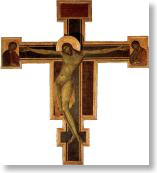
Ride and Stride
Anniversaries
Birthday of the B.V.M.
Digitalnun apologizes for her hasty condemnation of JS-Kit's commenting apparatus. A little research last night indicated that the main reason the blog page is not appearing correctly on all screens is because the dreaded Windows Internet Explorer is causing some of the code to scramble (sigh). The page actually appears better in some earlier versions of IE than the current one, so this is another problem that will have to be worked on. In the meantime, we recommend the use of Firefox which is a very fast, stable, cross-platform browser. By way of compensation, we are reintroducing the commenting option, but you'll have to scroll down the page to do so. The good news is that in October the site is to have a makeover, with some new content to look forward to and possibly a whole new look . . .
A Kitchen Makeover
The major change, of course, is in the kitchen. We usually try to redecorate most of it on a regular basis to keep the mould at bay, but for various reasons haven't been able to do so for the last couple of years. A number of fixtures and fittings were also beginning to look the worse for wear, so on Bank Holiday Monday we girded our loins and the makeover began. Had we videoed the process, we might have marketed it as a comedy!

Any Victorian house without a damp course is likely to have fungal problems, but the collapse of the doors on the kitchen units did not enhance the general appearance of the room. (And no, we had not been swinging from them.) We called in Chris Castle to help us with the eradication of the mould and putting a damp sealant on the walls. Initially, everything looked worse than ever. The dingy green bits looked quite striking against the dingy "white" bits!


Handynun wisely decided to leave cupboards and seals to the expert (Chris) and busied herself with more accessible problems; but one thing leads to another . . . and in places six coats of paint. However, the effort was worth it. The kitchen is lighter and brighter, and as the photos below show, it should be easier for us to maintain a more monastic atmosphere.

We are especially pleased that the gap round the window has at last been sealed and hope it will make the kitchen warmer in winter. Our grateful thanks to those whose generosity made it possible for us to undertake this, and to Chris who remained resolutely cheerful throughout ("mould can't hurt you" was his mantra).

There are a few finishing-off jobs to do, but essentially the kitchen is DONE (for now). It is no accident that this week's podcast also takes an "active" approach to Christian living. (The commenting option will be restored as soon as possible. If you have difficulty reading this post, please let us know.)
Foundation Anniversary 2009
An Anglican Evening
St Gregory, War and the U.S.A.
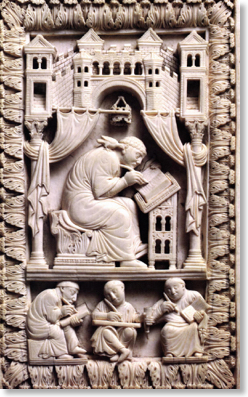
The Catholic Culture Library contains all Gregory's writings in English translation. King Alfred the Great wanted all the English clergy to read "The Pastoral Care". Get a taste of Gregory here: http://www.catholicculture.org/culture/library/fathers/ (link opens in new window).
This morning, however, I was thinking about two other anniversaries and pondering a connection with St Gregory that probably only exists in my mind. Today marks the anniversary of Britain's entry into the Second World War in 1939. The role of the papacy during that war continues to be debated. During the Lombard invasions of Italy, Gregory not only tried diplomacy to avert the worst horrors but emptied the papal treasury to help persecuted Jews, making him "the Father of the City [Rome], the joy of the world". Also on this day, but rather earlier, England accepted the independence of the United States of America. Gregory was very pragmatic man, and although the history of his dealings with the East is not "straightforward", he did much to ensure that Italy accepted the political realities of the day. In fact, the more I think about it, there was something very English about St Gregory. Perhaps that is why the English admire him so much. (The illustration is a tenth century ivory now in Vienna, showing St Gregory writing under the inspiration of the Holy Spirit — perched as a dove on his shoulder — with three monk scribes toiling underneath.) Scroll down to comment and please be patient while the comment box loads. You can edit the "Guest" tag to use your own name or nickname.
Early Morning
Slightly Mad?
Beheading of John the Baptist
An African Bishop

To move from the sublime-ish to the more mundane. The community has recently bought some new chasubles for use in the oratory. (This is instead of the new freezer we had been promising ourselves for the past year: good to see that even nuns believe in the jar of nard, isn't it?) Those who know our vestments will agree that Fr Bruno set a very high standard of design and finish in the chasubles he made for us but unfortunately they do not include all the colours needed for the liturgical year. Most of the commercial offerings we looked at were either hideous or expensive or both, and we felt we could not afford to commission anyone in Britain to make a vestment to order. Then we received a timely gift from a Friend and discovered a vestment maker in India who has produced three chasubles for us, including a gold one for solemnities. They are in the semi-Roman style currently favoured by Pope Benedict XVI, which means they hang beautifully, and have matching burses and chalice veils. They are not as stylish as Fr Bruno's, but they are dignified and serviceable. Next on the wish-list will be a black chasuble for 2 November and a small monstrance for Adoration. Is there no end to this amassing of ecclesiastical treasure?! Most communities, of course, start with the basic liturgical necessities already provided. We are building ours up little by little, and one of the lovely things about doing so is that nearly every item has a name and personal association attached to it. Something for our successors to cherish. Scroll down to comment as Digitalnun is prohibited from tampering until she has solved the problem with the white space.
One in Six
Doing the Impossible: RB 68
Digital Update
Ring of Fire
Summer's Lease
Difficult Decisions
Cloister Courtesies (RB 63 contd)
At the core of this section is Benedict's consideration of the abbot. He is believed to hold the place of Christ in the monastery and is therefore accorded a title and a reverence given to no other; but he is reminded, in no uncertain terms, that this reverence is not for himself but for his Lord and he must act accordingly. After mention of Christ Benedict passes on to the details of blessings given and received, of giving up one's seat to another (a rather unfashionable courtesy these days) and returns to one of his favourite scriptural texts, Romans 12.10. We must outdo one another in showing honour. The courtesies of the cloister are not remote from everyday life because they are concerned with how we express our recognition of other people's dignity and worth. I wonder how many people will think of giving up their seats on the Tube this morning. It's not wimpish, it's rather beautifully Benedictine. Scroll down to comment (comment box may take a moment or two to load).
RB 63 Community Rank
Wimple Wrinkles
St Maximilian Kolbe
Fox and Hound

Today’s chapter of RB (53: On the Offering of the Children of the Nobility and the Poor) tends to elicit lots of comments from guests, usually of the questioning rather than indignant variety. The point of the chapter is surely what it says about oblates (who today are always adults). The offering of self is expressed in written form and usually takes place within the liturgical action of the Mass, being closely associated with the offering of the bread and wine which will become the Eucharist. The oblate’s chart, like the nun’s chart of profession, is placed under the corporal: a reminder that the promises we make are made to God and are identified with the sacrificial offering of his Son. Oblation is a serious step in anyone’s life, and we are lucky here at Hendred to have a body of really admirable oblates and associates drawn from various ecclesial traditions. Happily, they all seem to like the resident hound, who is totally unmoved by the presence of foxes in the monastery garden.

The blog commenting system is still causing headaches. If you experience any difficulties, please get in touch. We are currently using JS-Kit's Echo, only released on 6 August, so teething problems are not surprising.
The Glorious Twelfth
Holy Poverty
Another White Rabbit Moment
Red in Tooth and Claw
Transfiguration 2009
Of course, for us now, there is another and darker aspect to today. Who can forget that 6 August is also the anniversary of Hiroshima? Light connects the two, though there is a world of difference between the divine illumination of the one and the diabolical glare of the other. The statistics of nuclear stockpiles make sobering reading. More sobering still is the knowledge that human beings have not learned the lessons of the last sixty-four years, that homo sapiens is only a whisker away from descending into homo vastans. We need a transfiguration of minds and hearts, something for which to pray today.
(Note for commenters: haven't quite got the comment engine working as it should but we will sometime in the next twenty-four hours, we hope.)
Oh happy day!
War and the Curé d'Ars
Sunday in the Monastery

New Blog Engine
Rights and Duties
Slavery Revisited
SS Martha, Mary and Lazarus
Almost there . . .
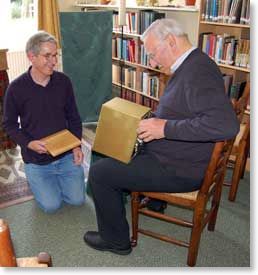




Grandparents
Excommunication: RB 44
Black Sheep, White Sheep
St Mary Magdalene
Tweaked!
Thought for Food (RB 39)
On the Old and the Very Young (RB 37)
BBC Oxford Feature
Swine 'Flu and the Kiss of Peace
Kitchen Service
Final Oblation
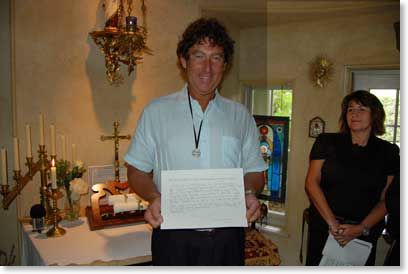
On the Feast of St Benedict Alexander made his final oblation. He is shown here displaying his chart which, just like the monastic profession of vows, is written out by the oblate in his/her own hand, signed on the altar and then laid there while Mass is celebrated. It is a powerful reminder that that we are the living stones of the Church, the true oblata which must be united with the offering of Christ himself. The medal that he is wearing is the medal of St Benedict. Those we give our oblates come from Monte Cassino, where we took care to have them blessed by an English abbot (local patriotism demanded as much). In case you are wondering, Saturday's oblation took place in Alexander's own chapel rather than the monastery oratory: he jetted back from Italy the night before so it was a case of catching him before he took flight again. Fortunately, not all our oblates have to travel quite so much! Today's podcast takes up the theme of what the oblate is and does. There are many ways of being Benedictine. Common to all is the humble, persevering search for God, following the teaching of St Benedict.
St Benedict's Day
What To Eat Now
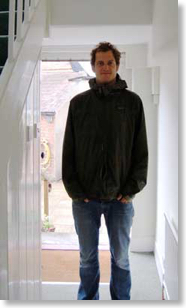
Printing and Prayer
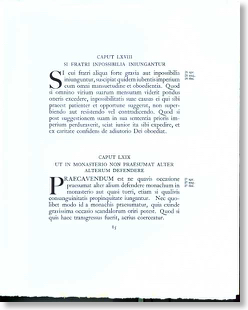
End of the Retreat
The Music of Shakespeare
Michael Jackson, R.I.P.
Three Feasts
Solstice
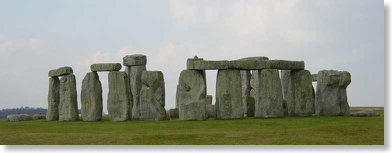
Early this morning, soon after the sun had risen, we were chanting that line from Psalm 71, "May his name be blessed for ever/ And endure like the sun." When I was younger, I used often to pass Stonehenge. Indeed, I am old enough to remember being able to go right up to the standing stones and touch them though sadly I never saw the midsummer sun rise over the plain (I did once manage the winter solstice, but that's not quite the same). Stonehenge, Avebury, and other ancient sites give one an impressive sense of the sun — one needs little imagination to understand the role it plays in many religions. But the sun in the psalms as an image of Israel's God-King has a peculiar brightness and warmth about it. The Shepherd of Israel shines from his cherubim throne and beams a blessing on all creation. Today is the day of the sun and of the Lord: let us rejoice and be glad in it.
A Small Anniversary
Year of the Priest
Green Shoots?
A Sleepless Night
Corpus Christi 2009
Deer
1. Deuteronomy 12:15
However, you may slaughter and eat meat within any of your towns, as much as you desire, according to the blessing of the LORD your God that he has given you. The unclean and the clean may eat of it, as of the gazelle and as of the deer.
Deuteronomy 12:14-16 (in Context) Deuteronomy 12 (Whole Chapter)
2. Deuteronomy 12:22
Just as the gazelle or the deer is eaten, so you may eat of it. The unclean and the clean alike may eat of it.
Deuteronomy 12:21-23 (in Context) Deuteronomy 12 (Whole Chapter)
3. Deuteronomy 14:5
the deer, the gazelle, the roebuck, the wild goat, the ibex, the antelope, and the mountain sheep.
Deuteronomy 14:4-6 (in Context) Deuteronomy 14 (Whole Chapter)
4. Deuteronomy 15:22
You shall eat it within your towns. The unclean and the clean alike may eat it, as though it were a gazelle or a deer.
Deuteronomy 15:21-23 (in Context) Deuteronomy 15 (Whole Chapter)
5. 2 Samuel 22:34
He made my feet like the feet of a deer and set me secure on the heights.
2 Samuel 22:33-35 (in Context) 2 Samuel 22 (Whole Chapter)
6. 1 Kings 4:23
ten fat oxen, and twenty pasture-fed cattle, a hundred sheep, besides deer, gazelles, roebucks, and fattened fowl.
1 Kings 4:22-24 (in Context) 1 Kings 4 (Whole Chapter)
7. Psalm 18:33 (liturgical psalter 17:34 you made my feet swift as the deer)
He made my feet like the feet of a deer and set me secure on the heights.
Psalm 18:32-34 (in Context) Psalm 18 (Whole Chapter)
8. Psalm 29:9 (liturgical psalter 28:9, though some translations refer to trees not deer!)
The voice of the LORD makes the deer give birth and strips the forests bare, and in his temple all cry, "Glory!"
Psalm 29:8-10 (in Context) Psalm 29 (Whole Chapter)
9. Psalm 42:1(liturgical psalter 41:2 lots of musical settings, some of them awful)
[ BOOK TWO ] [ Why Are You Cast Down, O My Soul? ] To the choirmaster. A Maskil of the Sons of Korah. As a deer pants for flowing streams, so longs my soul for you, O God.
Psalm 42:1-3 (in Context) Psalm 42 (Whole Chapter)
10. Proverbs 5:19
. . . a lovely deer, a graceful doe. Let her breasts fill you at all times with delight; be intoxicated always in her love.
Proverbs 5:18-20 (in Context) Proverbs 5 (Whole Chapter)
11. Isaiah 35:6
then shall the lame man leap like a deer, and the tongue of the dumb sing for joy. For waters break forth in the wilderness, and streams in the desert;
Isaiah 35:5-7 (in Context) Isaiah 35 (Whole Chapter)
12. Lamentations 1:6
From the daughter of Zion all her majesty has departed. Her princes have become like deer that find no pasture; they fled without strength before the pursuer.
Lamentations 1:5-7 (in Context) Lamentations 1 (Whole Chapter)
13. Habakkuk 3:19
GOD, the Lord, is my strength; he makes my feet like the deer’s; he makes me tread on the high places.
Habakkuk 3:18-19
Acid in a Young Girl's Face
Techie Note
Abuse and Conversion
Trinity Sunday 2009
St Boniface
Lessons from the Garden
Wilting Wimples
Of Valves and Vacuums
From Patristics to Pipes
Pentecost
My first abbess recommended that we should pray the sequence every day and it's easy to see why. The Holy Spirit is often effectively the "forgotten Person" of the Blessed Trinity but the sequence reminds us that the action of the Spirit forms the warp and woof of our existence. The Holy Spirit comes upon us as he came upon Mary and the apostles and indeed the Lord Jesus himself, to anoint us for our mission — which is nothing less than to complete the work of Christ on earth. Truly, the vocation of the Church is a great and glorious one and we need to pray if we are to accomplish it. (Apologies for the poor recording quality of this week's podcast: too much atmospheric noise.)
Pentecost Eve
Play Veni Creator Spiritius
Ps 50 (51)
Morning on the Downs
Mould
God's Little Joke
Disagreeing Agreeably
Sicut Pater
Stereotypes
Integrity in Public Life
St Matthias
Shopping in the Rain
Ask Sister!
The Abbots of Cluny

Evening
Listening to RB
The Gentiles will Listen
Vocationitis and the Children of God
"Vocationitis" is an affliction most NMs can spot a mile off. Most deal with it gently and patiently, knowing that it can mask a genuine vocation. What are its characteristics, and why do I call it an affliction? The big give-away is a concentration on self rather than God, and it gives its sufferer no rest. Don't get me wrong. It is normal for someone grappling with the mystery of vocation to be amazed and needing to talk about its effect in her life. There is a "divine restlessness" that takes hold of the soul. But there is a difference between that and dwelling on "me and my vocation story". Another characteristic is the endless quest for a perfect community which meets all a person's requirements for holiness/austerity/liturgical practice or what you will. Again, it is necessary to find the community to which one is called and that involves searching; but there are some who go from one community to another, year after year, and are never satisfied because there is always something that is not quite "right". The brethren are too austere/not austere enough, too traditional/not traditional enough, according to the enquirer's expectations. We try to help those with vocationitis, too, because as I never tire of repeating, each one of us is a vocation, uniquely called by God. Where we are/what we do matters less than that we are wholly given to God.
We often ask readers of Colophon to pray for those who are trying to discern a monastic vocation, which can be a lonely and baffling process. Today, however, we ask you to join us in praying for those who have vocationitis, that they may find peace and joy in their vocation as Children of God. It is a vocation we all share.
St Athanasius
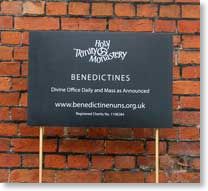
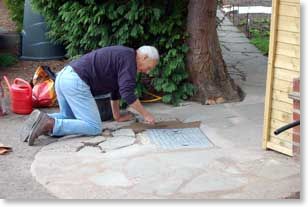
Ah, the Joys of Life!
Have No Fear
The post-Resurrection appearances of the Lord Jesus clearly had a disturbing element since he was quick to reassure his troubled disciples about his identity and purpose. While thinking about the latest announcement from the WHO this morning, I kept reverting to Jesus' appearance to Peter in John 21. Poor Peter, he was so scared by what might happen that he jumped into the sea to get away from his Lord. There will be some who will go to similarly extraordinary lengths to try to escape the 'flu virus. But the end of the gospel story is telling. Jesus shared breakfast with Peter, a very ordinary, human act, then won from him a three-fold affirmation of love. In return, Peter received no promise, no assurance that all would go well with him, only a job to do and a reminder that he too must submit to an experience of powerlessness. Like Peter, we have to get on with the ordinary business of life, our "breakfast on the seashore". We do not know what the future holds, but each of us has a job to do; and we know that the very hairs of our head have been numbered.
St George and England
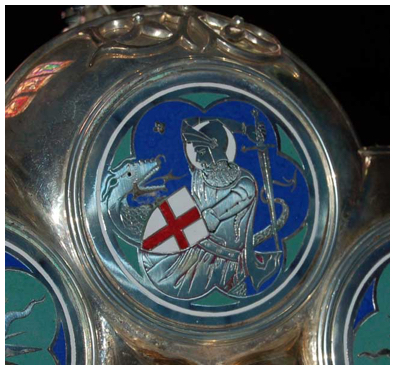
The Solemnity of St George is often treated with embarrassment by the English. Other nations rejoice in their patron saints, untroubled by the more fanciful elements in their vitae, but the English are too self-conscious, nowadays too serious, to make much of St George. (Yesterday's Budget will not have helped, of course.) True, the English flag will fly from hundreds of Anglican church towers (which makes a nice change from its usual place on the houses and cars of football fans) and the Society of St George will hold its customary dinner, graced by a lot of silver adorned with English roses; but it will be left to comparatively few to pray for the well-being of the English people and nation. What do we mean by praying for England and the English? We are surely not praying to become richer or more powerful or have some sort of international advantage over others. Rather, we are praying for Christian standards to inform our public and private lives, which is not inconsistent with Britain being a multi-cultural, multi-religious country. (I shall have lost our readers from overseas at this point, but essentially one can become British but has to be born English.) A truly Christian country would be a wonderful place in which to live whatever one's religious beliefs because charity, as St Paul says, is the one thing that can never hurt one's neighbour. The photo (see, we have listened!) shows a detail from a sanctuary lamp made when patriotism was less complicated and Catholicism more confident.
Snippets of News
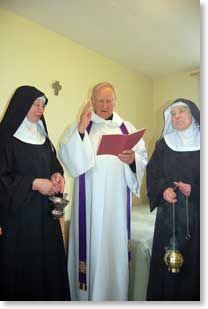
Feast of St Anselm
Easter Friday
Easter Monday
Easter Sunday 2009

Christ is risen! Alleluia, alleluia, alleluia.
O happy fault, O necessary sin of Adam, to have gained for us so great a Redeemer! (from the Exsultet or Easter Proclamation)
"So I saw in my dream, that just as Christian came up with the Cross, his burden loosed from his shoulders, and fell off his back, and began to tumble, and so continued to do, till it came to the mouth of the Sepulchre, where it fell in, and I saw it no more. Then was Christian glad and lightsome, and said with a merry heart, 'He hath given me rest by his sorrow, and life by His death.'" (John Bunyan, Pilgrim's Progress; Christian concludes by giving three leaps for joy and goes on his way singing . . .)
Our regular Prayer Podcast will be posted later on Easter Sunday/Monday.
Good Friday

"See, I have graven you on the palms of my hands" (Isaiah 49.16)
Christus factus est pro nobis obediens usque ad mortem, mortem autem crucis.
"Come on, my frend, my brother most entere!
For the I offered my blood in sacryfice." (John Lydgate, Vox ultima Crucis)
Maundy Thursday
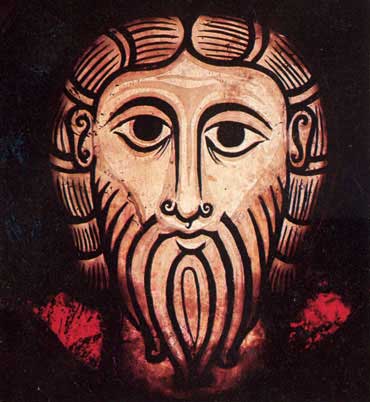
"Amen, amen, I say to you: one of you will betray me." (John 13. 21)
"Every one of my tears has been counted,
They are all of them written in your book" (Ps. 55[56]. 8)
"Lovely tear from lovely eye,
Why do you cause me woe?
Sorrowful tear from sorrowful eye,
You break my heart in two." (Medieval English Lyric)
Holy Week Begins
Humiliation
Joy and Sorrow
Thinking Aloud
The Glory of the Cross
Forgiveness
"The weak can never forgive. Forgiveness is the attribute of the strong." Gandhi
"No snowflake in an avalanche ever feels responsible." Voltaire
Media Obsessions
Gaudium Meum
Benedictine Forum 2
Benedictine Forum Launched
Three Josephs
Coat of Many Colours
Incense
Women's World Day of Prayer
Inch by Inch
Sunshine
Lenten Battles
In case you haven't seen any of the posters, our Lent Programme of Talks and Holy Hours for this year is as follows:
Wednesday, 4 March
2.30 p.m. Introduction to the English Mystical Tradition
7.30 p.m. to 8.30 p.m. Exposition followed by a short form of Compline (Night Prayer).
Wednesday, 11 March
2.30 p.m. Introduction to Walter Hilton
7.30 p.m. Introduction to Walter Hilton (repeated)
Wednesday, 18 March
7.30 p.m. to 8.30 p.m. Exposition followed by a short form of Compline (Night Prayer). Come and pray for vocations.
Wednesday, 25 March
2.30 p.m. Introduction to Julian of Norwich
7.30 p.m. Introduction to Julian of Norwich (repeated)
Wednesday 1 April
2.30 p.m. to 3.30 p.m. Exposition of the Blessed Sacrament.
7.30 p.m. Preparing for Holy Week (talk and discussion)
A Lenten Leap
Shrove Tuesday
St Polycarp
No Altar, No Bishop
A Suggestion for Lent
Dealing with Hurt
Sunday Evening
Superstition
Charles Darwin
The Liturgical Code
St Scholastica
A Quiet Week-End
A Lonely Place
Simple pleasures

Ordinary Time
Snowy silence
Amen
Seeds and St Thomas
Modern Asceticism
Prodigal Sons?
Change
Christian Unity Octave
Call of Samuel
A Lovely Gift
Sciatica stops play
St Cecilia's
Householder Joys
New Year 2009
Monkeys with Typewriters
Peace on Earth
St Thomas of Canterbury
Christmas Eve
O Rex Gentium
I am all at once what Christ is, since he was what I am, and
This Jack, joke, poor potsherd, patch, matchwood, immortal diamond,
Is immortal diamond.
O Clavis David
O Radix Jesse
O Sapientia
Generosity
Integrity
Gaudete Sunday
Conditor alme siderum
Silence
A Blinding Light
Comfort Food
The Immaculate Conception of Our Lady
Second Sunday of Advent
Pure Evil?
The Credit Crunch and Charity
The Web that is Woven
RB 51
RB 50
Terrorism
Contemplative Calm
Living with Debt
Gratitude v. Grumbling
The Kingship of Christ
Presentation of Our Lady
Wine Drinking
Lack of Inspiration
St Martin and Armistice Day
St Leo the Great
Remembrance Sunday
Tempting Fate
All Saints, All Souls
Eating Alone
Normal Sevice Resumes
ACSA Book launch
Vocation
Small Miracles
Of Laughter and Tears
Stanbrook Sale (Revised)
Words, Words, Words
Good Samaritans
St Thérèse of Lisieux
A Rag-Bag Post
Catholic Social Teaching Revisited
A Feast for the Eyes

Opening times: 11am-7pm, daily from 27 September to 7 October. Admission: Free. Venue: M. P. Birla Millennium Art Gallery, The Bhavan Centre, Institute of Indian Art and Culture, 4a Castletown Road, West Kensington, London W14 9HE. If you are in London in a few days' time, you can enjoy a feast of colour and drama in the paintings of three talented artists at the Bhavan Centre, details above. We enjoyed putting together the web site for Anjali D'Souza, so if you'd like to look at more of her work online, go to www.anjaliart.co.uk. As you can see, there's nothing gimmicky about our web site designs. We rely on content simply and straightforwardly presented. I think there's something inherently monastic about that kind of approach. Yes, of course we can do flash animations and so on if you want, but as we notoriously said to one client (who is now a great friend): "we ask you what you want, then tell you what you really want."
Never Refuse a Kindness
Sunday Morning
Technical Hitches
Of Virtue and Vice
Monday Afternoon
Revealing and Concealing
Hawks and Handsaws
FAQ
Foundation Day
St Gregory the Great and . . .
Future Developments
Stained Glass
Martyrdom of St John the Baptist
St Augustine of Hippo
Local Radio and Nuns
Nostalgia
". . . your servants love her very stones,
are moved with pity even for her dust." (Ps 101.15)
The psalmist was singing of Sion, remembered in exile as a place of holiness and beauty, but the sentiments are familiar to every adult. Nostalgia for what we have lost, for the land of childhood or the scenes of youth perhaps, afflicts everyone at some time or other (even cloistered nuns). This most adult of emotions need not be negative. It can inspire heroic effort or great art, lead to the achievement of something really worthwhile, be truly creative. My own thoughts often turn to the church at Stanbrook on a summer's evening, when the western sun shimmers and shines through the choir, illuminating the tabernacle with a shaft of bright light: a reminder that the Lord alone is unchanging. For as the psalmist also says, speaking of the heavens and the earth,
"They will perish but you will remain . . .
. . . you neither change nor have an end." (Ps 101. 27, 28)
The Depths of God
Custom Search Engine Added
Joyful in His House of Prayer
An Idle Thought
The Assumption of Our Lady
Questions and Answers
A Terrible Irony
Statistics, Sin and Psalmody
The still small voice
St Teresa Benedicta (Edith Stein) and a Birthday Party
St Dominic 08.08.08.
Digital Books and Electronic Printing
6 August 2008
New Telephone System
RB 53: Guests (again)
Sunday in the Monastery
RB 50
Homecoming
SS Mary, Martha and Lazarus
Reminder for a Busy Day
St Mary Magdalene
Drop, drop, slow tears
And bathe those beauteous feet
Which brought from heaven
The news and Prince of Peace;
Cease not, wet eyes,
His mercy to entreat;
To cry for vengeance
Sin doth never cease.
In your deep floods
Drown all my faults and fears;
Nor let His eye
See sin, but through my tears.
Vocation Trends
Two Cherries
InterFaith Dialogue
St Swithun and the Symbolic
Sunshine and Smiles
Grumbles and Gripes
Foundations
The Book of Job
Spam Attacks
D. Teresa Rodrigues
God of Surprises
The Morning After
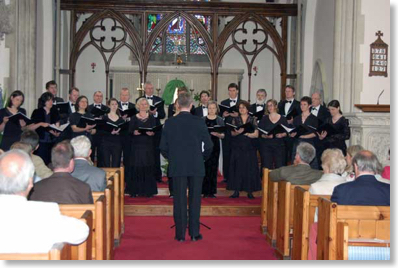
We are a trifle bleary-eyed this moning, but yesterday's concert must be considered a great success. Simon Whalley and Jubilate! gave a sparkling performance of works by modern American composers (including one of the finest renditions of Barber's Agnus Dei I've heard), ending with a delightful medley of old American Songs arranged by Copland and Simon Whalley himself. Afterwards we moved into the lovely gardens of Hendred House for wine and nibbles and there was much talk and quiet laughter until the shadows lengthened. The Friends truly excelled themselves in their attention to detail. As one member of the choir said, "I knew the moment I arrived and saw car-park marshalls that this was going to be good." Our sincere thanks to all. We'll put up a gallery of photos later today or tomorrow and post the financial results on the Friends' page once we've done all the sums.
Birthday of St John the Baptist
St Etheldreda and Holy English Nuns
Psalm 129 (130)
Rubbish
Guilt and Shame
Religious Art
Frazzled Nuns
Being Patient with God
Cold Calls and the Eleventh Step of Humility
Flights of Fancy

The last few days have been full of bird sightings: a barn owl at dusk, white wings glowing, as she took a mouse or vole back to her nest; a red-legged partridge sitting on a fence and obviously reluctant to move; and always there are the larks, pouring out their ecstatic song as they fly higher and higher (the photo was taken early this morning, in the interval between Vigils and Lauds). The beauty of the sky has entranced countless generations. Even in popular speech, we talk of "the heavens" and instinctively invest them with a more than natural significance. Astronomy, mathematics, chemistry — all are sciences that have led to a deeper sense of wonder. As the author of this week's podcast remarks, it was contemplating the beauty of the periodic table that first gave her intimations of God.
St Boniface
The Marvel of the Ordinary
The Fifth Degree
Trivial Pursuits
White Rabbit Moments
The Sacred Heart and the Cobbler's Children
Gutters
Rosa Mystica
St Augustine of Canterbury
Rain
Corpus Christi
Yellowhammers
Making God Laugh
SS Dunstan, Ethelwold and Oswald
Making Connections
A New Beginning
St Matthias
Ordinary Time
Morning

Early morning on the Ridgeway is always a delight, with the larks and lapwings, and hares loping across the fields. This morning we said part of Lauds there because the sudden heat has become a bit oppressive, and in any case, on Saturdays we generally go to Abingdon or one of the other local churches for Mass, so Vigils, Lauds and walking the dog all have to be completed before 7.30 a.m. No doubt the Ridgeway has been used for many and various religious purposes throughout the centuries, but it is good to know that we too can make it a place of prayer. The gift of prayer has been poured into our hearts along with the gift of God's love – something we celebrate in a special way at Pentecost.
Burma
Committees
Lambing
Ascension Sunday
New Servers
Birds in East Hendred
Patience Continued
Patience
Skylarks
An Emmaus Evening
RB 53: Guests
St Benedict's Day
Siskins
Easter Day
Holy Saturday
Good Friday
Maundy Thursday
Holy Tuesday
Palm Sunday
Some fruit from the tree of thy Passion
Fall on us this night.
Freedom from Fetters
RB 35: Kitchen Service
RB 33 and Private Ownership
Monday Morning
The Cellarer: RB 31. 1 –12
Greenhouse
St David
Spring
A Day of Recollection
My best thanks to the RCIA Group at Woodford Green who generously invited me to give them a Day of Recollection on Saturday. As always, one receives much more than one gives and I am still pondering some of the questions asked and the insights shared. One of the joys of the day was being with people who have come to Catholicism via many different routes and who have such a sense of the great treasure offered them that they are prepared to make huge sacrifices. It was truly humbling. The (delayed) Prayer Podcast takes up one of the big questions that the group raised.
Chair of St Peter
A feast of the unity of the Church and a reminder that the first of the four conditions for an infallible papal utterance is that he should be speaking ex cathedra, from the chair, i.e. in his official capacity as pope. The Anglo-Saxons had a special devotion to St Peter and his successors: one thinks of all those Anglo-Saxon kings making pilgrimages to the tombs of the apostles, or Benet Biscop bringing back treasures from Rome, including John the Cantor, to beautify English church worship. Certainly, in Rome one does get a sense of unbroken tradition, of Romanitas and catholicity, and here and there, in the quiet of Sta Sabina perhaps, or one of the other less-visited basilicas, an intimation of a reality which surpasses all the "smoke and the noise and grandeur of Rome" itself.
Despair
More suicides are committed in February than in any other month, apparently. In Britain the number of young people committing suicide is beginning to trouble the media as well as families and friends. If one has not oneself experienced despair, it is impossible to understand the depths of misery and loneliness that could prompt the taking of one's own life. We often underestimate the significance of covert appeals for help. If anyone were to say he/she was feeling suicidal, we would all assure them that things must eventually get better; but the sad fact is, most suicides do not announce their intention beforehand, nor do they believe in the possibility of things improving. Cain doubtingly asked God if he was his brother's keeper. Probably most of us feel that in some sense we are responsible for others. To use a fashionable phrase, we all have a duty of care. Maybe the man who acts like the life and soul of the party is in desperate need of someone reaching out to him; maybe the woman with the carefree laugh is weighed down with terrors we know nothing of; maybe the child who looks so "normal" we scarcely notice needs someone to look again. Looking again is something God does all the time.
Technonuns and Technical Glitches
Yesterday was busy, busy, busy, even for life in the monastery. Some things, however, had to be done, like putting a new hard disk inside an elderly computer (a Mac, so no problems there) and a few overdue changes to the web site (no time for all of them, of course). Whenever we tackle some of these "pending jobs", it seems a host of others follow in their train. We rarely use the dishwasher except when we have groups in, and naturally, because we have several groups in over the next few weeks, the dishwasher has decided to die. I was trying to repair the door of a kitchen cabinet the other week when a second fell off. Should we put away the toolbox, I wonder. Fixing things is apparently not for us.
Transfiguration
The Lenten Sunday Mass readings form an excellent baptismal catechesis. Last Sunday we were with Jesus in the wilderness, struggling with temptations of body and mind; this Sunday we shall be on the mountain of Transfiguration, glimpsing something of the glory that one day will be ours. It is a strange and startling transition but one we must take seriously. This week's podcast comes both in audio form as usual or in video (rather homespun video, alas). The audio quality is not up to scratch but we hope it soon will be.
A Wounded Buzzard
A sad sight yesterday as we walked along the Ridgeway: a wounded buzzard, flying limpingly from bush to bush. We could not quite see what was wrong, but the bird was apparently in distress and we were powerless to help. A reminder, if we needed one, of the fragility of every living being.
SS Cyril and Methodius vs St Valentine
There is no doubt about it, more people will be celebrating St Valentine today than St Cyril and St Methodius. Sales of red roses, chocolates and champagne will soar while the religiously inclined will be left feeling like bubble-busters as they keep their Lenten fast and ponder the saintly brothers' work for Church Slavonic and the liturgy — so dull by comparison. For the Church's calendar to be so out of step with contemporary culture is a modern phenomenon. Many of the earliest liturgical commemorations were of pagan festivals Christianized, just as many Christian holy places were built on the site of pagan ones. Gregory the Great's advice to Augustine of Canterbury was typical: do not destroy the shrines of the Angles but make them Christian. Can we make Valentine's Day a little more Christian without making it dull? Donne springs to mind.
The Lord's Prayer: Mt 6. 7–15
The words which introduce and conclude the giving of this prayer in today's gospel constitute in themselves a little treatise on the nature of prayer, just as the Lord's Prayer itself is a pattern for all Christian prayer. We are reminded that we do not neeed words: our Father knows our needs even before we can put them into words; what he looks for in us is a heart ready to give and receive forgiveness. We worry that God will not hear us, which is why we multiply our babblings. Instead, we need to worry whether we will hear him, whether we will be ready to be a channel of his love and forgiveness, the miracle of being a forgiven sinner.
In Praise of the CWL
The Wantage branch of the Catholic Women's League met here on Saturday for a Day of Recollection. What a treasure the Church has in women such as these: lively, intelligent, compassionate. Sadly, the CWL does seem to have something of an image problem today, which is a pity because a lot of women are missing out on something really good — and so are those parishes where the work of the League is equated with the production of endless cups of tea. The Wantage branch are certainly not walk-overs and draw their membership from a wide range of ages and occupations. After Mass, talks and discussion ranged from Newman and his ideas of doctrinal development to Summorum Pontificum and the ways in which liturgy engages hearts and minds — or fails to. But what always strikes us is the generosity and kindness the members show both to one another and to us. We may have been the hosts in theory, but we learn every time the CWL comes what it is to be treated "tamquam Christus", as though we were Christ.
First Sunday of Lent
Saturdays
The Eleventh Degree: RB 7. 60–1
Shrove Tuesday
 I suppose it is the last remnant of the idea of a feast preceding the Lenten fast. Meanwhile, we can digest the unsurprising news that there has been a steep decline in the numbers of monks and nuns, Sisters and Brothers. Perhaps we need to ask ourselves whether we have not made religion dreary and uninteresting, entirely lacking in challenge. I don't think that is true of the monastery here, but not everyone can cope with the kind of challenge a new foundation presents. Finally, by request, a photo of Duncan the monastery dog, cheerfully untroubled by sober thoughts.
I suppose it is the last remnant of the idea of a feast preceding the Lenten fast. Meanwhile, we can digest the unsurprising news that there has been a steep decline in the numbers of monks and nuns, Sisters and Brothers. Perhaps we need to ask ourselves whether we have not made religion dreary and uninteresting, entirely lacking in challenge. I don't think that is true of the monastery here, but not everyone can cope with the kind of challenge a new foundation presents. Finally, by request, a photo of Duncan the monastery dog, cheerfully untroubled by sober thoughts.The Psalter
Contentment: R.B. 7: 49–50
Presentation of the Lord & Domini Canis
The Fourth Degree
Wind
Prayerline
The Wedding Feast of Cana
Friday Thoughts
Deer in the Garden
Cheerfulness: RB 5. 14 — 19
St Agnes
Christian Unity
Tools of Good Works
St Anthony
Sunshine
Flexibility: RB 2. 23–32
Feast of the Baptism of Christ
 The Baptism of Christ is the last of the Christmas feasts (although we shall have one last look back at Christmas on Candlemas Day). It reminds us of Our Lord's mission, the purpose for which he was born. One of the Fathers of the Church remarks that all the waters of the earth were made holy on this day — something we in the northern hemisphere often forget because we seem to have so much water at times. It is a day for remembering what a gift was conferred on us at our own baptism and giving thanks.
The Baptism of Christ is the last of the Christmas feasts (although we shall have one last look back at Christmas on Candlemas Day). It reminds us of Our Lord's mission, the purpose for which he was born. One of the Fathers of the Church remarks that all the waters of the earth were made holy on this day — something we in the northern hemisphere often forget because we seem to have so much water at times. It is a day for remembering what a gift was conferred on us at our own baptism and giving thanks. Favouritism: RB 2. 16–22
Word and Deed: RB 2. 11–15
The Abbot: RB 2. 1-10
The Deserving Poor
Epiphany
Self-Forgetfulness
New Potatoes
New Year Resolutions
New Year
 For many people, Christmas is over with the turkey and plum pudding on Christmas Day itself. For Christians, however, Christmas extends, first to the Octave (1 January) then to Epiphany (Twelfth Night), and only really comes to an end with the Presentation (2 February). So, the old year gives way to the new not just in the middle of the Christmas festivities, but very near their beginning. 1 January has always been linked to the Lord's birth, through the old feasts of the Circumcision or the Holy Name and, now again, the Solemnity of Mary the Mother of God. It is good to begin the year with a reaffirmation of God's involvement in human history, a reminder that his plans for us are for weal not woe.
For many people, Christmas is over with the turkey and plum pudding on Christmas Day itself. For Christians, however, Christmas extends, first to the Octave (1 January) then to Epiphany (Twelfth Night), and only really comes to an end with the Presentation (2 February). So, the old year gives way to the new not just in the middle of the Christmas festivities, but very near their beginning. 1 January has always been linked to the Lord's birth, through the old feasts of the Circumcision or the Holy Name and, now again, the Solemnity of Mary the Mother of God. It is good to begin the year with a reaffirmation of God's involvement in human history, a reminder that his plans for us are for weal not woe.Holy Family
Holy Innocents
Christmas Day
This is the month, and this the happy morn
Wherein the Son of Heav'n's eternal King,
Of wedded Maid, and Virgin Mother born,
Our great redemption from above did bring . . .
Milton's Ode on the Morning of Christ's Nativity conveys something of the majesty of Christ's birth (and, incidentally, contains one of the most magical lines ever penned, "While Birds of Calm sit brooding on the charmed wave"); but we must look to the kitsch that adorns many of our churches and the tangle of wrapping paper and ribbon spilling out of millions of homes to understand the more human side of this tremendous mystery. God is involved in every aspect of our lives: the joys, the sorrows, the struggles and the triumphs. Since his birth at Bethlehem, He has become one with us, one might almost say, one of us. The even greater wonder is that we have become one with Him. Happy Christmas, everyone!
Christmas Eve
O Emmanuel
O Rex Gentium
O Oriens
O Clavis David
 O Key of David, and Sceptre of the House of Israel, who open and no one shuts: come and free those sitting in darkness and the shadow of death. The O antiphon recalls both Isaiah 22 (the key of the house of David) and Isaiah 9 (a child is born to us, a son is given to us, and government is upon his shoulder) while monastic tradition associates this day with the Gospel of the Annunciation. It is customary for the superior to give a talk on the Annunciation gospel, always called the Missus Est (from the Latin missus est angelus Gabriel a Deo, the angel Gabriel was sent from God). The finest of all Missus Est sermons are by St Bernard, but today, in every Benedictine monastery throughout the world, a monk or nun will be trying to say something about that moment of unequalled faith when Mary consented to be the mother of Jesus, and in so doing became the Mother of God. Surely there is a lesson there for us, too. God can transform our trifling acts of love and surrender into something that exceeds all our hopes and imaginings, if only we let him. (To listen to today's antiphon, go to the Prayer Box on the Vocation page and use the drop-down menu. Recording by courtesy of Fr Jim Tucker and the North American College.)
O Key of David, and Sceptre of the House of Israel, who open and no one shuts: come and free those sitting in darkness and the shadow of death. The O antiphon recalls both Isaiah 22 (the key of the house of David) and Isaiah 9 (a child is born to us, a son is given to us, and government is upon his shoulder) while monastic tradition associates this day with the Gospel of the Annunciation. It is customary for the superior to give a talk on the Annunciation gospel, always called the Missus Est (from the Latin missus est angelus Gabriel a Deo, the angel Gabriel was sent from God). The finest of all Missus Est sermons are by St Bernard, but today, in every Benedictine monastery throughout the world, a monk or nun will be trying to say something about that moment of unequalled faith when Mary consented to be the mother of Jesus, and in so doing became the Mother of God. Surely there is a lesson there for us, too. God can transform our trifling acts of love and surrender into something that exceeds all our hopes and imaginings, if only we let him. (To listen to today's antiphon, go to the Prayer Box on the Vocation page and use the drop-down menu. Recording by courtesy of Fr Jim Tucker and the North American College.)O Radix Jesse
A winter rose shall flower
On Jesse's ancient stem:
The word of God unfolding
Before the eyes of men.
(To listen to today's antiphon, go to the Prayer Box on the Vocation page and use the drop-down menu. Recording by courtesy of Fr Jim Tucker and the North American College.)
O Adonai
The "O" Antiphons
Gaudete
RB 59 and RB 60
Ruined Reputations?
Belonging
Of Nuns and Nibblers
RB 57 Work and Prayer
The Immaculate Conception
RB Chapter 54
Guests
The Last Day . . .
St Andrew
Bells
The End of the Year
Podcast
A Wren
Catholic National Library
What's in a name?
The Expectations of Others
The Importance of Listening
A New Look
Feast of All Benedictine Saints
Remembrance Sunday
Mid-November Feasts
Charitable Searching & Shopping
A Buried Past
 The south aisle of St Augustine's church is currently being replastered. Stripping way the old plaster revealed a blocked up window west of the entrance to the Eyston chapel. In this photo you can see traces of the original wall painting, which is probably fifteenth century. On Friday it will be covered up again, so here is a precious glimpse of something not seen for centuries, and not likely to be seen again for a few centuries more. Only a small detail, and nothing to get an art historian excited, but nice to have all the same. Was the painter a village craftsman whose body lies in the graveyard outide, or was he a travelling craftsman from further afield. Who knows? The anonymous nature of so much of our heritage is something that appeals to me.
The south aisle of St Augustine's church is currently being replastered. Stripping way the old plaster revealed a blocked up window west of the entrance to the Eyston chapel. In this photo you can see traces of the original wall painting, which is probably fifteenth century. On Friday it will be covered up again, so here is a precious glimpse of something not seen for centuries, and not likely to be seen again for a few centuries more. Only a small detail, and nothing to get an art historian excited, but nice to have all the same. Was the painter a village craftsman whose body lies in the graveyard outide, or was he a travelling craftsman from further afield. Who knows? The anonymous nature of so much of our heritage is something that appeals to me.Torch Trust
Gunpowder Plot Politics
Excommunication
All Souls
The Best Laid Plans
Snap, Crackle and Pop
The Afternoon Walk
St Luke's Summer
Normal Service Resumes (almost)
Death of a Mac
Quinces
The Frankfurt Book Fair
God's Sense of Humour
Autumn
St Bruno
Of Doms and Dames
St Francis

St Francis must be one of the best-loved saints. There is something immensely attractive about his joyful embrace of poverty, his delight in natural beauty, his engaging simplicity of manner. But there is another side to Francis that comparatively few dwell on: the Francis of the stigmata, the mystic. Holiness is never one-sided. It is we who are not holy who try to reduce it to terms that we can grasp or feel comfortable with. I suspect that St Francis was not always easy to be with. His Master is not always easy to be with, either.
Guardian Angels
St Thérèse of Lisieux
Microphones
Michaelmas
Care of the Sick
Drains II
Hero Worship
Country Wines
Truth and Lies
"Falsehood they speak one to another,
with lying lips, with a false heart."
and in the section of the Rule for today, its antidote, being truth-full:
"Speak the truth, heart and tongue."
Benedict reverses the expected order of things: a pure heart will utter pure speech; whereas a lie masks the darkness in the heart of the deceiver. Reveal or conceal? It is worth pondering how we use words today.
Drains
Sheep and Drachmas
Our Lady of Sorrows
True Freedom
An Unusual Week-End
Our Lady's Birthday
Tidying Cupboards
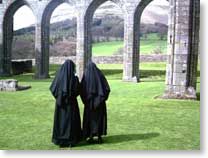
The digital equivalent of tidying one's cupboards often reveals forgotten treasures like this photo of two monastic pilgrims surveying the ruins at Llanthony. Just add the sound of sheep and the smell of warm earth!
Foundation Day
Listening to the Rule
A Bird on the Wing
End of the Retreat
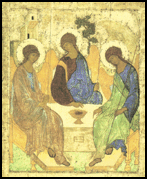
It has been a good week to be in retreat, with so many people and needs to pray for; good also to be able to reflect a little more deeply on the mysteries of Christ and the way in which they are woven into our lives. The Divine Compassion always stoops to our need, but it can be difficult to believe that when such horrors as the Barron case or the Beslan Siege come to mind or even our own sins and shabby accommodations. However, as St Benedict reminds us in the very last Tool of Good Works, we must never despair of God's mercy. Our confidence and expectation must be alike high because we depend on God, not on ourselves.
Mother Teresa of Calcutta
Journey's End
Contrasts
Grasshoppers
Seek His face
Dedication of the Church
Feast and Fast

One of the things the Catholic Church understands so well is the need for light and shade, feast and fast. Tomorrow we celebrate Our Lady's Assumption, which will be a feast in the refectory as well as the oratory; so it is appropriate that today everything is a little low-key, in culinary as well as liturgical terms. We are invited to "taste and see that the Lord is good" as the psalmist says, and it is better if our taste-buds have not become jaded.
A Doggy Tale
Mary the Mother of the Church
On Working Too Hard
St Teresa Benedicta of the Cross
St Dominic and the Web
Beauty in a Beanflower

Funny how things we take for granted can suddenly surprise by their beauty — the humble beanflower is a case in point. This would be an excellent day to look with fresh eyes at everyone and everything around us. Recognizing the beauty/good in others has a good effect on us, too.
St John Vianney
Unanswered Prayer
Garden Party Photos
St Ignatius and IT
Sabbath
Dies Non
A Parish Web Site
Twiddling as Homes Flood
Martha and Mary
Printer at Play
Crack and sometimes break, under the burden,
Under the tension, slip, slide, perish,
Decay with imprecision, will not stay in place,
Will not stay still."
Thus, Eliot. No one who worships Jesus as Logos can be indifferent to words; and no one who cares about words can be completely indifferent to the letterforms of which words are made. So here is the monastic printer's doodle of the day. (If you like it, please respect the copyright as I might make a poster/card of it one day.)

Ethical Trading
The Good Samaritan
The Trivial and the Tremendous
St Benedict's Eve
07.07.07
God and Mammon
In a Monastery Garden
The Grace of Tolerance
Challoner's Chapel
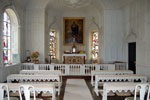
Mass this evening at Milton, where we provided the Schola. The chapel is probably the oldest post-Reformation Catholic chapel still in use and has a lovely atmosphere. Good glass from Steventon, and some surprising panels depicting the legend of St Julian; contemporary candlesticks and altar furnishings (how did they survive the Victorian era unscathed, to say nothing of the destructiveness of more recent times) and the chance to see Challoner's vestments in use rather than preserved behind glass.
Of Podcasting and Patience
SS Peter and Paul, App
Audio Books
Wet Mondays
St John the Baptist
As John the Baptist leaped for joy
Within his mother's womb,
So Joy himself at Eastertide
Dánced from the empty tomb.
The burning and the shining lamp
Which all rejoiced to see
Was but a pointer to the Son,
Glád in his shade to be…
We had quite a big group here yesterday and were struck by the honesty and generosity with which the members seek to face up to the "messiness" of life – wounds from the past, uncertainties about the future, difficulties of so many kinds. Trust in God is the key. Perhaps that is why we felt a spirit of joy fill the house. St John the Baptist must have been praying for us.
Holy English Nuns
Oscott College
A Morning Walk
Elderflower Champagne
- 50 heads of elderflowers
- 6lb sugar
- 11 tablespoons of white wine vinegar
- 11 large lemons
- 40 pints of cold water
Nov 2010
Oct 2010
Sep 2010
Aug 2010
Jul 2010
Jun 2010
May 2010
Apr 2010
Mar 2010
Feb 2010
Jan 2010
Dec 2009
Nov 2009
Oct 2009
Sep 2009
Aug 2009
Jul 2009
Jun 2009
May 2009
Apr 2009
Mar 2009
Feb 2009
Jan 2009
Dec 2008
Nov 2008
Oct 2008
Sep 2008
Aug 2008
Jul 2008
Jun 2008
May 2008
Apr 2008
Mar 2008
Feb 2008
Jan 2008
Dec 2007
Nov 2007
Oct 2007
Sep 2007
Aug 2007
Jul 2007
Jun 2007

